UTHE UBYSSEY
Taking it sleazy at Goosehunt
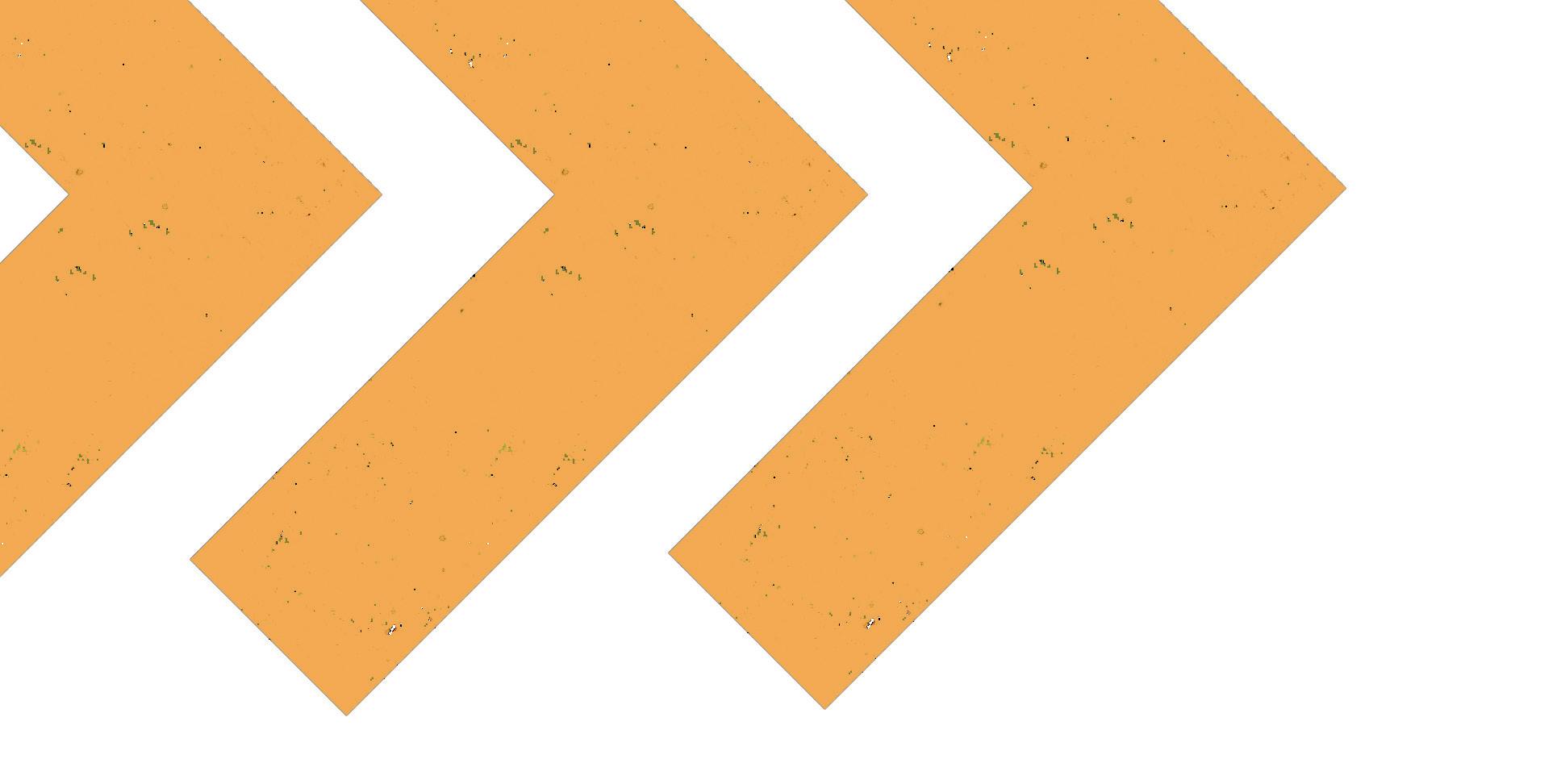
How clean are UBC’s partnerships?
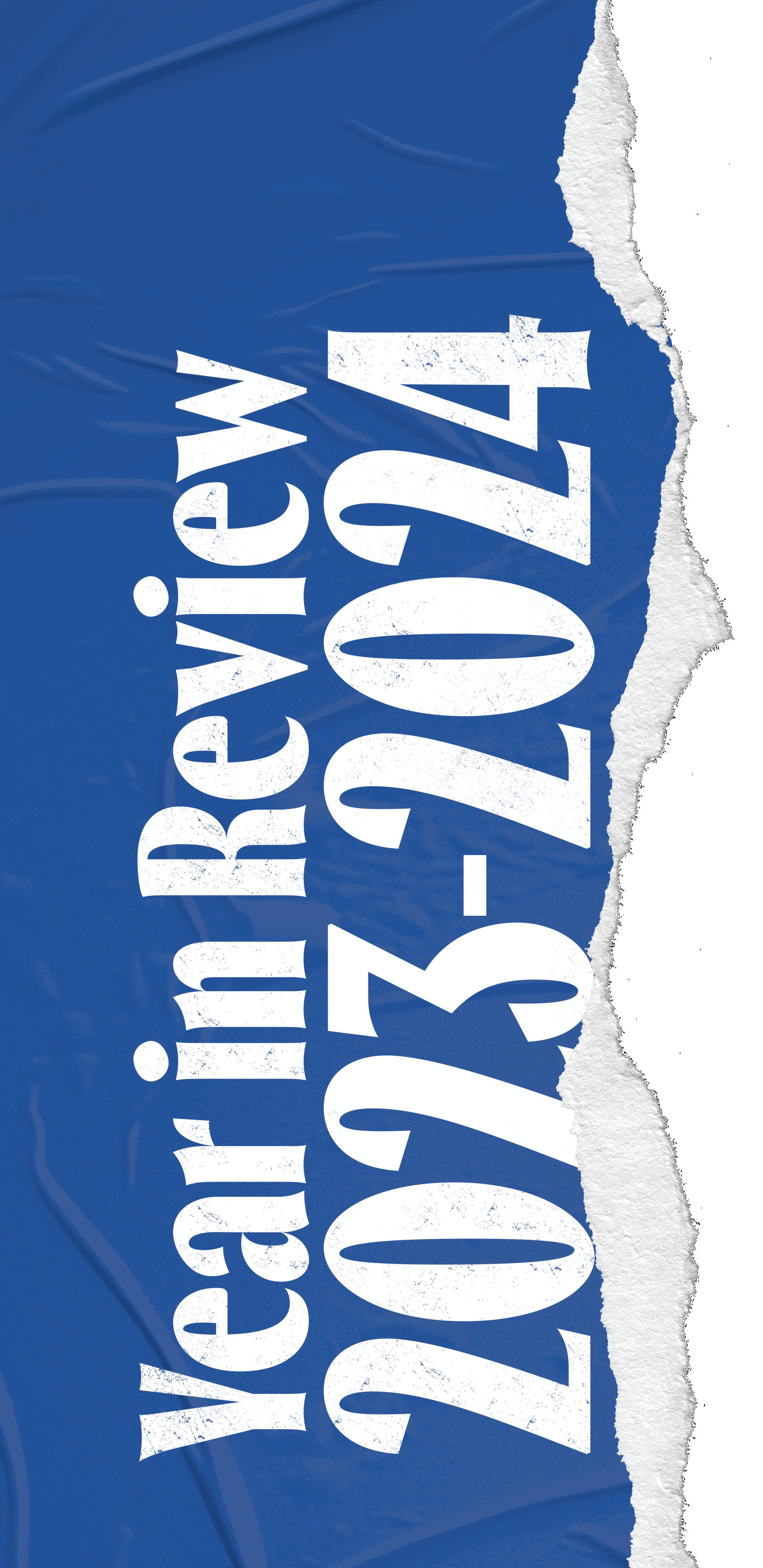
T-Bird year-end performance reviews
Mapping birdsong in Vancouver
Things to worry about instead of finals
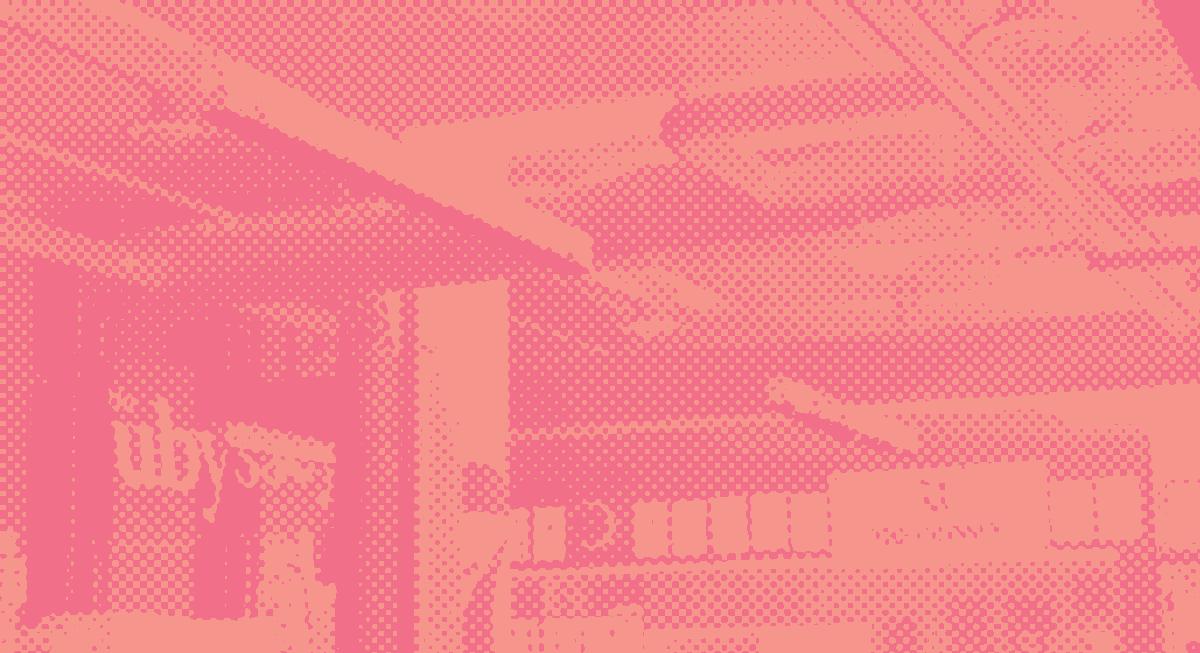

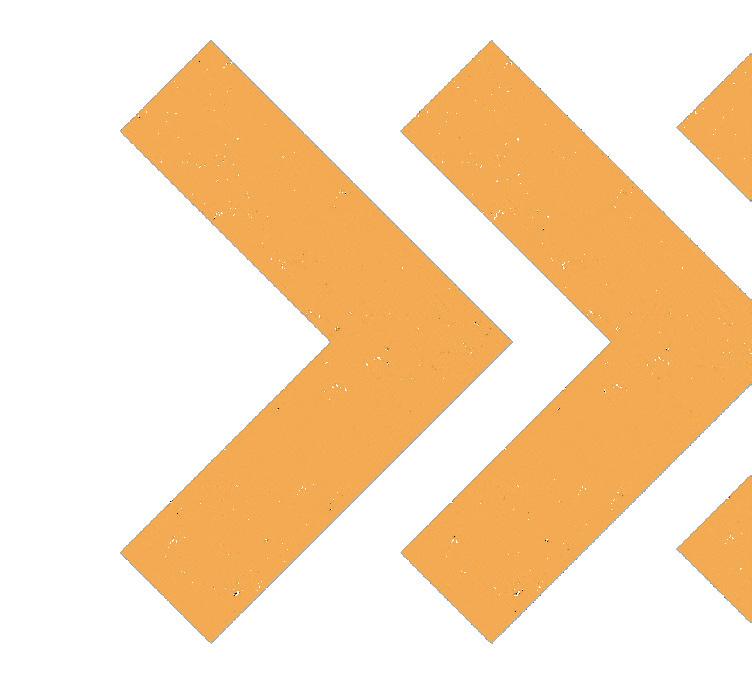



FEATURES
Child-sized, critical steps //6-7

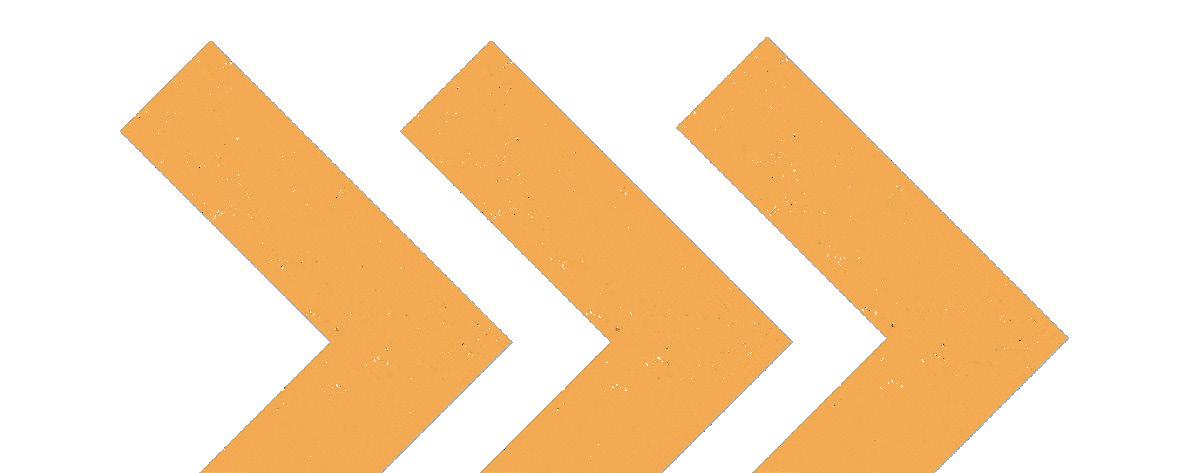
05 CULTURE APRIL 9, 2024 | VOLUME CV | ISSUE XVII THANKS, FREAK SINCE 1918 21 19 20 HUMOUR SPORTS SCIENCE 18
OPINION
UAnnaliese Gumboc, Anushka Bellani, Bea Lehmann, Bernice Wong, Bessie Guo, Caleb Peterson, Cynthia Wang, Elita Menezes, Emilija Vītols Harrison, Fiona Sjaus, Gabby Ranu, Gloria Klein, Harry Sadleir, Himanaya Bajaj, Ian Cooper, Ian French, Isabella Ma, Jerry Wong, Julian Forst, Kyla Flynn, Mahin E Alam, Manya Malhotra, Marie Erikson, Maya Rochon, Micah Sébastien Zhang, Morris Hayes, Nathan Bawaan, Nicola Roscuata, Olivia Vos, Sam Low, Saumya Kamra, Siyah Basi, Stella Griffin, Trinity Sala, Vicky Nguyen, Zobia Alam, Zoe Wagner
EUS President Karisma Jutla loves engineering, mentorship and red sunnies

“It’s a fun full circle moment,” said Jutla about being EUS president.
Iman
Janmohamed Features Editor
The sun streams in through the windows of the Engineering Student Centre, illuminating Karisma Jutla, her heart-shaped red sunglasses and her red — the (in) famous engineering varsity jacket — which is covered in just about every patch you can get.
If she were to put it on, her ‘chief’ patch, which is worn by the current EUS president, would lay over her heart.
Backlit by the sun, the writing on her windows from volunteers who’ve visited her office lights up like neon lights. The walls are decorated with pink butterflies and posters, and a small sparkly pink cowboy hat sits in the corner of her office in front of stacks of red solo cups.
“It didn’t always look like this,” Jutla laughs.
Despite spending her entire degree involved in all things EUS, from red sales to reopening the undergraduate society’s low-cost food outlet, The Eatery, Jutla didn’t initially want to become an engineer.
“I went through all of high school wanting to actually be a physicist … I really liked space,” said Jutla, a sixth-year materials engineering student with a specialization in aerospace engineering.
“I realized I didn’t want to be a professor, and that was kind of the only real option for physics.”

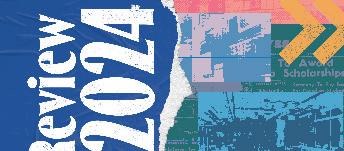
Her interest in engineering sparked while attending UBC engineering outreach programs for girls. Standing in a room filled with PVC pipe and hot glue guns, Jutla was tasked with making a craft that keeps an egg from breaking when it’s dropped from up high.
“I really liked the fact that I was working with other people, especially with other girls,” said Jutla.
According to a 2019 Statistics Canada report, women in engineering made up 24 per cent of all applied science graduates nationwide.
In 2015, the Faculty of Applied
Science committed to increase female enrolment to 50 per cent by 2020. But current enrolment remains under the faculty’s 2020 goal with around 34.5 per cent of engineering undergraduate students identifying as women in 2023.
Jutla is trying to change this.
She follows a history of women presidents — in the past 10 years, most EUS presidents have been women — and she said she was ushered into the EUS by other women executives before she got involved.
While studying for finals in the Engineering Student Centre, one of the women executives told her they created a new role — and that she’d be perfect for it.
“I don’t know how true that was, but it was a great recruitment tool because I was like, ‘Oh my god! A VP wants me.’”
This led to Jutla working as the EUS’s events and social media manager. And later that year, the same executive that told her about that new role encouraged her to run for the EUS executive.
After two years as an EUS executive (and after being part of the team that won AMS Constituency of the Year), Jutla decided she was ready to become president.
“I feel like after all that time you have the knowledge and the ability,” said Jutla. “You kind of look around, and you want to be able to help people who were in the spot you were in.”
But being supported and mentored by women in engineering hasn’t always been easy.
“There’s talks I had as I became an executive ... like, ‘Okay, there’s like a slightly different way you’re gonna carry yourself to be a woman who’s in charge,’” said Jutla.
The EUS has become Jutla’s family on campus, and she emphasized how special UBC’s engineering community is.
“I think the engineering spirit is something that exists very uniquely on this campus,” said Jutla. “I’ve had the opportunity to meet the presidents of almost every other
engineering school in Canada and [they say] ‘The shit you guys do at UBC is like insane, like, what’s going on?’”
Jutla has also mentored others as she once was.
“I think there’s a lot of value in someone you look up to telling you they think you’ll be good for the role,” said Jutla. “It’s gotten me to take steps in the EUS I may have not had the confidence to do.”
Jutla can see graduation on the horizon as her time in the EUS comes to a close.
“I’m excited to be an engineer, honestly. I think it’s going to be a totally new challenge,” said Jutla. “I’m really excited to go out there and meet older women in the industry and make those relationships, find mentors.”
Although her time at UBC is coming to an end, Jutla remembers her first year Imagine Day like it was yesterday.
Then-EUS President Kate Burnham was giving a speech to firstyear engineering students.
“I’m a sixth-year geological engineer, and you’re all gonna think that’s crazy, but you won’t in six years,” said Burnham according to Jutla.
At the time, Jutla thought she’d finish her degree in four years, something she now laughs about — “the average engineering student does not take four years. It’s a six year degree, usually five and a half.”
But seeing Burnham and other EUS executives commit so hard to being engineers, Jutla knew she made the right decision going into engineering.
“I remember just showing up and seeing them all in their matching coveralls and people just running around covered with cairns all over their face and so excited,” said Jutla. “And I was like, ‘Wow, like the vibes are here.’”
And now, Jutla, like Burnham, is in her sixth-year and the EUS president — something she didn’t think she would ever do as a firstyear.
“It’s a fun full circle moment.” U
ON THE COVER WHO’S WHO AT UBC PAGE 2 2 APRIL 9, 2024 TUESDAY
Coordinating Editor Anabella McElroy coordinating@ubyssey.ca News Editor Aisha Chaudhry news@ubyssey.ca News Producer Renée Rochefort news@ubyssey.ca Culture Editor Elena Massing culture@ubyssey.ca Features Editor Iman Janmohamed features@ubyssey.ca Opinion Editor Spencer Izen opinion@ubyssey.ca Humour Editor Jocelyn Baker humour@ubyssey.ca Science Editor Tova Gaster science@ubyssey.ca Sports + Rec Editor Lauren Kasowski sports@ubyssey.ca Visuals Editor Anya A Ameen visuals@ubyssey.ca Photo Editor Isa S. You photo@ubyssey.ca Video Editor Vacant video@ubyssey.ca Business Manager Douglas Baird business@ubyssey.ca Account Manager Scott Atkinson advertising@ubyssey.ca Web Developer Brittany Sampson b.sampson@ubyssey.ca Web Developer Sam Low samuellow@ubyssey.ca Social Media Manager Jasmine Le social@ubyssey.ca President Jalen Bachra president@ubyssey.ca Editorial Office: NEST 2208 604.283.2023 Business Office: NEST 2209 604.283.2024 6133 University Blvd. Vancouver, BC V6T 1Z1 Website: ubyssey.ca Twitter: @ubyssey Instagram: @ubyssey Facebook: @ubyssey TikTok: @ubyssey EDITORIAL BUSINESS CONTACT The Ubyssey is the official student newspaper of the University of British Columbia (UBC). It is published every second Tuesday by the Ubyssey Publications Society (UPS). We are an autonomous, democratically-run student organization and all students are encouraged to participate. Editorials are written by The Ubyssey’s editorial board and they do not necessarily reflect the views of the UPS or UBC. All editorial content appearing in The Ubyssey is the property of the UPS. Stories, opinions, photographs and artwork contained herein cannot be reproduced without the expressed, written permission of the Ubyssey Publications Society. The Ubyssey is a founding member of Canadian University Press (CUP) and adheres to CUP’s guiding principles. The Ubyssey accepts opinion articles on any topic related to UBC and/or topics relevant to students attending UBC. Submissions must be written by UBC students, professors, alumni or those in a suitable position (as determined by the opinion editor) to speak on UBC-related matters. Submissions must not contain racism, LAND ACKNOWLEDGEMENT We wish to acknowledge that we work, learn and operate the paper upon the occupied, traditional, ancestral and unceded territory of the Coast Salish peoples, including the xʷməθkʷəy əm (Musqueam), Sḵwxwú7mesh (Squamish), Stó:lō and səli lwətaɁɬ/Selilwitulh (Tsleil-Waututh). sexism, homophobia, transphobia, harassment or discrimination. Authors and/or submissions will not be precluded from publication based solely on association with particular ideologies or subject matter that some may find objectionable. Approval for publication is, however, dependent on the quality of the argument and The Ubyssey editorial board’s judgment of appropriate content. Submissions may be sent by email to opinion@ ubyssey.ca. Please include your student number or other proof of identification. Anonymous submissions will be accepted on extremely rare occasions. Requests for anonymity will be granted upon agreement from four-fifths of the editorial board. Full opinions policy may be found at ubyssey. ca/pages/submit-an-opinion It is agreed by all persons placing display or classified advertising that if the UPS fails to publish an advertisement or if an error in the ad occurs the liability of the UPS will not be greater than the price paid for the ad. The UPS shall not be responsible for slight changes or typographical errors that do not lessen the value or the impact of the ads. LEGAL APRIL 9, 2024 | VOLUME CV | ISSUE XVII THE UBYSSEY The Ubyssey periodically receives grants from the Government of Canada to fund web development and summer editorial positions. OUR CAMPUS COVER ANYA A AMEEN & ISA S. YOU STAFF
IMAN JANMOHAMED / THE UBYSSEY
Work Learn unionization drive kicks into high gear as union cards near expiration
Tova Gaster Science Editor
CUPE 2278, a UBC chapter of the Canadian Union of Public Employees, organizers have ramped up efforts to unionize Work Learn students.
The union launched a drive to unionize Work Learn student workers in September 2023 and has since launched social media campaigns and hosted in-person events.
This drive only applies to those in the job categories of researcher, research assistant, academic assistant and project assistant positions.
Per the BC Labour Relations Code, a vote to unionize occurs when the union drive hits a threshold of signatures from 45 per cent of the workforce. At 55 per cent, workers can be automatically certified as part of a union without a vote.
Work Learns would follow UBC graduate academic assistants, TA’s, English language instructors and exam invigilators in joining CUPE 2278.
There are approximately 1,000 eligible Work Learns on campus.
According to national CUPE

There are approximately 1,000 eligible
organizer Elizabeth Locke, they’re close to reaching the threshold for a representation vote.
“A lot of workers have expressed they don’t really understand who they can speak to — who assigns them hours, who assigns them vacation,” said Locke.
According to CUPE 2278 President Sam Connolly, who is a master’s student in medical physics at
UBC, the Work Learn campaign began immediately after graduate research assistants (GRA) voted for unionization in May 2023.
The Work Learn drive is smaller, but focused on reaching those not included in past drives.
“The campaign focused on the people that reached out to Organize UBC and CUPE 2278 who believed themselves to be part of last year’s [GRA] drive or people who
saw themselves also as researchers on campus,” said Adrian Mattias Bell, an master’s student in creative writing and organizer with the Work Learn drive.
Since research Work Learns are paid through Workday like other UBC employees, organizers argue that their roles are work, contribute to the university and therefore should be part of the union. U
UBC President Benoit-Antoine Bacon’s $515k contract, explained
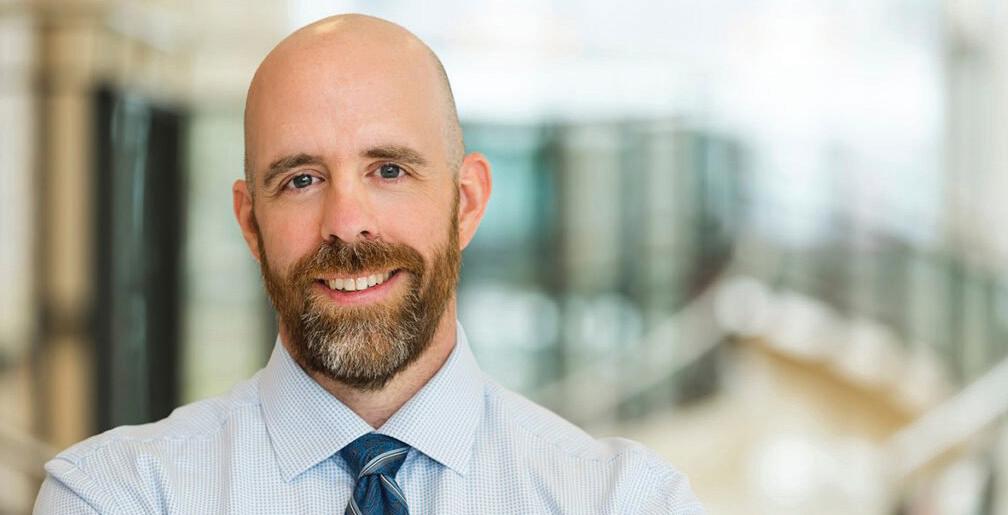
THE DOLLAR FIGURES
Benoit-Antoine Bacon became UBC’s 17th president in November 2023 following Santa Ono’s departure to the University of Michigan. Bacon, who was appointed in July 2023, joined UBC from Carleton University. The full contracts of Bacon’s two predecessors, Ono and Arvind Gupta, were published on the Board of Governors website. However, The Ubyssey had to file a freedom of information request to access Bacon’s contract.
Here’s a breakdown of the contract and how it stacks up against Ono’s.
In 2016, Ono earned $470,000 annually. Bacon is set to earn $515,000, which falls short of Ono’s initial salary when adjusted to inflation. This salary can be raised yearly based on performance as long it aligns with UBC’s salary policy and the BC government’s Public Sector Employers Council guidelines.
In 2020/21, the year prior to his departure, Ono’s total compensation was $611,712.
THE RESPONSIBILITIES
While Gupta and Ono’s contracts had minor wording differences, the wording of responsibilities in Bacon
and Ono’s contracts are identical.
Bacon holds two positions at UBC — president and professor of psychology in the Faculty of Arts.
He will not receive a salary for his professor position unless he no longer holds the presidency. In this situation, Bacon is entitled to receive a salary in the “middle of the top quartile of full professors” in his department.
He also receives an annual stipend of $50,000 to support his scholarly research. The contract writes the funding is stackable and cumulative over years. No research funding was included in Ono’s contract.
The timeline of performance review has also changed slightly, with specific dates being replaced
 Renée Rochefort News Editor
Renée Rochefort News Editor
2024/25 UBC BUDGET APPROVED
UBC’s $3.8 billion 2024/25 budget was approved at the March Board of Governors meeting.
Broken down, the budget has $2.7 billion in the operating funds, which can be freely spent and $1.1 billion in non-operating funds, which have restricted uses. The budget projected a surplus of $94 million, which will mostly come from the non-operating side.
The operating revenue for UBC is projected to come from three main contributors: government grants, tuition fees and sales and services. Revenue from tuition is predicted to be close to $1.1 billion.
International student tuition will account for $700 million, while domestic student tuition accounts for $400 million in the budget.
UBC is projecting an enrolment of 63,005 full-time equivalent students on both campuses in 2024/25.
MAN CHARGED
WITH SECOND-DEGREE
with “within a reasonable amount of time.”
All UBC presidents are appointed for 5-year terms that are renewable once, meaning a person can hold the position for a maximum of 10 years.
In case of resignation, Bacon must give three months written notice to the university. The university also reserves the right to terminate his appointment at any time without cause.
THE OTHER BENEFITS
Bacon will take up residence in the Norman MacKenzie House, the official residence of UBC’s president. All associated expenses, including housekeeping and property taxes, are fully paid for by the university.
In return, the contract stipulates Bacon must behave “as a prudent owner.” The house is renovated around once a decade with the most recent ones being in 2015. Bacon’s relocation expenses from Ottawa to Vancouver were also paid for by the university.
Bacon will receive a $1,000 a month taxable allowance to be used toward a vehicle of his choice. He is also entitled to expense up to $2,500 annually for financial planning and all expenses related to his position.
He is allowed six weeks of vacation annually and is entitled to extended benefits including disability, life and dental coverage, as well as coverage for spouses and dependants.
Bacon’s term will end on October 31, 2028. U
MURDER AFTER HOMICIDE NEAR UBC CAMPUS
The RCMP laid charges against Yang “Christopher” Liang following a homicide investigation after the death of a female in the 5400-block of Shortcut Road in the University Endowment Lands on March 13.
On March 14, around 11:42 p.m., the University RCMP detachment responded to a call of a female in medical distress who was found deceased on the scene.
According to investigators, this “may have been a tragic incident of intimate partner violence.”
MINIMUM WAGE INCREASE COMING TO BC
Starting June 1, the hourly minimum wage will increase by 65 cents, moving from $16.75 to $17.40.
The Minister of Labour Harry Bains said these measures reflect the province’s commitment to supporting low-income workers.
However, some students remain concerned about broader affordability issues.
Justin St Denis, a second-year psychology student, expressed frustration with the current minimum wage.
“It’s too low right now because by the time that I pay for groceries, it leaves me little to no money.”
However, St Denis said the increase remains a temporary fix.
“I don’t see this as a permanent solution, but it will act as a shortterm stop gap to help me afford groceries and rent month to month.” U
EDITORS AISHA CHAUDHRY + RENÉE ROCHEFORT NEWS APRIL 9, 2024 TUESDAY 3 ONE MORE TIME //
Work Learns on campus.
IN THE BAG?//
RENÉE ROCHEFORT / THE UBYSSEY
WHAT’S
Bacon is set to earn $515,000, which falls short of Ono’s initial salary when adjusted to inflation. CARLETON UNIVERSITY
Renée Rochefort News Editor
NEWS BRIEFS
ISABELLA FALSETTI / THE UBYSSEY
Burb Cannabis opens on campus after contentious application
Iman Janmohamed Features Editor
Nearly six years after cannabis legalization and after three years of planning, Burb, a cannabis dispensary, opened on the University Endowment Lands (UEL) in late February.
Burb — short for “burn herb,” according to general manager Peter Pittson — is a chain of dispensaries in the Lower Mainland. The UBC store is Burb’s eighth location, the most any cannabis retailer can have under provincial law.
Pittson said Burb had a queue around the block on its opening day.
“It’s been a long journey to get this store open, but excited to be here now,” said Pittson.
In May 2021, Burb Cannabis Corporation applied to the UEL to amend the UEL Land Use, Building and Community Administration Bylaw to allow for the conditional use of a recreational cannabis retail store at 5784 University Boulevard.
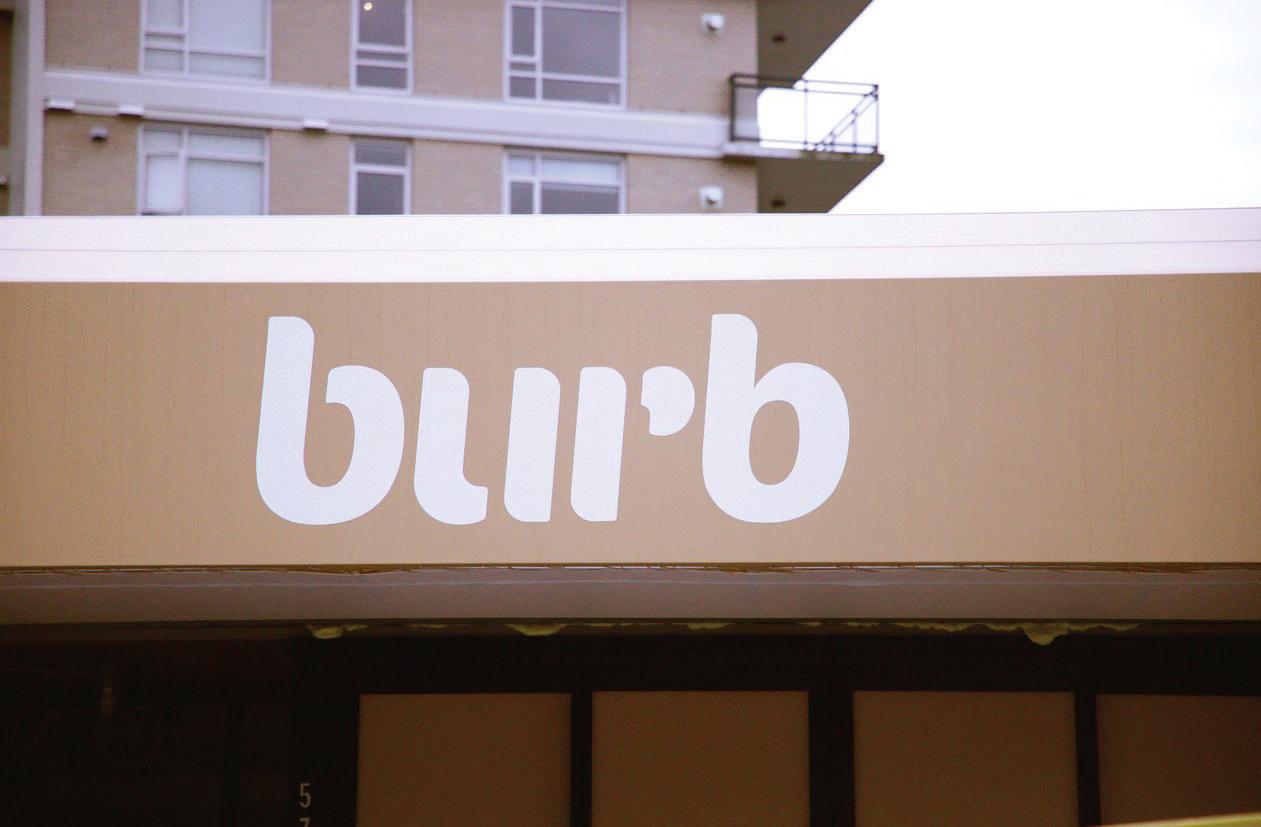
includes product standards and age verification.
“People are gonna get the weed anyway, so why wouldn’t they want it to come from a safe, regulated place?” said Pittson.
McCutcheon — who did not respond to a request for comment by press time — wrote about Burb’s opening in her March 8 newsletter, saying Burb said this location is “the world’s first cannabis store on a university campus” but that “the store is on UEL land, not on UBC campus. UBC does not permit cannabis stores on campus.”
According to UBC’s Office of the University Counsel, cannabis sale on campus is prohibited unless it’s authorized under federal and provincial law and, for retail outlets, with a license issued by UBC Campus + Community Planning.
Pittson said Burb is looking to engage with the student community, especially since there is misinformation about cannabis use.
The AMS and other community members supported Burb’s 2021 application, pointing to the need for a safe supply of cannabis near campus. At the time, the closest
Despite opposition from UEL residents, including Electoral Area A Director Jen McCutcheon and West Point Grey MLA and Premier David Eby, the Metro Vancouver Electoral Area Committee recommended the approval of the Burb application to the Metro Vancouver Regional District Board in 2022.
Pittson said Burb follows Health Canada guidelines which cannabis store was a 10-minute bus ride away in West Point Grey. A petition by UEL resident Connie Chen said dispensaries are inappropriate for UBC’s academic environment. The UEL is not managed by UBC, as it an unincorporated area.
“By allowing canabis retail to exist in this business plaza, we are putting vulnerable children at a high risk of exposure to substances they are too young for,” wrote Chen.
“This is an amazing location to be able to educate people about cannabis,” said Pittson. “There’s a lot of people that love to learn around here.”
“If anyone wants to come by, chat to our team. We’re very knowledgeable and happy to share our experiences.” U
The Point shuts down three weeks earlier than planned
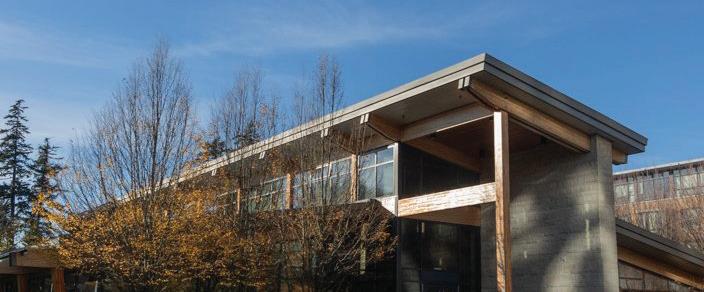
lenges and employee availability.”
The Point unexpectedly closed on March 22, just three weeks after announcing that the outlet would permanently end operations on the last day of classes.
Located on the main floor of Marine Drive Residence’s Building 4, The Point had been open for over 14 years. The space is now set to be a location for production support and the growth of Sage Catering on campus to expand the organization’s delivery components.
Director of UBC Food Services
Colin Moore said the restaurant business is challenging and that the decision to close early was due to “some unforeseen operational chal-
“Over this past year, we have engaged with the UBC community to renew The Point,” Moore wrote in a statement to The Ubyssey “While customer feedback about those changes has been positive, inflation and the competitive food service environment on campus means operating The Point is not financially sustainable,” Moore wrote.
As of March 2, the restaurant only operated on weekends. According to the food outlet’s Instagram page, the March 22 lunch was the staff’s final service.
Moore said all of the restaurant’s CUPE 116 and AAPS employees will resume equivalent positions at other UBC Food Service operations in outlets including Sage Catering and other residence dining and retail
locations.
While a restaurant similar to The Point will not be returning to Marine Drive for the foreseeable future, Moore said that “casual, sit down dining [experiences]” like Open Kitchen are available during the winter semesters on the west side of campus.
“I think sometimes people don’t know that they’re open to everybody. But they’re there to provide that amazing connection to life at UBC.”
In 2022, UBC shifted to an all-access dining plan, meaning first-year dorm residents were no longer able to use a major portion of their meal plan funds to eat at the restaurant. Moore did not note this as a factor in the restaurant’s closure. U

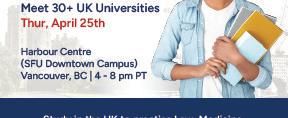

4 | NEWS | TUESDAY APRIL 9, 2024 GREEN-LIT //
Fiona Sjaus Senior Staff Writer
According to the food outlet’s Instagram page, the March 22 lunch was the staff’s final service. JERRY WONG / THE UBYSSEY
ONE SALAD FROM HERE LIVES ON IN MY HEART //
Burb, a cannabis dispensary, opened on the University Endowment Lands (UEL) in late February. MAYA CUMMING / THE UBYSSEY
THAT
ADVERTISEMENT
Take it sleazy: BVP’s Goosehunt isn’t sorry for party rocking
words by Tova Gaster, Elena Massing & Fiona Sjaus photos by Renée Rochefort
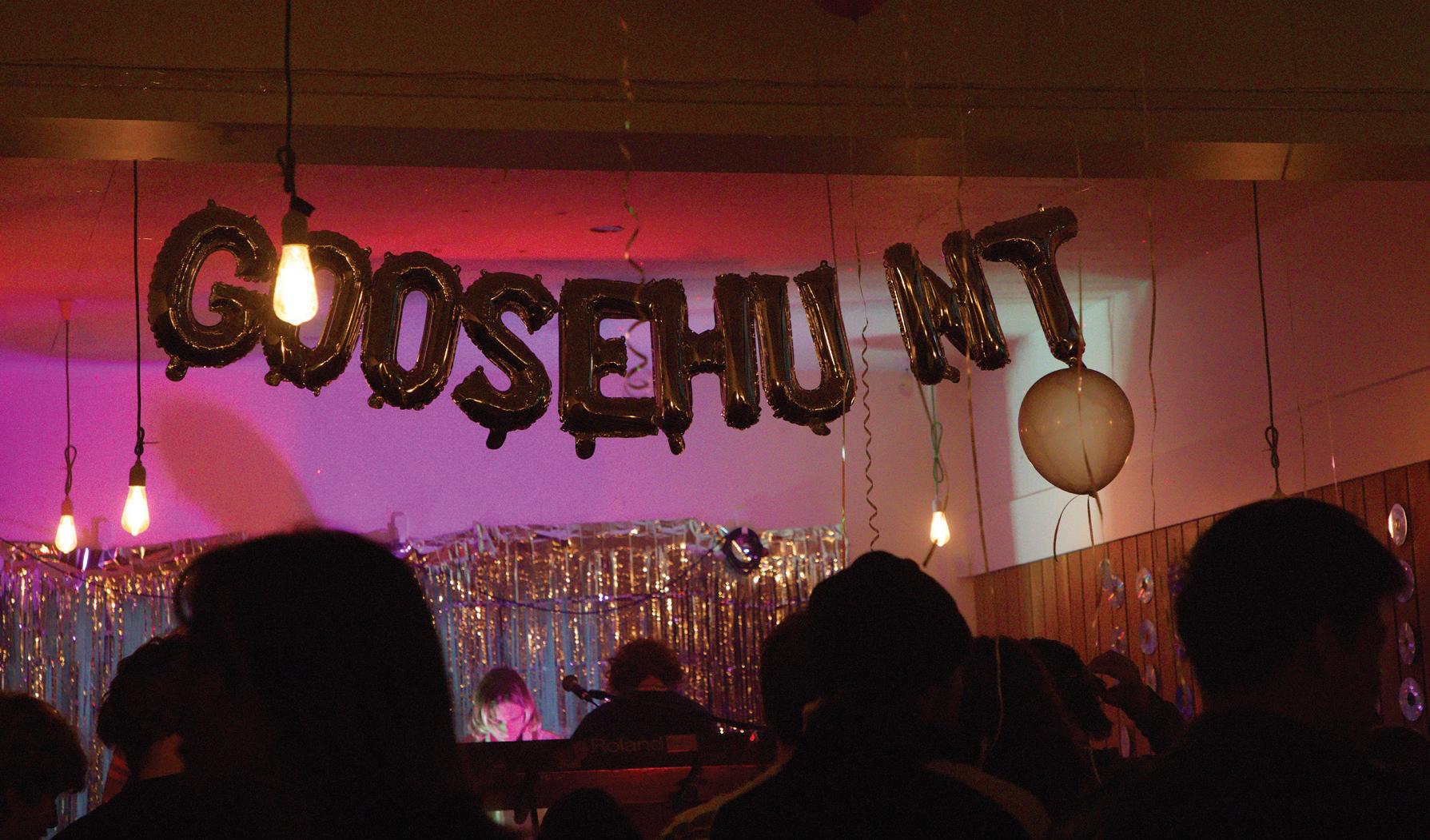
On the way to Koerner’s Pub, out of the corner of our eyes, a menacing goose locked our gaze. The writing was on the wall before we’d even arrived at the function — Blank Vinyl Project (BVP) had really gone all out this year, because it managed to get an enticing paid actor to guide patrons to Goosehunt.
Goosehunt is BVP’s annual music festival consisting of cherry-picked local acts who come out to play Koerner’s Pub on the first Saturday of every April. We don’t know where the name came from, but we suspect it refers to the chase to find what is invigorating. But that’s just a theory.
This year, guests were invited back in time to a birthday bash of glitter, neon, streamers, smudged mascara and solo cups, the era that tethers somewhere between trash and taste — the indie sleaze epoch of the 2010s.
It took us a whole night of live coverage to piece together that indie sleaze is Macklemore strutting into a thrift shop trying to steal your grandpa’s style, digital cameras, moustache marketing, weirdly specific Tumblr hashtags and just MGMT and Paramore as concepts.
We may talk shit about millennials, but at the end of the day, we honour the contributions our cringy predecessors made to fashion: ripped tights, mesh, a loose tie askew over a t-shirt. After all, somebody had to walk for Goosehunt to run as smoothly as it did.
Running an event of this scale can be a logistical nightmare, but BVP pulled it off. Even through the chaos and crowds, a well-stocked and staffed harm reduction table ensured all goosehunters stayed safe.
Strangers were bound together by moustaches drawn on index fingers with sharpie, as we meandered between the warmth of faux fur.
Halfway into the night, when we hesitantly raised our ‘staches to our upper lips and were blinded by the unexpected flash of our digital camera with the bass pulsing in the floorboards underneath us, we realized we had finally found it —
the metaphorical goose, our own indie sleaze.
It’s revealing of the foretold aesthetic’s comeback that the crowd didn’t look that different from an average BVP show.
People were still trickling in when The Hausplants opened the evening with their outdoor set. Their mossy pop sound mixed flowery guitar, fluttering vocals and tight punchy drums that flowed well into Rosemary Ginger’s herbal phasing riffs and granola-esque groovy tone. girly.’s distinct style — think alternative rock that looks R&B right in the face — was definitely a major shift in the vibes, but Goosehunt had 12 acts in total, and musical diversity is what keeps long festivals like this one fun and fresh. What started as light swaying somehow ended in people pouring onto the stage’s edge.
And as that song by the Yeah Yeah Yeahs goes, the glitter was all wet because April showers cascaded over the patio just after nightfall during Tiger Really’s healthy serving of invigorating rock adjacency. But if being an indie sleaze in Vancouver means anything, it’s resistance to downpour. At the top of the steps of Koerner’s, we whipped our heads around in time for a brave soul to do the worm over slippery concrete.
And as the party moved inside once more, Empanadas Ilegales played psychedelic cumbia with guitar grooves and trumpet melodies with minimal vocals, a contrast to other bands on the bill. Their music lends itself well to dancing, but there wasn’t space for that, so the crowd defaulted to a sheepish mosh.
Jumping up and down and into others felt like an appropriate reaction to the righteousness of some of the other bands at Goosehunt (like Rougaroux). For Empanadas’ gentle cumbia, though, the turbulent crowd made us feel less like punks in the pit and more like gravel in a river getting sanded smooth by the current.
Rougaroux is metal to be reck-
oned with. When Emm Hanley whales their guitar and George Finley shrieks into the mic in perfect harmony, you have no choice but to surrender to the buzz that flows from your ears to your diaphragm.
Goosehunt is now entering its 11th year, and many of the artists see the festival’s success as a testament to the importance of preserving indie music communities, particularly at universities. Vancouver is a hub for indie musicians, so as the biggest post-secondary institution in the city, UBC students have a huge influence on the scene, both as artists and audience members.
“I feel like the UBC current student body makes up a lot of the music scene in Vancouver right now, [so] to come here and be part of that community directly is really cool,” said Finley. “I think university music communities specifically are really important … There’s just a really big creative drive, and a desire to change things and make better spaces for ourselves and for our communities.”
Going into the festival, girly.’s frontman Darius Crump didn’t think anyone would be too familiar with his music and was shocked by how well the UBC crowd received it. Playing a show this well known means a lot to him.
“It’s a pretty cool feeling to be able to be like ‘no, sorry, the show is sold out.’ It’s a cool milestone,” he said.
The night came to a close with the technicolour dynamism of Yukon Blonde, then a set from DJ Woozy. Knees aching and moustaches smeared, we made our way back across campus, and there it was again — the goose. Maybe we’re thinking too hard, but it’s nice to imagine it’s some kind of subliminal sign, a message that the music will follow us, wherever we go.
“Indie will live on forever, no matter what,” Crump had told us earlier that night. “People will hate it, people will love it … it’s gonna live on forever.” U
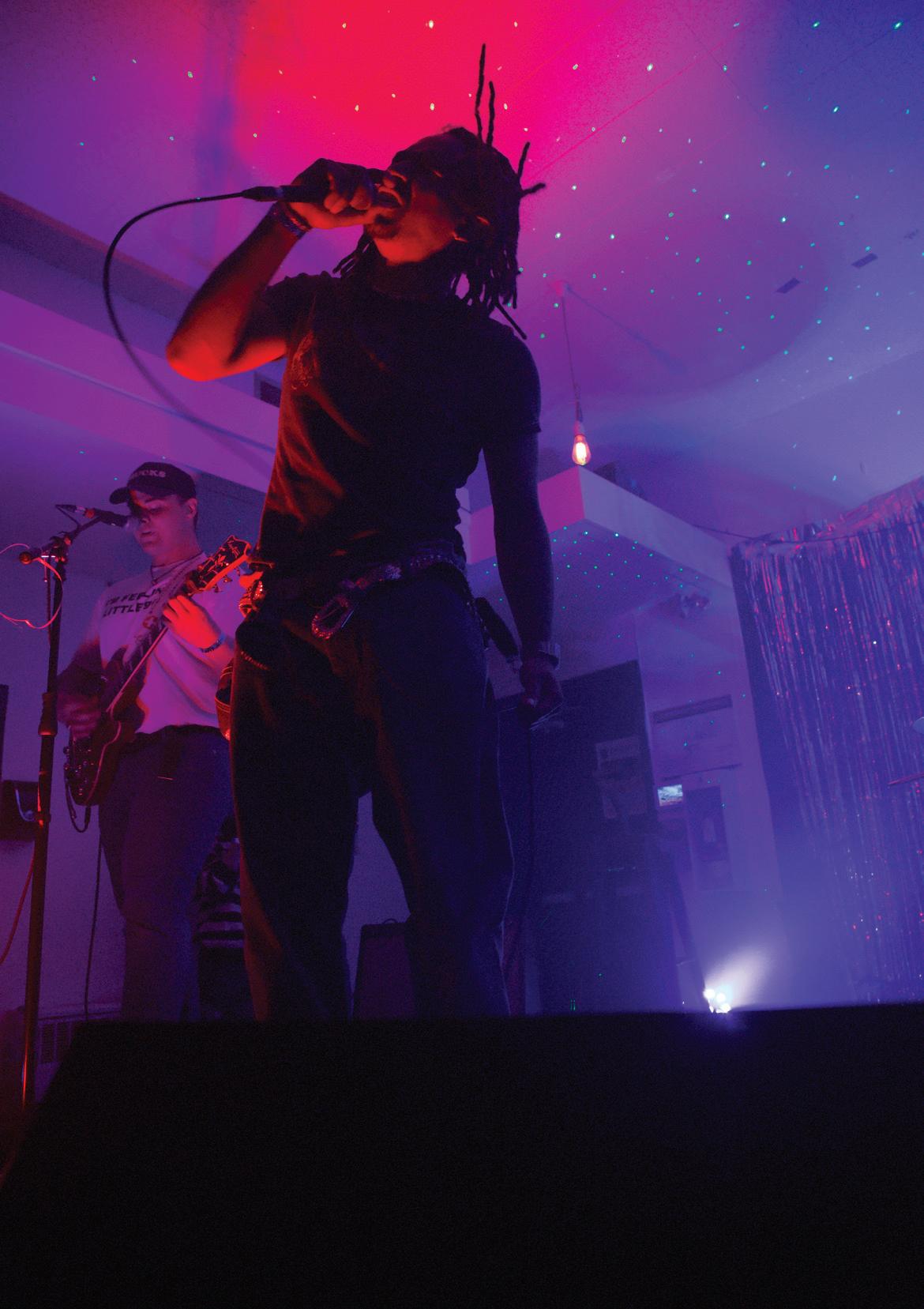
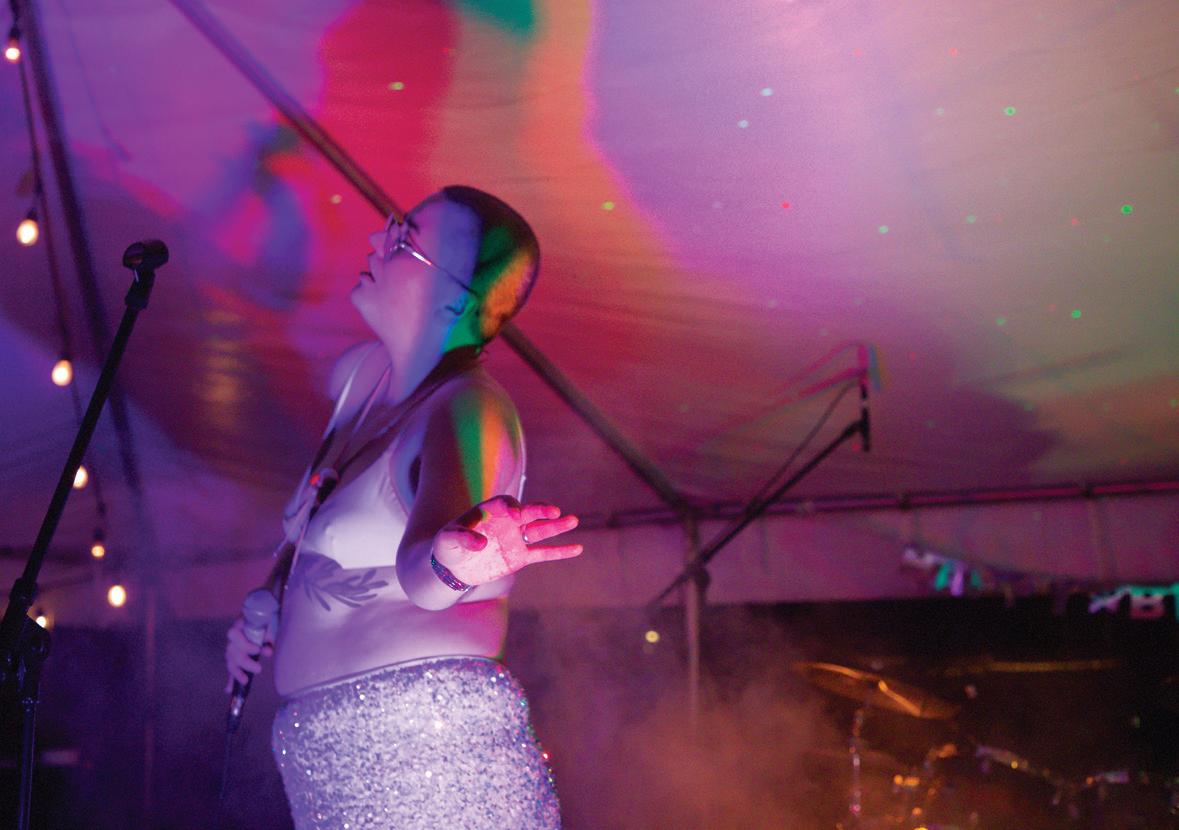

EDITOR ELENA MASSING CULTURE APRIL 9, 2024 TUESDAY 5
CHILD-SIZED, CRITICAL STEPS
There’s an entire community working together, and through child-sized, yet critical steps, UBC Child Care is nurturing inclusivity in a new generation — at a price people can afford.
words by ELENA MASSING design by IMAN JANMOHAMED
When
Barbara Undurraga began her role at Discovery Daycare, one of UBC’s child care centres, the first thing she noticed was a sign depicting two white children exploring some sort of fantasy forest and a Canadian flag.
Something about that didn’t sit well with her. Especially with the flag out front.
The image, when considered with the centre’s name, brought to mind the Doctrine of Discovery — international principles set in the 15th century that allowed Christian powers to lay claim to non-Christian territories and their resources. Because of this, social values and systems set by Indigenous peoples inhabiting Turtle Island were overruled in favour of the colonial ideals we still live by today.
Undurraga, who has worked in early childhood education for 20 years, currently serves as the acting senior educator at Discovery, a centre specifically for children under 36 months. She brought up her concerns about the name and its implications with her team, opening up a conversation about inclusivity in the centre.
Undurraga is just one part of the movement to decolonize child care at UBC. There’s an entire community taking child-sized yet critical steps together to nurture inclusivity in a new generation — at a price people can afford, too.
Enalyne
Point used to work as an early childhood educator, but in 2021, she stepped into the newly-created position of Indigenous relations engagement pedagogist for UBC Child Care Services (CCS).
Point — who has lived in Musqueam for 18 years and said she is part of the community by marriage — has always tried to weave Indigenous values and practices into her work, and she now spearheads initiatives to help other childhood educators across UBC do the same.
“What I’ve been doing is working with the educators, first and foremost, as a collective unit to bring Indigenous topics to the forefront, and really think about how we can decolonize within ourselves,” she said.
Unlike Undurraga, Point doesn’t typically work with children firsthand. Kids need consistency and routine, so it would be impossible for Point to spend enough time with each of them to see tangible change. Instead, she takes the lead on professional development, spending most of her time working with educators, who relay what they’ve
learned to children and their families.
“Each centre has such a unique philosophy,” said Point. “I feel like providing the information and the teaching with the educators makes sure that they could really fine tune it to work with the philosophies of their centres. Then they have the ability, the agency to consistently embed it into their centres.”
UBC’s child care centres cater to particular age groups, and offer different teaching styles and goals, so parents can make informed decisions about their child’s education.
Many of UBC’s early childhood educators are not originally from Canada, and may not be familiar with the country’s colonial history, so educating them on these topics in a judgment-free space is a priority for Point.
One of her main projects has been the Indigenous Insight newsletters that she sends out to CCS staff every week — writings on historical and contem -
UBC Child Care has been a love of mine, where over a pot of tea, we can just talk and create safe spaces.”
Point has also worked with each CCS centre to create a specialized land acknowledgment, and showed them “why it’s more than just a tick of the box, and how to make it meaningful and authentic.”
The more that educators know, the more they will be able to relay to the kids — an age-appropriate introduction to Indigenous histories as a primer for the discussions they will be having later in their education.
“We look at ourselves as really the first rung on the ladder of education,” said Karen Vaughan, director of UBC CCS.
As part of CCS’s management team, Vaughan is responsible for determining the direction of UBC’s child care services and meeting with educators regularly to make this happen. Currently, supporting Point’s initiatives is a
“What I’ve been doing is working with the educators ... to bring Indigenous topics to the forefront, and really think about how we can decolonize within ourselves.”
— EnalynePoint,UBCCCSIndigenousrelationsengagementpedagogisT
porary topics relating to Indigeneity, often based on discussions that she and her late husband would have about things non-Indigenous people might not understand.
Point has also curated a lending library where educators can freely access Indigenous literature, so they can bring books to their centre for children or simply read them to further their own learning.
She also discusses these subjects with educators at twice-monthly “tea talks.”
“[In Musqueam], one of the informal customs is that anyone can come over, and there’ll always be a pot of tea and a table setting for you to ... have a conversation with whoever you like,” said Point. “Bringing that practice here at
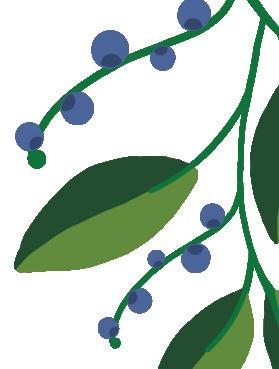
priority for her — she “spend[s] quite a bit of time with the educators exploring our vision, our values, Indigeneity, decolonizing our practices.”
“I’m hopeful and excited that we can help achieve and expand on the goals and actions of UBC’s Indigenous Strategic Plan by extending Indigenous education into the pre-kindergarten setting, for both Indigenous and non-Indigenous children in our care,” Vaughan said.
Educators like Undurraga are feeling the benefits of Point’s initiatives. In the bustle of a daycare, it’s not often that educators get the chance to slow down and reflect on why their work matters and how they can improve.
FEATURES APRIL 9, 2024 TUESDAY 6 EDITOR IMAN JANMOHAMED
“I sit down with her, and she helps me understand what we can do to have an open heart, to have good intentions, genuinely, and be truthful,” said Undurraga. “It doesn’t take just one person, it takes the whole community.”
UBC’s surrounding forests are a huge asset to its child care centres, said Undurraga. It’s easy to centre connection to the land when trees and trails are just a few steps away. Point sometimes takes staff on guided “medicine walks,” which are an opportunity to decompress, but also a chance to learn more about their environment and how to engage with it respectfully.
“Sometimes families will join us and go for walks,” said Undurraga. “They also are having fun, they’re smiling and they’re participating with the children’s learning. It’s beautiful to see.”
While doing renovations at Discovery, Undurraga and her team realized that many of the plants were invasive species in North America. With Point’s help, they identified plants native to Coast Salish land, like salal and huckleberry, and incorporated them into the new design of the centre.
“The children know the names. They also show the other children who are new how to eat it, how to touch it, how to be gentle,” Undurraga said.
Teaching kids how to respectfully engage with each other is a priority, especially when educating about colonization and reconciliation. Both Undurraga and Point emphasized the importance of approaching conversations around Indigeneity with an open mind and a willingness to make mistakes and then learn from them.

year later, all of its three to five-yearold spaces were also taken in.
Vaughan has already noticed families who weren’t previously accessing UBC’s services due to financial barriers are now able to do so.
“We have an agreement with the AMS to fill 40 per cent of our entire suite of child care spaces with student families,” said Vaughan. “And historically we’ve struggled to meet that 40 per cent, but last year, for the first time, we exceeded it. So that’s one of the indicators that could be correlated to affordability through $10-a-day child care.”
But $10-a-day daycare spots are limited, since not all centres across the province are part of the plan, which is only increasing demand for these affordable spots.
“I think our waitlists are probably going to grow, and we won’t be able to keep up with the growth in the waitlist, even [with] our childcare expansion plan,” Vaughan said.
UBC’s Child Care Expansion Plan aims to add 1,200 spaces by 2041, but it’s unlikely this will be enough. The plan also doesn’t account for the costs
“At the end of the day, if [parents] knew that their children were well taken care of, they could do their jobs efficiently and effectively during the day, pick their kids up at five o’clock in the afternoon and really turn their attention to their children in a fulsome way,” Caragata said.
Learning takes place everywhere, not just in the classroom. Parents model behaviours that children pick up on, so shifting their own mindsets is a key step toward encouraging inclusivity, especially in the community-based work happening at CCS.
The time and effort that parents are able to put into their child’s education — engaging in potlucks, going on forest walks and doing self-guided reading — will play a role in how effective these methods ultimately end up being in increasing knowledge about Indigeneity.
But for some parents — and educators, who need to be properly compensated for running these activities — this standard of care is only attainable through initiatives like $10-a-day childcare.
Caragata’s report includes a list of recommendations for the provincial government to ensure that this is an option for as many people as possible. Among other things, they call for increasing the number of fully publicly funded spaces, taking “an equity-based approach” so that marginalized families have better chances at getting $10-a-day spots, implementing early childhood educator wage grids to prevent staff turnover and banning waitlist and registration fees.
“I think our waitlists are probably going to grow, and we won’t be able to keep up with the growth in the waitlist, even [with] our childcare expansion plan.”
To educate families and help connect them with each other, Discovery holds potlucks where people have the chance to discuss their learning and practice keeping an open mind.
“It’s just about sitting and being quiet and listening to each other, and then we can plan things together,” said Undurraga.
CCS is trying its best to prioritize professional development, particularly through Point’s initiatives — but these services come at a cost, and they haven’t always had the means to implement them.
With BC’s new child care funding models gradually being rolled out, including recent expansions to the $10-a-day program, Point’s goals are a bit more feasible.
“The funding from the federal government and the provincial government is historical. We’ve never seen funding like this,” said Vaughan.
CCS currently has 746 licensed spaces on campus — 196 are infant/toddlers spaces, 344 are for children ranging from 30 months to age six, and the other 206 spaces are for school-aged children, according to Vaughan.
In January 2023, Vaughan said all of UBC’s infant and toddler spaces were taken into the $10-a-day program. A
— KarenVaughan,UBCCCSdirector
that come with professional development initiatives like Point’s or discuss the topic of Indigenizing child care at UBC.
Dr.
Lea Caragata is the directoR of UBC’s School of Social Work, and worked with Vancouver’s Centre for Family Equity on a 2023 report looking into the benefits of universal child care, including how it improves parent health and well-being, particularly for single mothers.
The report emphasizes that if families are to reap the full benefits of $10-a-day spaces, there has to be a more cohesive system in place.
When trying to access $10-a-day spots, parents enter a “hectic scramble.” They need to research their options, make phone calls and fill out forms — taking time that low-income families, often of intersecting marginalized identities, can’t set aside during a work day.
Having access to safe and secure child care helps parents prioritize caring for their children without having to make significant sacrifices in other parts of their life, whether that be work, safety and wellbeing or personal goals and relationships.
“Kids who have good quality daycare have another parent-like figure with whom they can kind of build secure attachment, which also speaks to the need for stability in daycare staff,” said Caragata. “So it becomes kind of a circular thing because daycare staff don’t necessarily stay long, because daycare staff aren’t very well paid.”
By prioritizing educators and their wellbeing and professional development, CCS is investing in the future of its spaces and aiming to encourage longevity in its employees.
“Our number one thing that we actually spend quite a bit of time on is hiring, and then ensuring that UBC is the best place to be as an early childhood educator through offering professional development,” said Vaughan.
When child care is appropriately funded, it’s so much easier to uphold high standards of care, and keep thinking of new ways to drive reconciliation forward.
“If we look at affordability, accessibility and quality as a three-legged stool, the quality leg of the stool is directly related to the early childhood educators who do the work with children and families,” said Vaughan.
“They’re important, and I think it’s important that they’re held up as leaders here at UBC Child Care.” U
APRIL 9, 2024 TUESDAY | FEATURES | 7

Editor’s Note
Welcome to our year in review supplement!
Here’s a rundown of what The Ubyssey has been up to since last May:
We worked with over 200 contributors, welcomed 37 staff members and published 824 articles online. Our blog section rebranded to humour to better reflect the satire we publish. We worked overtime to put together 18 print issues and took countless photos to capture campus. We also won three national student journalism awards for writing and photography (humble brag).
The Ubyssey has been my home for the past three years (seriously, I’m in the office too much), and I’m so grateful for the community I’ve found here. And reflecting on this past year, I appreciate the privilege I’ve had to be a part of the broader campus community, too.
I got to write, read, edit and publish the stories of so many people at UBC, and I got to hear from people who’d read our work and connected with it in some way. I loved being a part of the campus conversation, even when it was toxic as hell — r/UBC, I see you!
Plus, I gained reams of knowledge about UBC administrivia that I can only hope will be useful to me again someday.
In the next few pages, you’ll find some of our best stories from this year, along with an update from our board president. Plus, you can go to ubyssey.ca to find a year-end update on our financials from our business manager.
I hope they show you why I think our work is important — highlighting our community, making us laugh and holding our university to account. U
Thanks for reading!
Anabella McElroy Coordinating
Editor
President’s update
Hey UBC!
It has been an honour to serve as the president of The Ubyssey Publications Society’s Board of Directors for the past two years! This year, the board continued its promise of increased transparency by publishing multiple presidential and financial updates and by ensuring students can visit our business office with questions or concerns.
For the first time since we became a society in 1996 (excluding a small update in 2017), I, along with board members and editors, am working on a bylaw review. The changes recommended to our bylaws and policies will be presented to the new board at their first meeting in May. These much-needed changes will help The Ubyssey adapt to the changing media landscape, as well as ensure the society is a welcoming and equitable space for all.
This year we also renewed our space agreement with the AMS, locking us into our space at the NEST until late 2028. This will allow The Ubyssey to continue delivering for the UBC community, and to continue fostering student journalism across campus.
Until my term ends on May 1, if you have any questions, my door is always open in room 2209 of the Nest or by email at president@ubyssey.ca.
To all the volunteers and staff at The Ubyssey, thank you for all of the work you do to keep this organization running, you are all amazing. Ubyssey forever. U
Jalen Bachra President of the Board of Directors
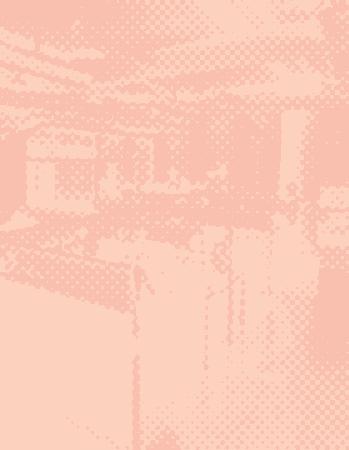

YEAR IN REVIEW APRIL 9, 2024 TUESDAY 8
The Ubyssey ’s 105th editorial Back row (L to R): Anabella McElroy, Jocelyn Baker, Spencer Izen, Aisha Chaudhry Middle row (L to R): Tova Gaster, Lauren Kasowski, Renée Rochefort, Elena Massing Front row (L to R): Anya A Ameen, Isa S. You, Iman Janmohamed

Gibi Saini, Gloria Klein, Gloria Rahgozar, Grace Wu, Harry Sadleir, Hasti Amirsalari, Himanaya Bajaj, Ian Cooper, Ian French, Ifeoma
Onwumelu, Isa Carlin, Isabella Ma, Isabelle Dina, Ishaan Sahai, Ishan Choudhury, Ivy Martin, Jade Quinn-McDonald, Jahnavi Bali, Jaromir Sulja, Jasmine Cadeliña Manango, Jason Wong, Jaya
Athwal, Jena Benson, Jennah Lay, Jerry Wong, Jerry Wu, Jess Goldman, Jessica Yueng, Jill Timmerman, Joanna Lee, Jocelyn Bogart, John Chen, José Reyros, Josh Bradbury, Julia Do, Julian Forst, Justina He, Kaasvi Bhatia, Kachi Ogbudibe, Kareem Hassib, Karen Zhou, Karina Boeckx, Karl Meyer, Katherine Feng, Katrianna DeSante, Kenneth Lao, Kento Otobe, Kevin Nyitrai, Khushi Patil, Kriesha Pradhan, Kyla Flynn, Laine Jackart, Laura Summerfield, Leonardo DeGorter, Lola Peverley, Mackenzie Burley, Maclawrence Querido, Mahin E Alam, Mandy Huynh, Manya Malhotra, Marie Erikson, Mark Jones, Matt Plyukhin, Maya Cumming, Maya Levajac, Maya Mior, Maya Rochon, Mayako Kruger, Megavarshini G. Somasundaram, Mia Ahmad, Micah Sébastien Zhang, Monica Feng, Morris Hayes,
Nandini Sood, Naomi Ng, Natalie Choo, Natalie Viegas, Nathan Bawaan, Nazanin Sadoughian, Nethra Nagarajan, Nicola Roscuata, Niki Booker, Nina Malekyazdi, Olamide Olabiyi, Olivia DeFehr, Olivia Vos, Phoebe Fuller, Polina Petlitsyna, Prisca Tang, Quyen Nguyen, Raunaq Nambiar, Raxana Sunthareswaran, Regina Hipolito, Rhea Krishna, Rhea Mann, Rita Jin, Ronha Kothe, Rory White, Rosemary Alberts, Rowan Barclay, Roy He, Sandrine Jacquot, Sarah Kim, Sarah Lennon, Sasha Singh, Saumya Kamra, Selin Berktas, Selina Tai, Shanzeh Pirzadah, Shereen Lee, Shih-wei Wang, Shubhreet Dadrao, Sidney Shaw, Simrit Randhawa, Siyah Basi, Solana Pasqual, Sonali Sharma, Sophia Collins, Sophia Russo, Sophia Yang, Srijaa Chatterjee, Stella Griffin, Stuti Sheth, Sultana Razia, Tanushi Bhatnagar, Tatiana Zhandarmova, Tatum Narode, Thea Turner, Tommy Chung, Trinity Sala, Vaishnavi Patil, Vicky Nguyen, Victoria Li, Viyan Handley, Yomna Bedaiwy, Yukiko Takashi-Lai, Z. Aazadeh Raja, Zainab Fatima, Zara Khan, Zobia Alam, Zoe Wagner

In print
- 18 issues published
- 229 since lines rejected
From the web
- 616,000 page views
- 339,000 unique users
824 articles published
Since lines that got away
On the top right corner of every issue you’ll find a ‘since line’ — an inside joke or reference to a current obsession that also serves as a reminder that we’ve been around since 1918. Here are our five favourite published since lines from the year and some more that got away.
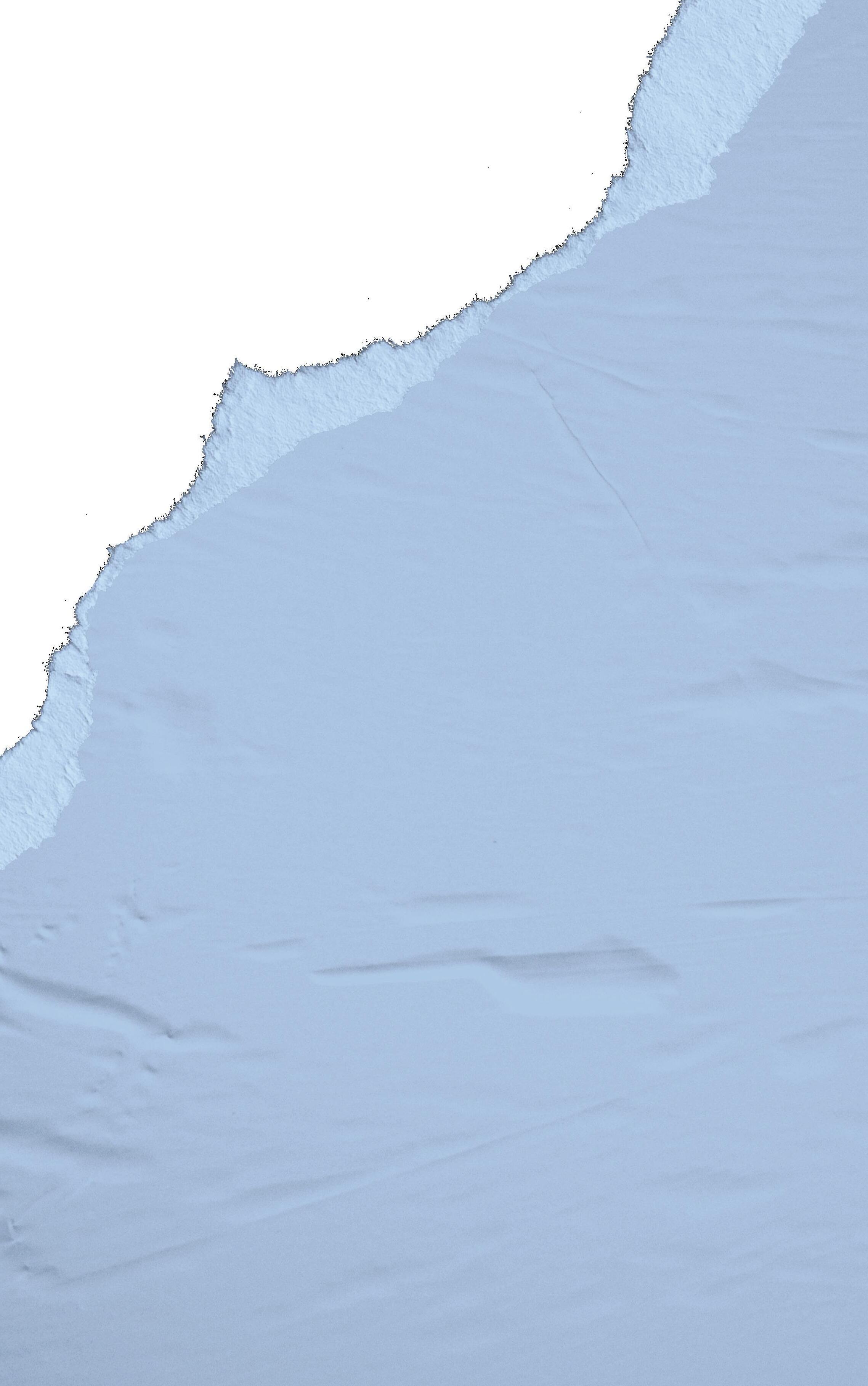
• There is a bra in the photo room since 1918
• WE Charity Scandal since 1918
• Fixing my iron deficiency with a copper IUD since 1918 (girl biology)
• Boo-byssey since 1918
• BoG in the bog since 1918
• Cut “and” on paragraph three line seven since 1918
• Euphemism for rat death since 1918
• Horny for a capella since 1918
Favourite published
• When I Imagine UBC, I see nothing since 1918
• Screaming in the stairways since 1918
• Milk walk since 1918
• BitchlessWW since 1918
• Women win, men lose since1918
• Typical chicken broth hang since 1918

APRIL 9, 2024 TUESDAY | YEAR IN REVIEW | 9
Aafreen Siddiqui, Abbie Lee, Aca -
2023/24 contributors
Top stories of 2023/24
Jun. 29, 2023

Five things I miss about UBC
words Sidney Shaw photo Cherihan Hassun
Have you ever met anyone who didn’t love Main Mall? The oak trees lining both sides. The ocean and mountains in the distance. The fountain filled with bubbles and the occasional goose. But all of it pales in comparison to the Kubota RTV-X900.
August 17, 2023
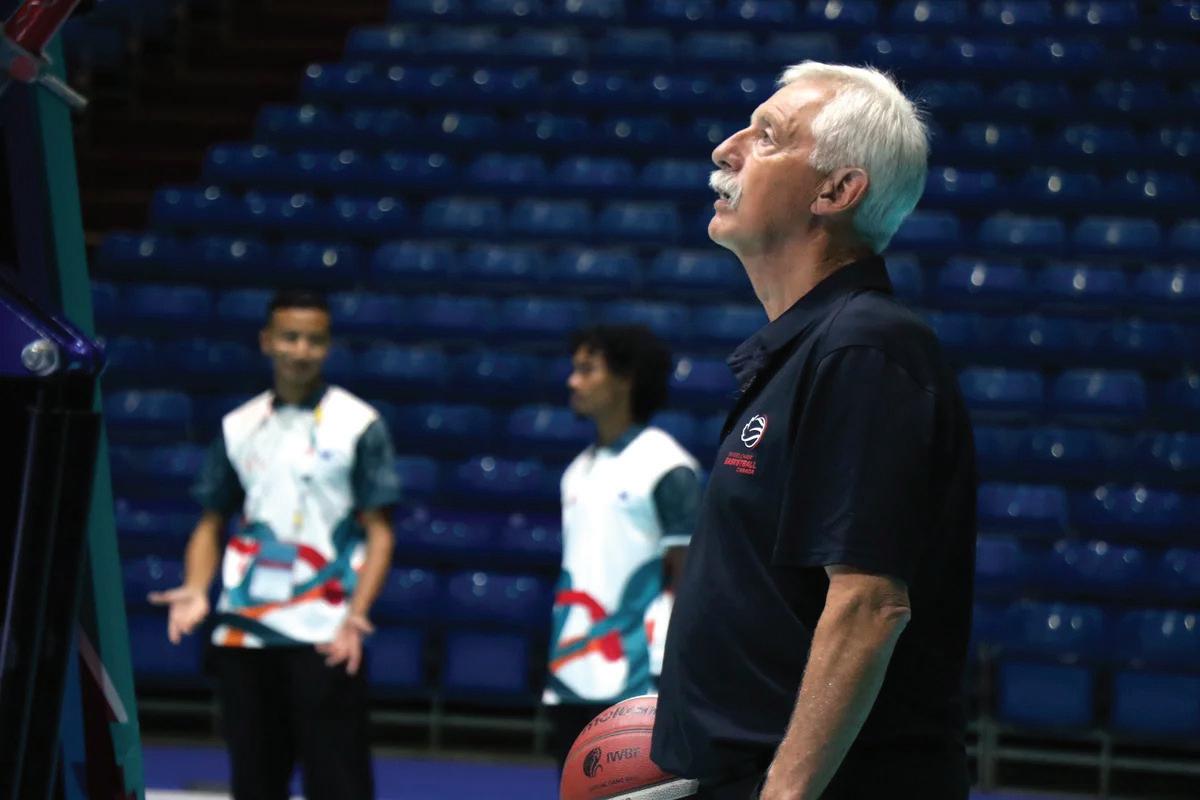
National coach Tim Frick’s career is a reflection of inclusion, adaptations and compassion
words Catherine Zhu photo Dhiren Mahiban Wheelchair Basketball Canada
His success as a volleyball player at UBC would translate into great success as a wheelchair basketball coach.

‘A story about us’: UBC ACAM program builds on the history of Vancouver’s Asian diaspora
words Nathan Bawaan illustration Anya A Ameen
In 2011, UBC committed to educating students on the history of internment. This created the multidisciplinary, 18-credit ACAM minor, which teaches students about the diaspora.

May 30, 2023
‘Pseudo-privatization’: Why UBC Properties Trust is still not subject to provincial freedom of information laws
words Fiona Sjaus
UBC Properties Trust remains exempt from releasing organizational information upon public request, nearly two years after a report recommending it should be.
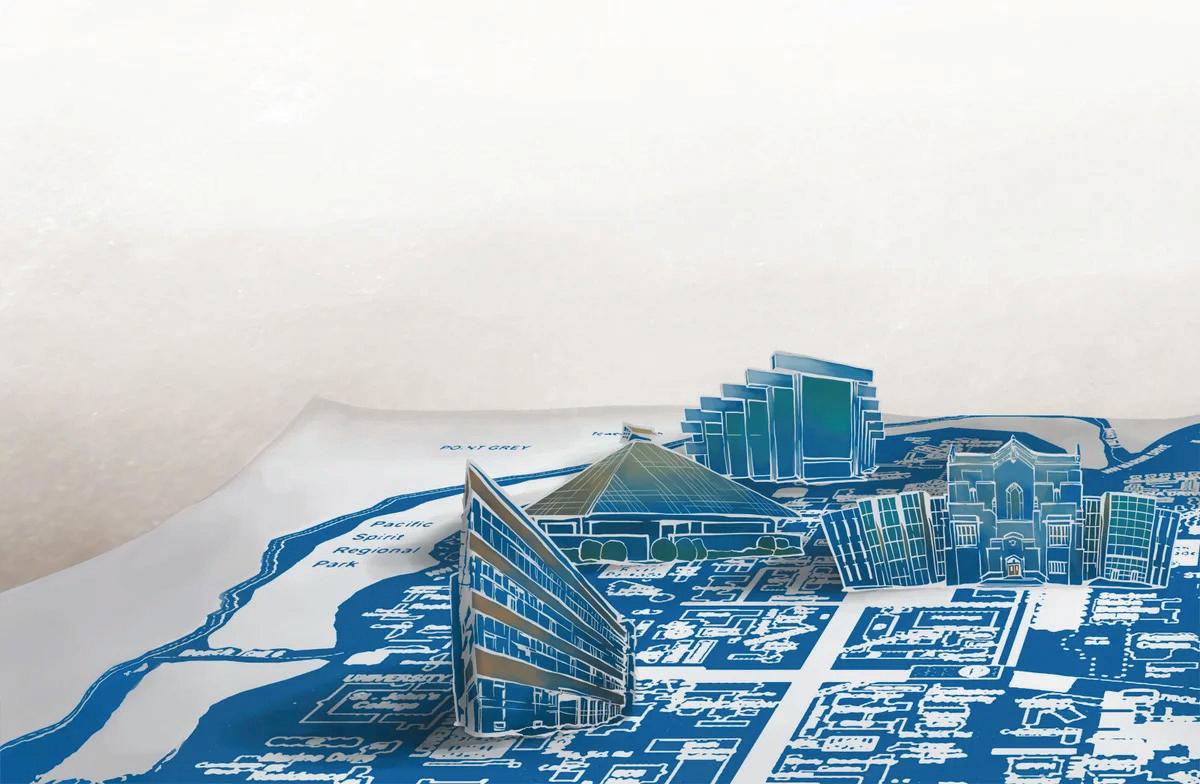
Aug. 17, 2023
Aug. 25, 2023

Humour: UBC to replace All Access Dining with ‘Girl Dinner’
words Kyla Flynn illustration jocelyn Baker
In their statement, UBC wrote “Girl Dinner is an affordable, nutritious and sexy dining option for students who prefer more whimsical dinner portions and dishes, and it’s also now the only dining option.”
Y-Dang Troeung’s memoir Landbridge reflects of refugee existence and familial love
words Elena Massing photo courtesy Penguin Randomhouse
This review of late UBC professor Y-Dang Troeung’s memoir about being a Cambodian refugee won the Canadian University Press’s 2024 Arts and Culture Writing award.
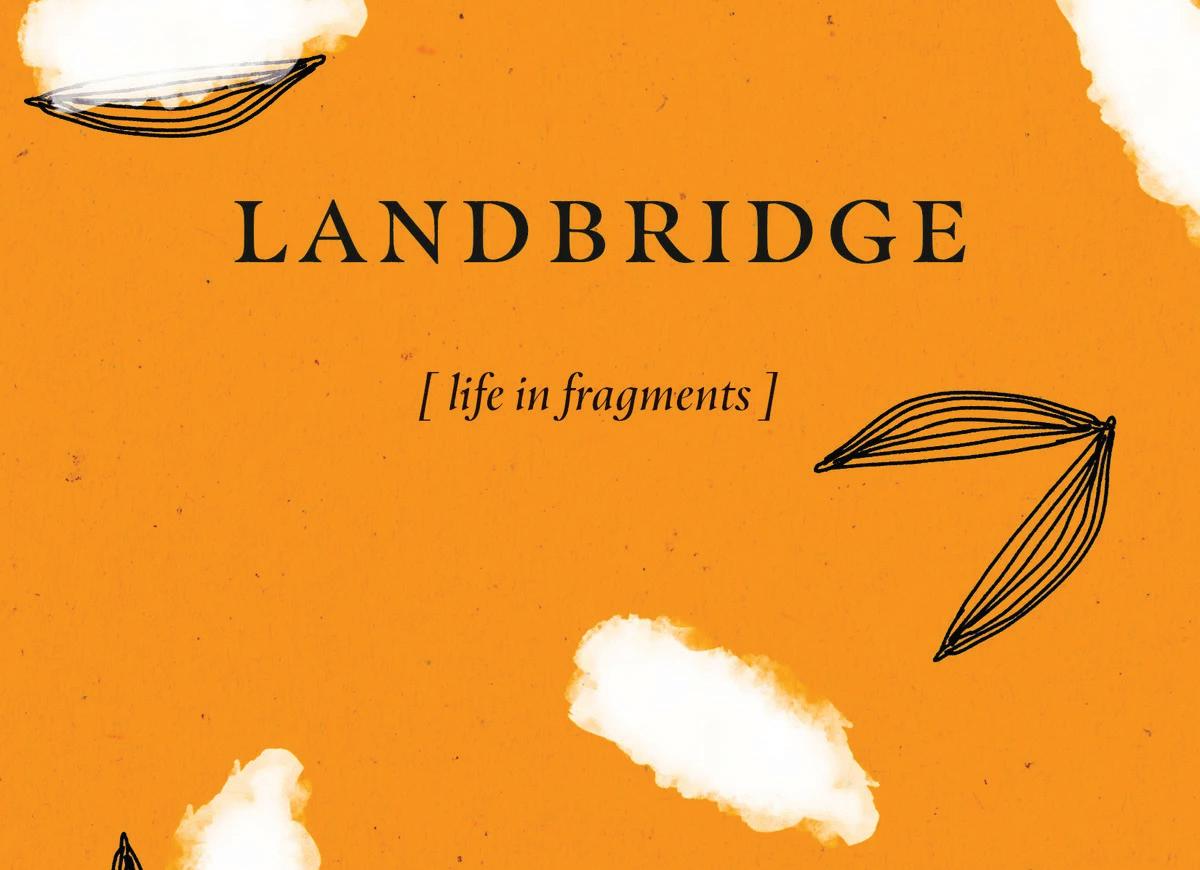
Aug. 24, 2023
10 | YEAR IN REVIEW | TUESDAY APRIL 9, 2024
Aug. 29, 2023
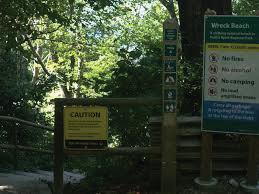
Stripped down: A look into Wreck Beach culture
words & photo Julian Forst
The Ubyssey picked the brains of some Wreck regulars to learn more about the community of Vancouver’s only official clothing-optional beach.

Sep. 29, 2023

Opinion: UBC and the AMS maintain class barriers to student mental health care
words Marie Erikson
Staff writer Marie Erikson challenges the accessibility of student mental health services, examining the chain of responsibilities and who should step up.
Teaching Assistants have a new collective agreement, here’s what changed
words Shih-wei Wang photo Anabella McElroy
TAs at UBC have a new collective agreement that includes setting up a religious and cultural observance leave and a two-day leave for Indigenous ceremonial, cultural, spiritual events without loss of pay.
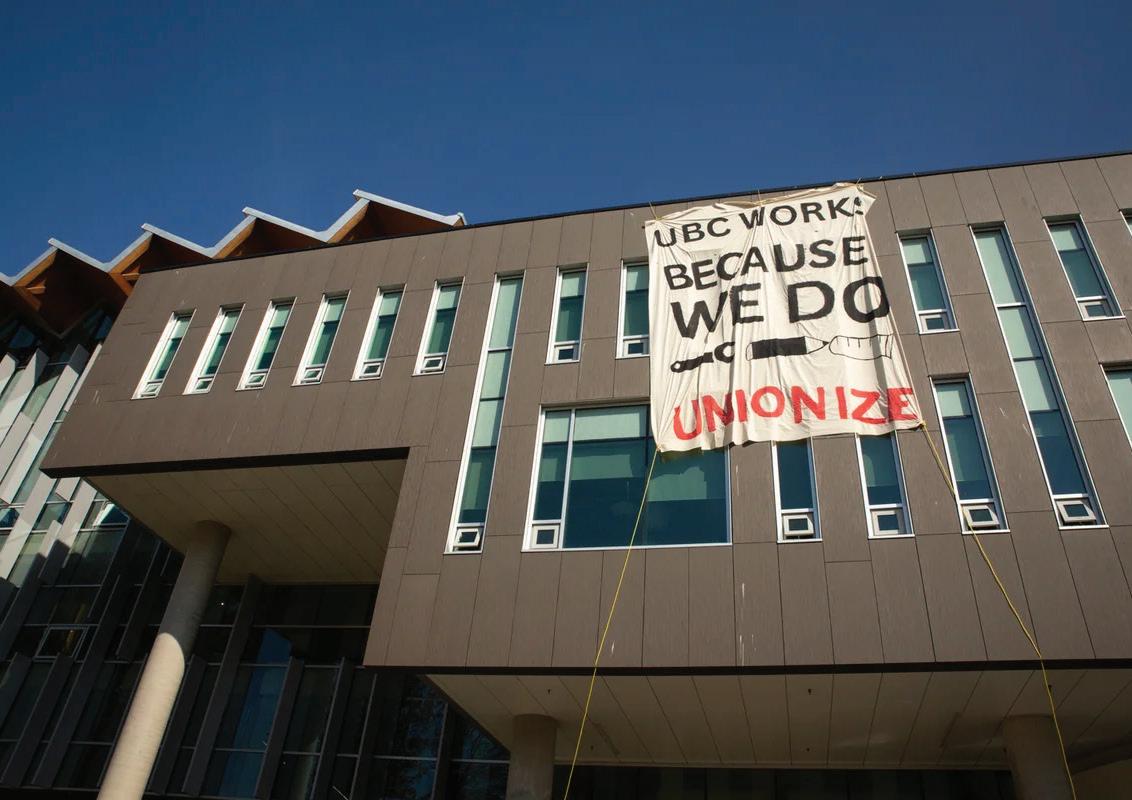
Sep. 22, 2023
Oct. 5, 2023
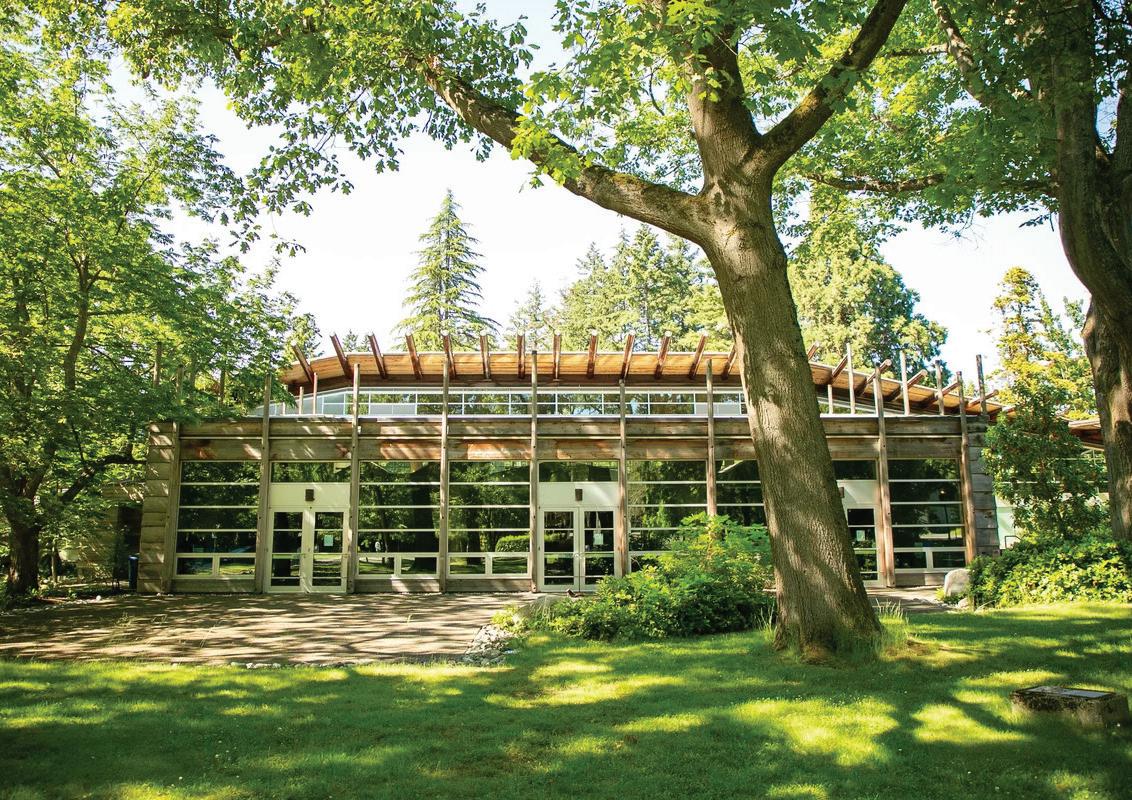
From vision to reality: UBC’s First Nations Longhouse celebrates 30 years
words Mayako Kruger photo Isabella Falsetti
UBC’s First Nations Longhouse celebrated 30 years since its opening in 1993.
Oct. 17, 2023
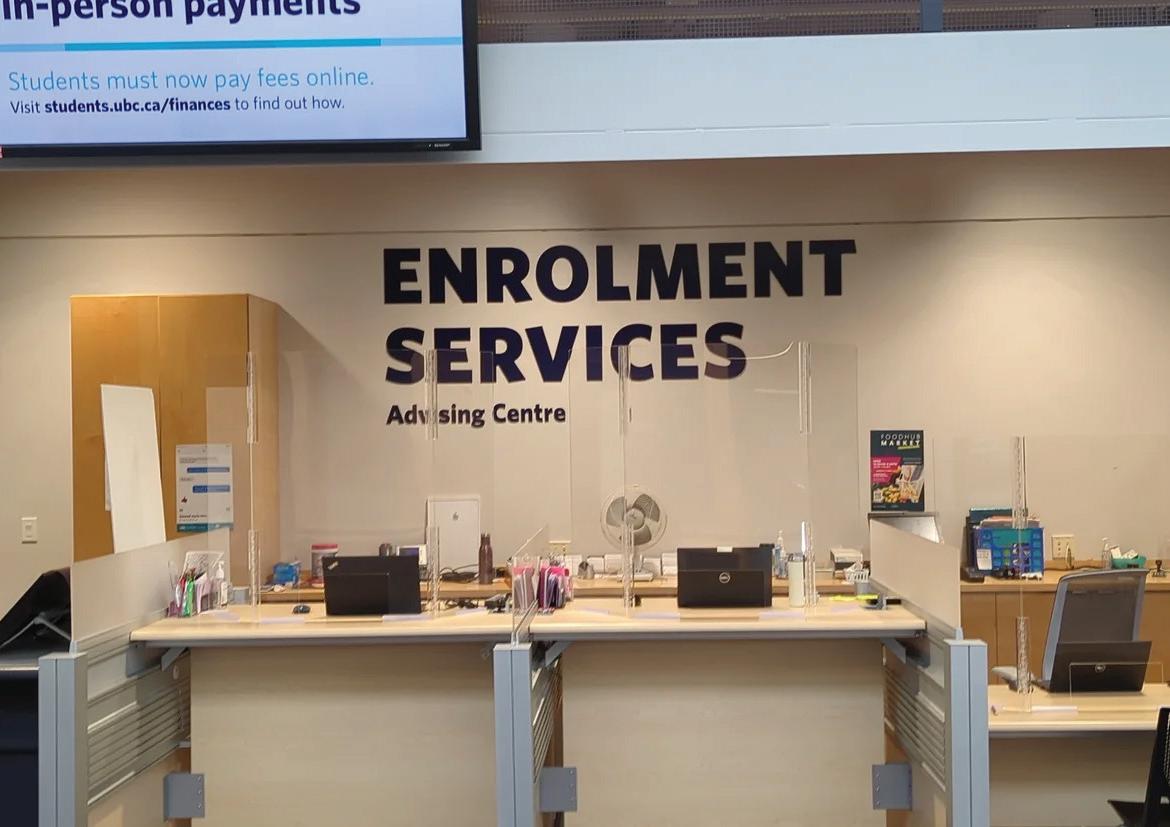
Five is the new four: UBC students are extending their undergrad degrees
words Nathan Bawaan photo Anthony Harrison
UBC students are taking longer to graduate. Students shared why they are extending their degree and why they would do it again.
Humour: 80 per cent of frat pledges are toddlers from Orchard Commons daycare
words Akanksha Pahargarh photo Isabella Falsetti
Reddit user populartvshowreference420 wrote a ten paragraph essay about child abuse we were too tired to read, so we just copied the end: “TL;DR They can’t even walk. How can they rush a frat??”
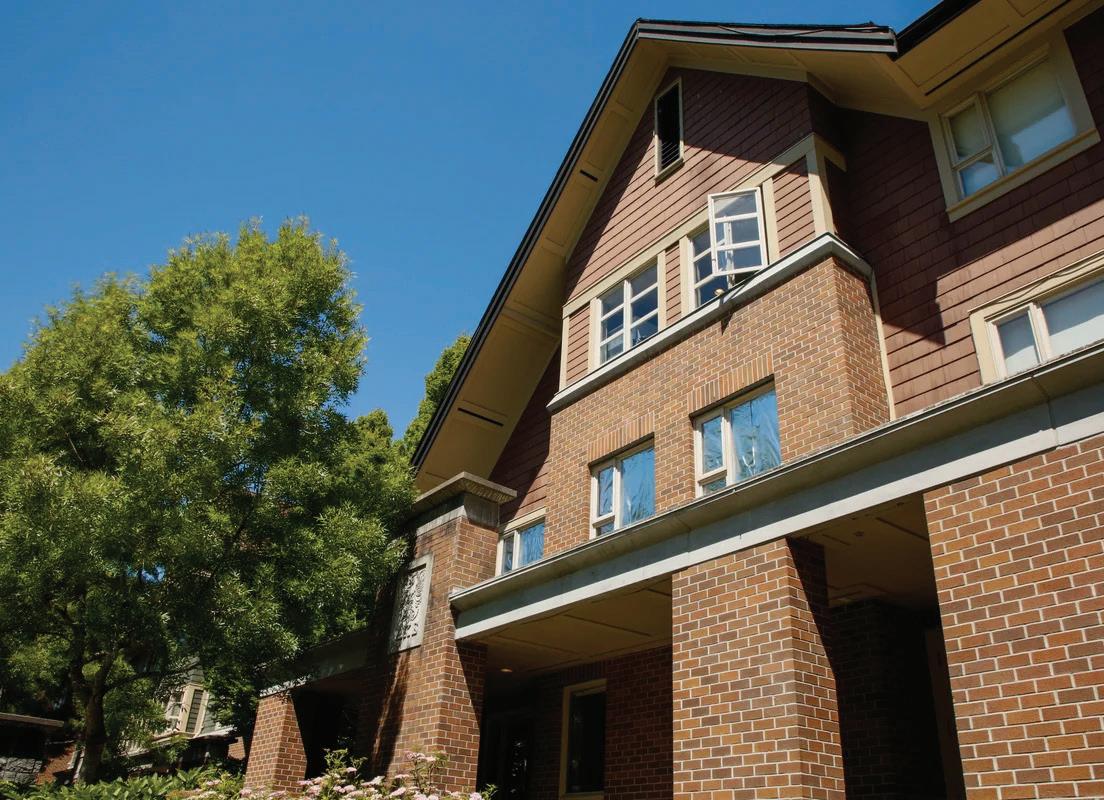
Oct. 11, 2023
UBC community members march in nationwide walkout for Palestine
words Aisha Chaudhry & Renée Rochefort photo Isa S. You
On October 25, UBC community members rallied in support of Palestine. A crowd formed in front of the Nest and chanted “free, free Palestine” and “occupation is crime.”

Oct. 26, 2023
APRIL 9, 2024 TUESDAY | YEAR IN REVIEW | 11
Oct. 31, 2023

Acknowledging climate justice in the EOAS department is a ‘good first step’ but is it enough?
words Lauren Kasowski
photo Amanda Yee
Advocates from within and outside environmental science programs are working towards aligning their curricula and research with climate justice.
Getting bogged down in a unique Pacific Spirit Park ecosystem
words Anabella McElroy
photo Zoe Wagner
On the eastern edge of Pacific Spirit Park lies xʷməm qʷe :m/Camosun Bog. This award-nominated piece explores the “crazy boggers” who have been coming together for decades to restore an ancient ecosystem.
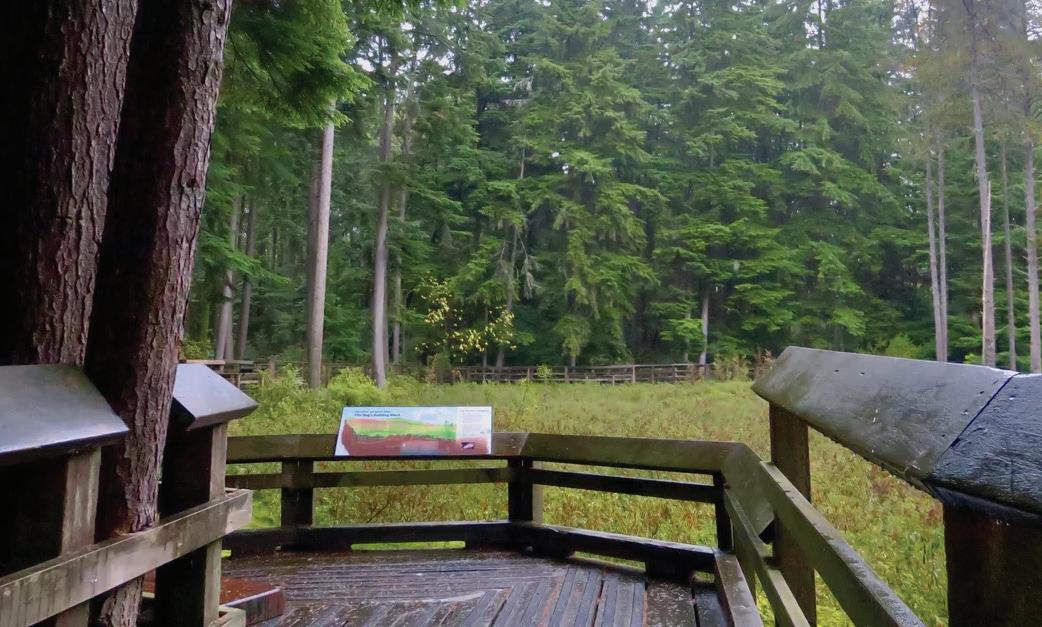
Oct. 31. 2023

Nov. 3, 2023
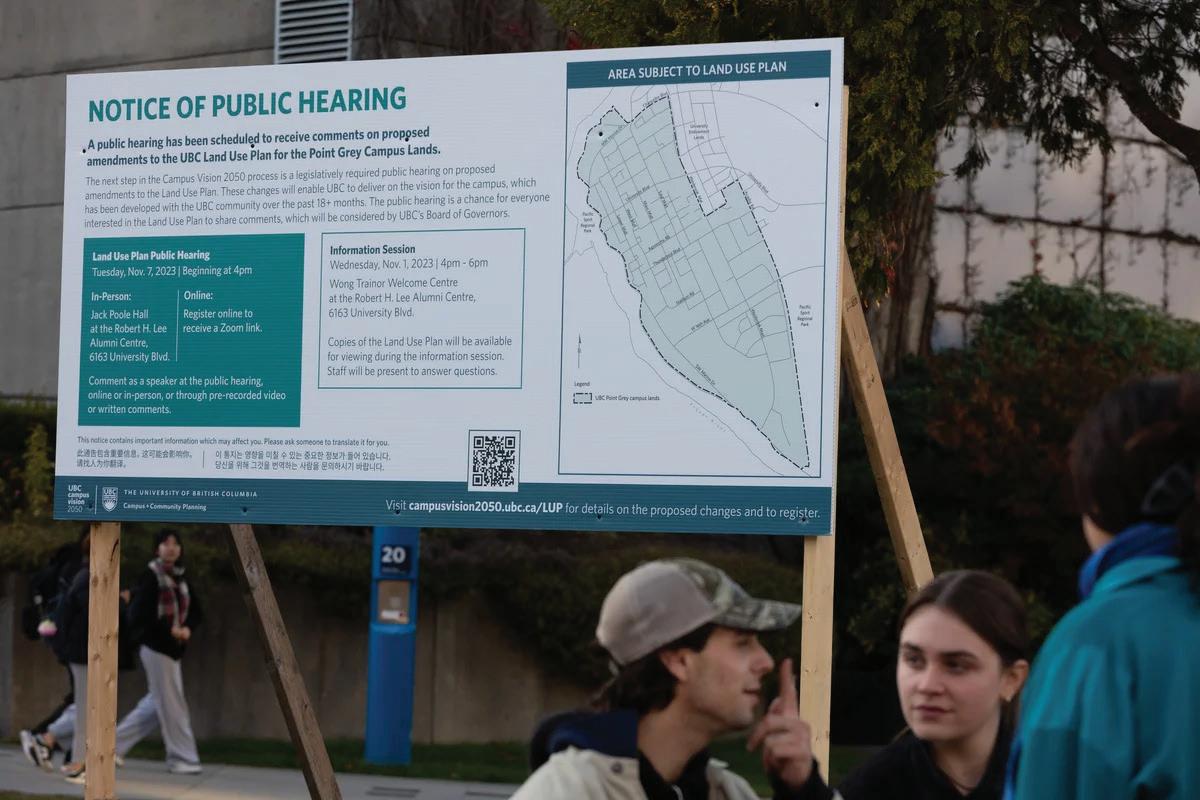
Land Use Plan update proposes to add 20,000 living spaces by 2050
words Josh Bradbury
photo Isa S. You
UBC campus will look a lot different in the coming decades as the Land Use Plan proposes adding 20,000 new living spaces, rezoning central campus and increasing density.
Opinion: Decolonize Palestine at UBC
words Hicham Safieddine
photo Isa S. You
Canada Research Chair in the History of the Modern Middle East Dr. Hicham Safieddine followed up on an open letter that received thousands of signatures from UBC academic community members to call attention to how anti-Palestinian racism permeates academic and political institutions.
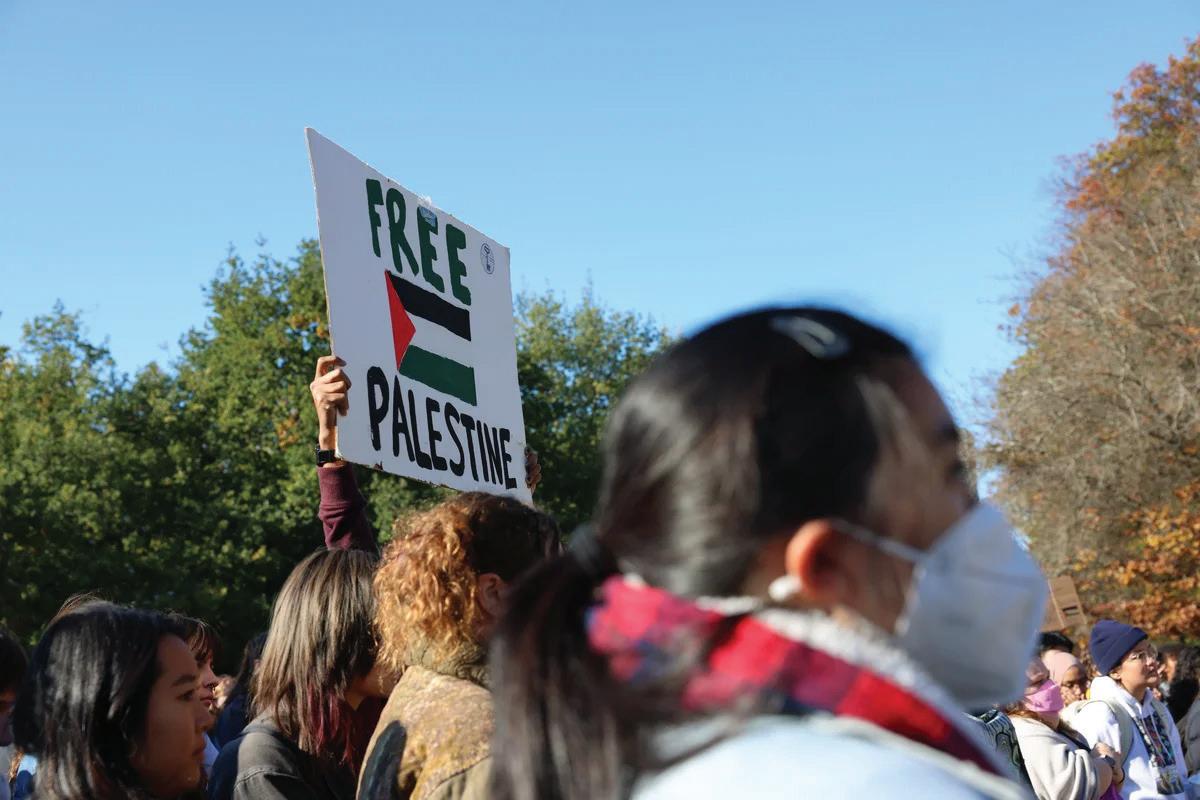
Nov. 1, 2023
Nov. 14, 2024

Thunderbirds win Hardy Cup with unbelievable last-second play
words Annaliese Gumboc
photo Isa S. You and Zoe Wagner
UBC pulled off an incredible last-minute comeback against the University of Alberta Golden Bears, claiming the Canada West title with a 28–27 victory at Thunderbird Stadium.
‘An act of great care and great love’: The path toward Yiddish at UBC
words Tova Gaster
photo Jocelyn Baker
In winter 2024, UBC will begin offering introductory Yiddish courses to students. What does the language mean to people, and why should it be taught?

Nov. 22, 2023
12 | YEAR IN REVIEW | TUESDAY APRIL 9, 2024
Dec. 11, 2023

The Ubyssey ’s foolproof study guide (no whimsy, we promise)
words Corwin Davidson illustration Jocelyn Baker
By Friday you should feel the dread building inside you. The all-encompassing fear: You’re not good enough. You’re not going to meet the expectations this cruel world has set on you. You know who else sometimes felt like they couldn’t succeed... WONKA.
Opinion: We reject John and Jane Doe’s attempt to suppress discussion of Israel-Palestine at UBC
words Vancouver Chapter of Independent Jewish Voices photo Isa S. You
Responding to a lawsuit alleging systemic antisemitism at three Canadian universities, including at UBC, the Vancouver Chapter of Independent Jewish Voices asked readers to critically reflect on what it viewed as the use of antisemitism in silencing political expression about Israel and Palestine.

Nov. 27, 2023
Dec. 15, 2023

Gut Feelings: Canada has one of the highest rates of IBD in the world. Why?
words Sophia Russo illustration Anya A Ameen
With 1.1% of the Canadian population predicted to be diagnosed with IBD by 2035, institutions need to start thinking about how to better serve this growing community.

Opinion: Stop Telling Queer South Asian Women to Come Out of the Closet
words Alyy Patel courtesy image
Sociology Ph.D. candidate Alyy Patel shared her research in an example of public scholarship, amplifying the insights she gathered in studying how Queer South Asian women choose to share and express their identities.

Dec. 19, 2023
Jan. 24, 2024
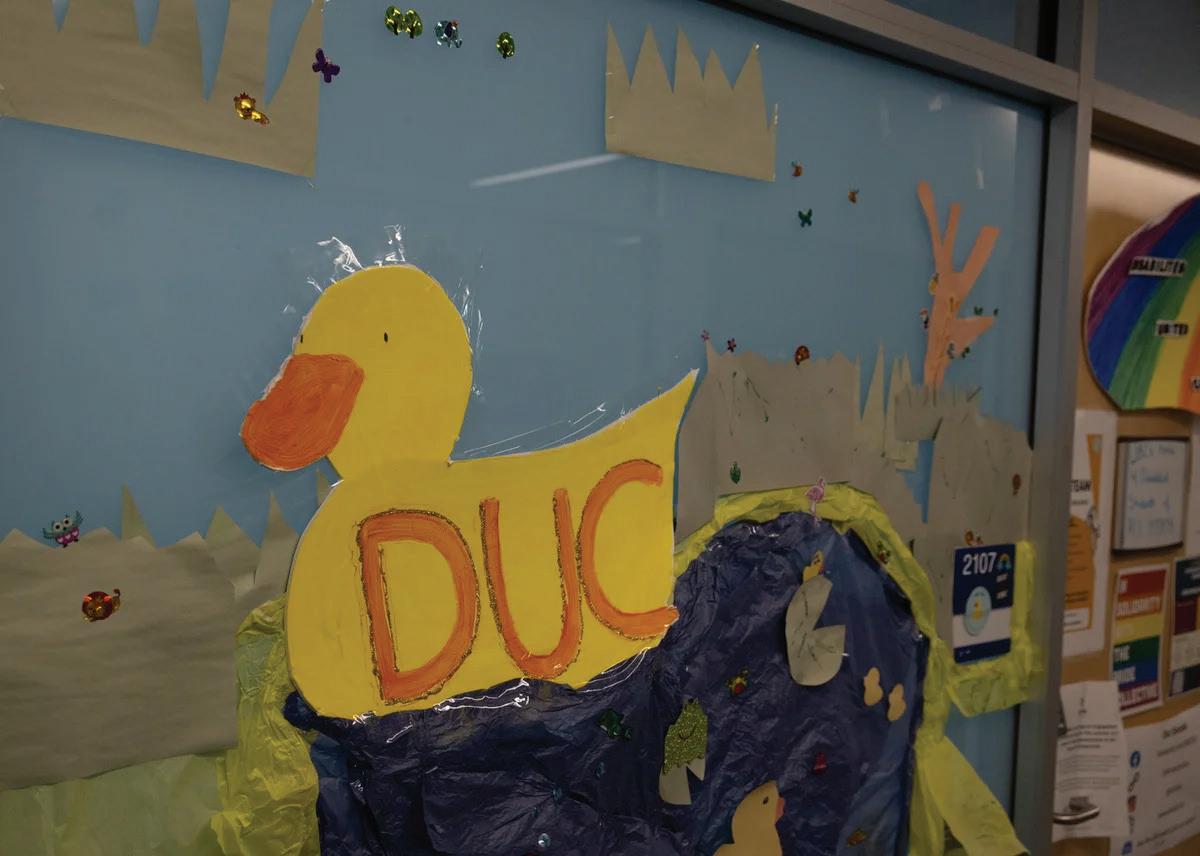
‘Disabled People are Owed Better’: UBC’s Disability Affinity Group unsatisfied with delays in Accessibility Plan
words Viyan Handley photo asmine Foong
As UBC prepares to create an Accessibility Plan, disability advocates on campus voice their concerns about the lack of inclusion and consultation of disabled voices.
Shoot your shot with UBC Shooting Sports
words Olivia DeFehr photo Mathew Ho
UBC Shooting Sports is a club promoting the use of firearms for sport and doing so in a safe and community-minded way.
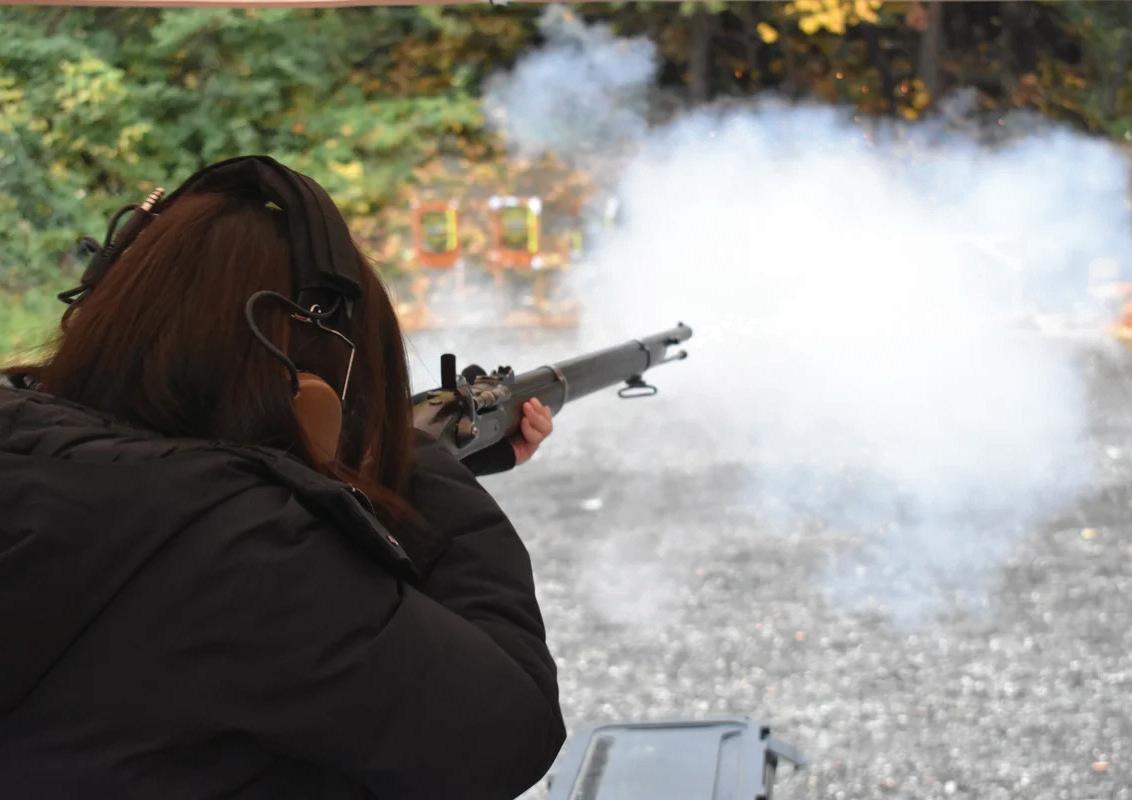
Feb. 5, 2024
APRIL 9, 2024 TUESDAY | YEAR IN REVIEW | 13
Feb. 7, 2024

Reading between the lines: Queerness and print culture in Vancouver
words Aisha Chaudhry & Isa S. You illustration Anya A Ameen
Through print media, 2SLGBTQIA+ people interacted with their community before the internet could connect them to each other, and some of these texts can be found at UBC.
Feb. 27, 2024
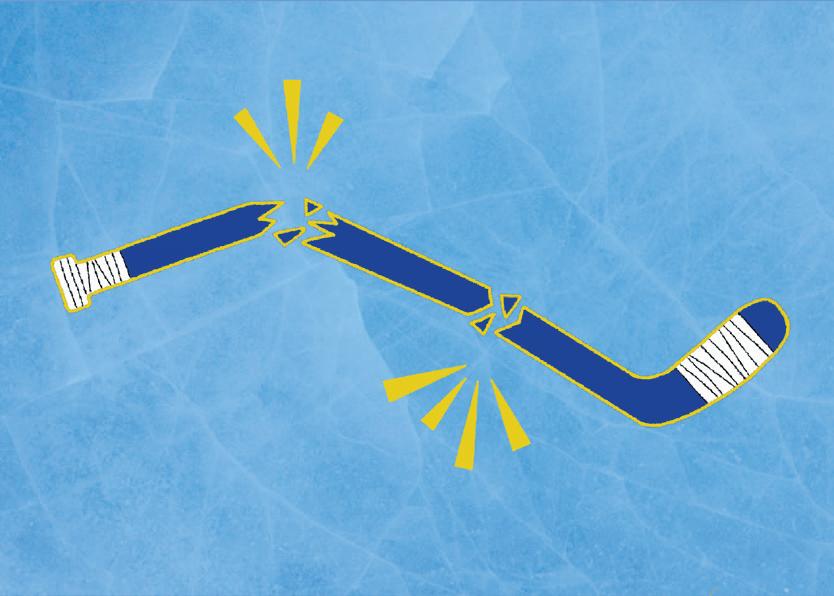
‘Doing the most that you can’: The invisible struggle after sport-induced injuries
words Caleb Peterson illustration Lauren Kasowski
The mental strife that comes with injury can often go unseen to those who don’t directly experience it — but that doesn’t make it any less real.

Crane and crowbars: Construction on campus
words Julian Forst photo Jerry Wong
Construction sites, towering cranes and clouds of dust are a constant part of UBC’s ever-shifting landscape. There are 30 projects in stages of development ranging from the application process to full-scale construction.

Feb. 26, 2024
The missing ingredient: How culturally-relevant food access supports student wellbeing
words Tova Gaster & Mahin E Alam photo by Zoe Wagner
Food traditions connect people to their homes, their histories and to each other. But many students said their options for affordable culturally-specific food are slim.

Feb. 27, 2024
Opinion: The 2024 ‘Greater Representation’ bylaws referendum is a power grab in disguise
words Esmé Decker photo Charlotte Alden
In the most read letter from the opinion section this year, AMS President Esmé Decker shared their views on the bylaw referendum that became one of the most contentious of this year’s AMS General Elections.
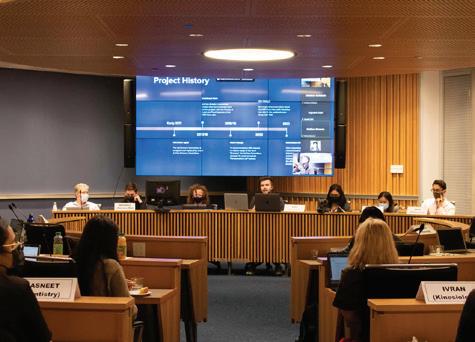
Feb. 28, 2024
Feb. 29, 2024

From the Cult: Dear AMS, please waste more money
words Elita Menezes photo Geoff Lister
Just say it. Seven hundred thirty eight-thousand seven hundred and sixty-six dollars. Now, say this: one million dollars. Doesn’t it feel like your quality of life as a student has improved because you didn’t have to say, like, nine whole words?
The origins of UBC’s Black student space
words Aicha Diaby & Olamide Olabiyi photo Isa S. You
Black Student Union Co-Presidents Aicha Diaby and Olamide Olabiyi recount the development of UBC’s Black Student Space.
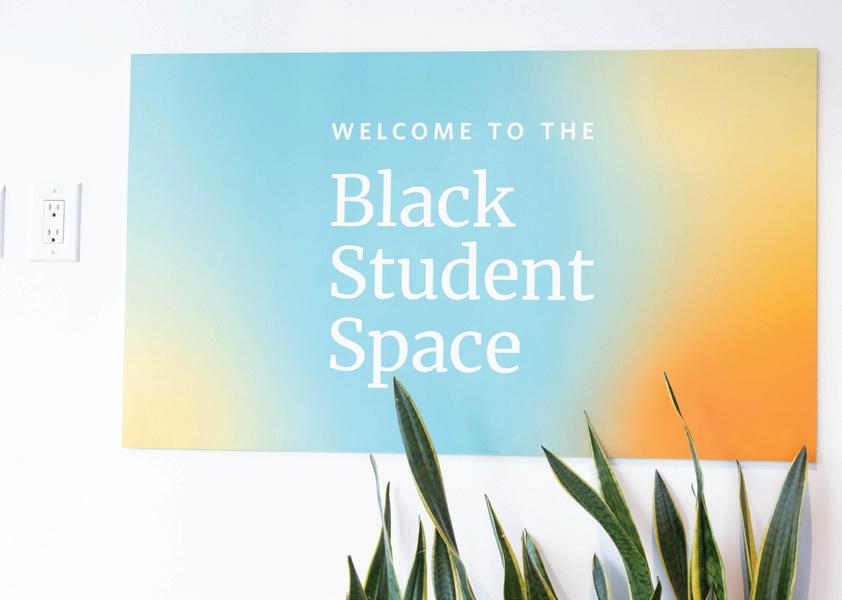
Mar. 4, 2024
14 | YEAR IN REVIEW | TUESDAY APRIL 9, 2024
Mar. 8, 2024

Moths to a flame, or moths to a flower? Nocturnal pollinators are more important than we think
words Alonso Daboub photo Eva Burghardt
As dusk turns into night, an LED lights up the sheet and the wait for fluttering begins.
What’s so funny? Why joke candidates run in AMS Elections
words Iman Janmohamed and Harry Sadleir
illustration Anya A Ameen
When students run in AMS Elections as jokes, it’s often not for laughs — it’s an expression of student discontent. Should these candidates win? What happens when they do?

Mar. 4, 2024
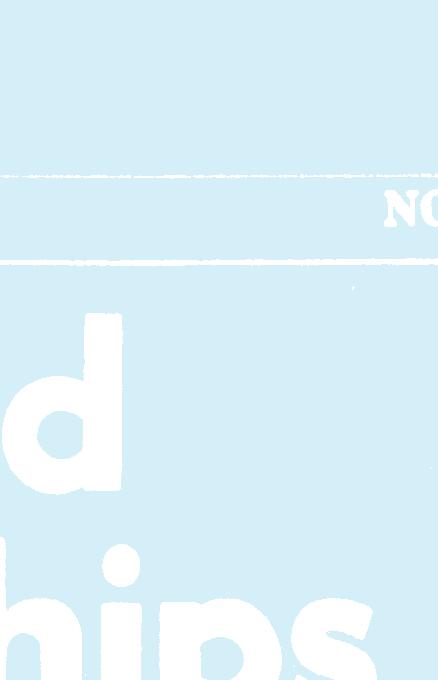
Mar. 18, 2024

Place Vanier has died — soon to be buried
words Caleb Peterson illustration courtesy UBC archives
Campus Vision 2050 will demolish parts of Place Vanier to build new residences to accommodate UBC’s growing population. What does that mean for the years of history in Vanier’s walls?
More than a game
words Hasti Amirsalari, Daniella Bawa, Aisha Chaudhry, Tommy Chung, Zara Khan & Olivia Vos
photo Ayla Cilliers
In these essays, writers reflect on the ways that board games — and the experiences and memories that come with playing them — have shaped who they are today.
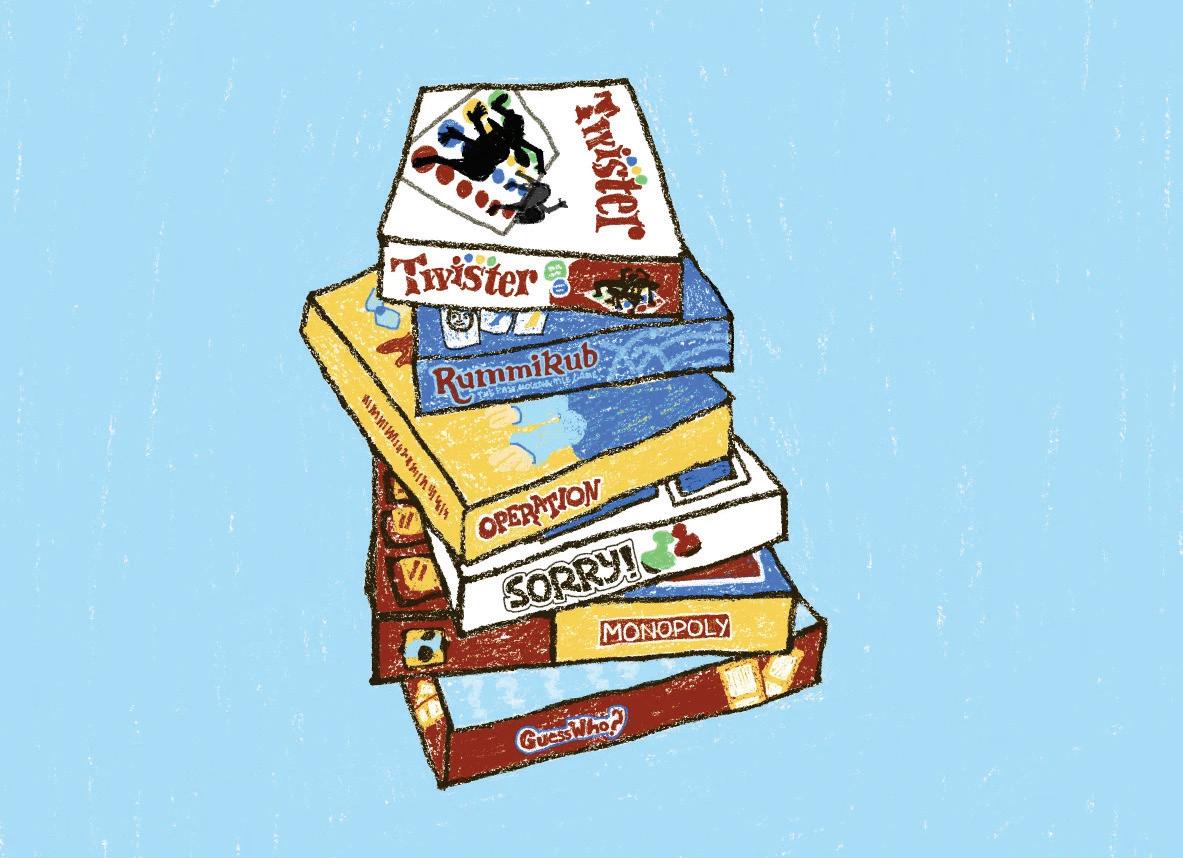
Mar. 15, 2024
Mar. 19, 2024

For the Queer hockey community, it’s more than just rainbow hockey tape
words Delaney Agodon
illustration Anya A Ameen
The NHL’s choices echo the most toxic parts of the sport’s culture, amplifying the voices that constantly say hockey is not for everyone.
Dr. Ife Adebara incorporates African languages in AI research
words Khushi Patil photo Sasha Singh
To train AI, algorithms learn from huge quantities of data. But, the internet is 52.1 per cent English. What happens to the languages and speakers left behind?
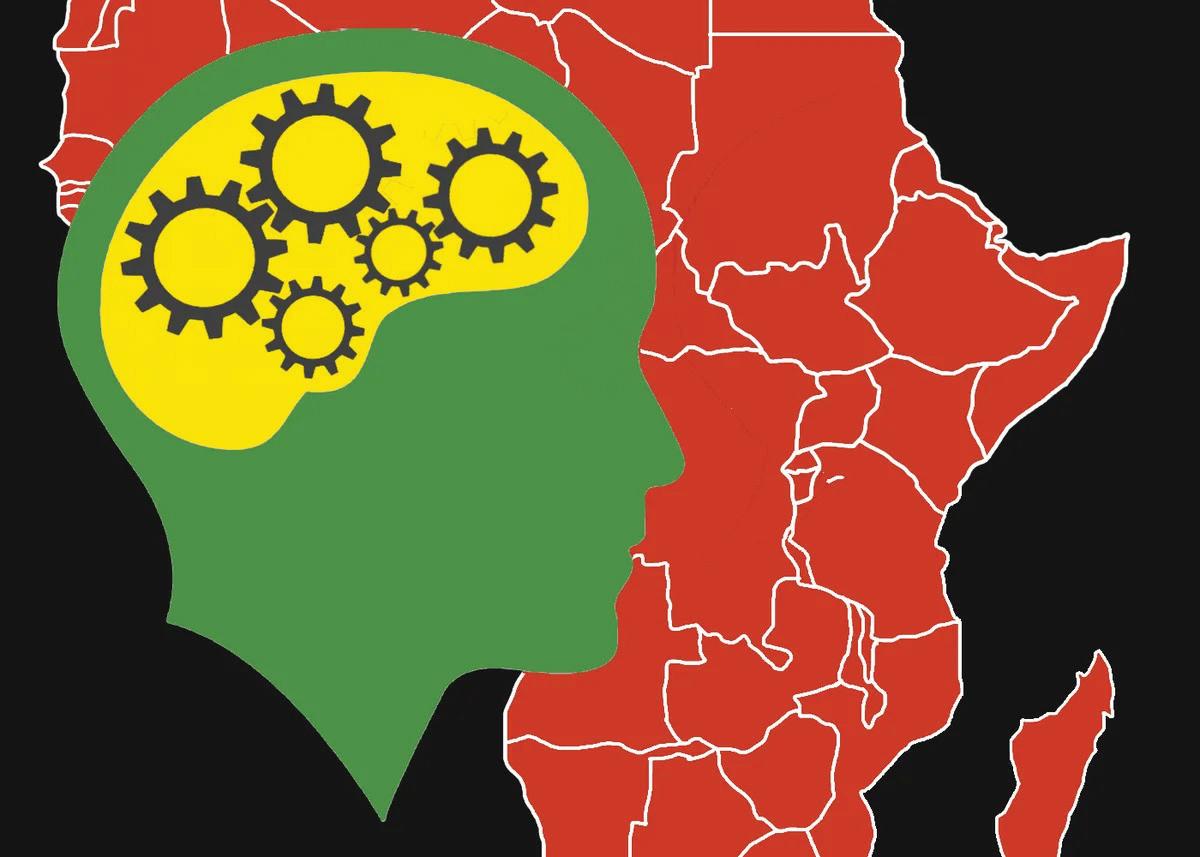
Mar. 15, 2024
APRIL 9, 2024 TUESDAY | YEAR IN REVIEW | 15

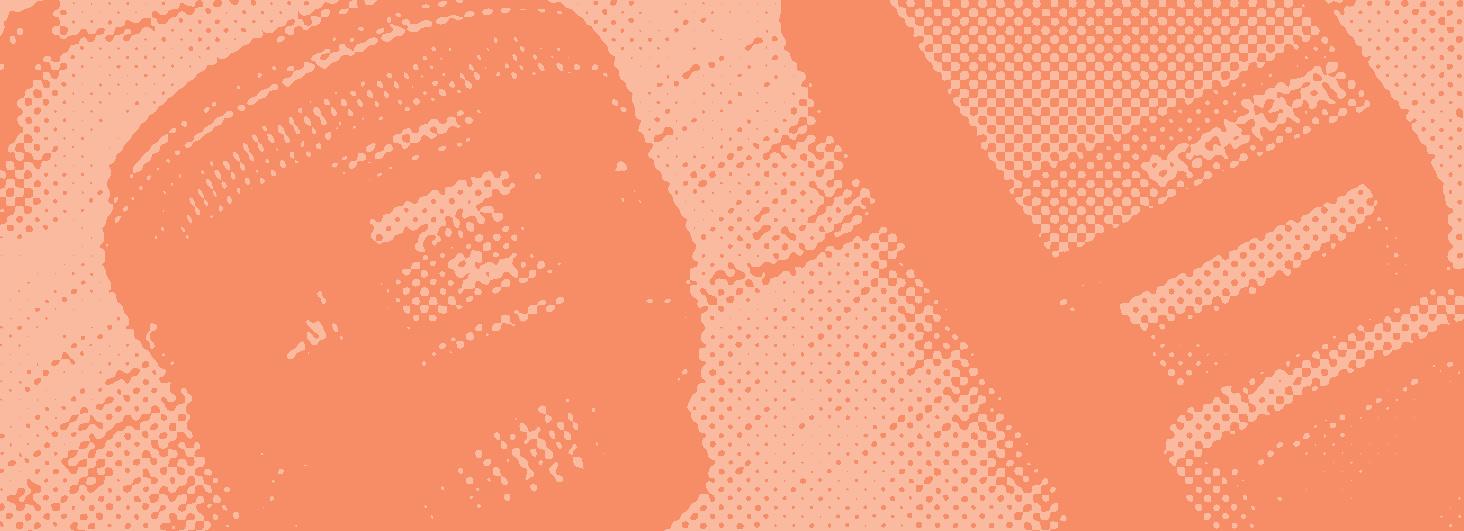
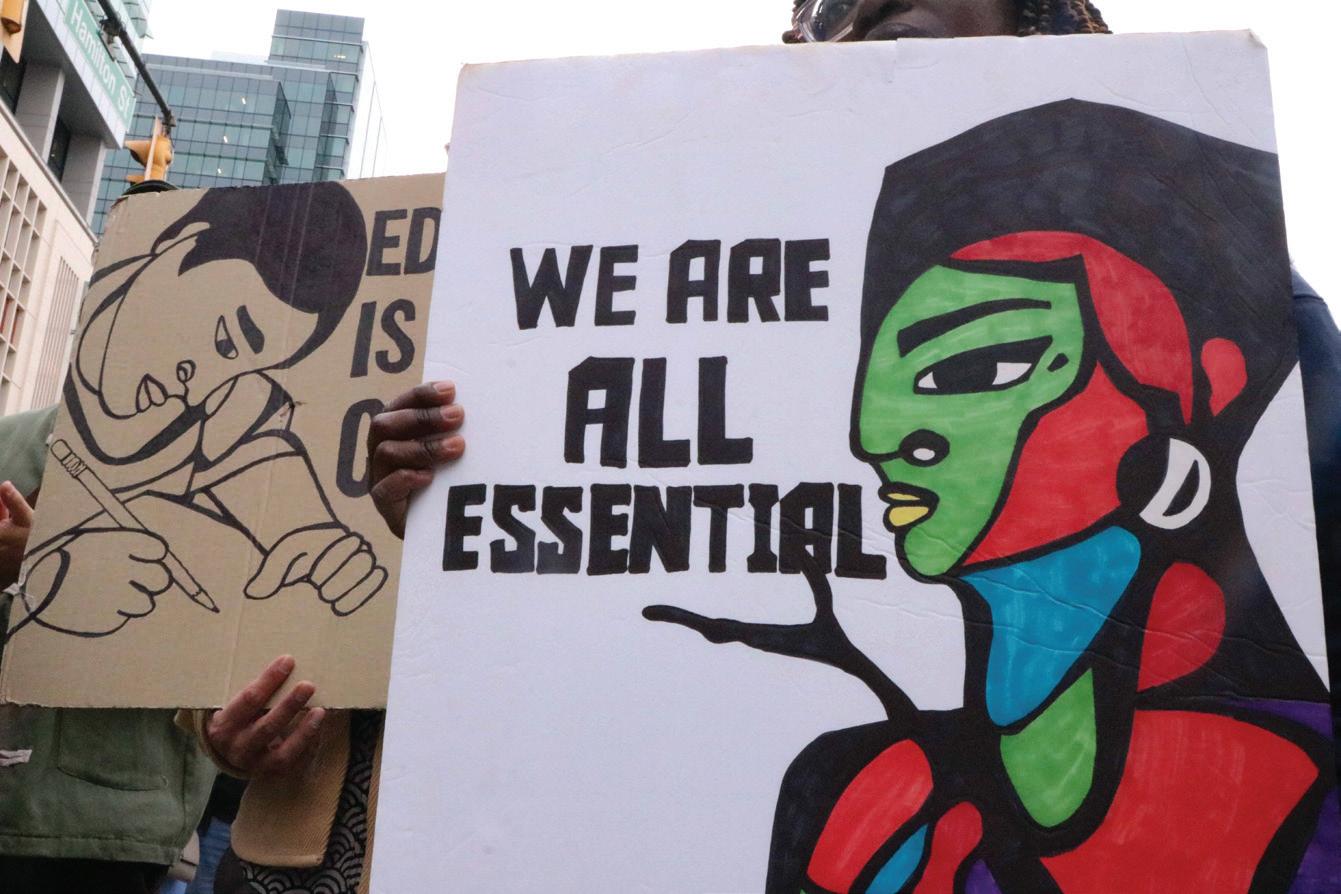
Sept.
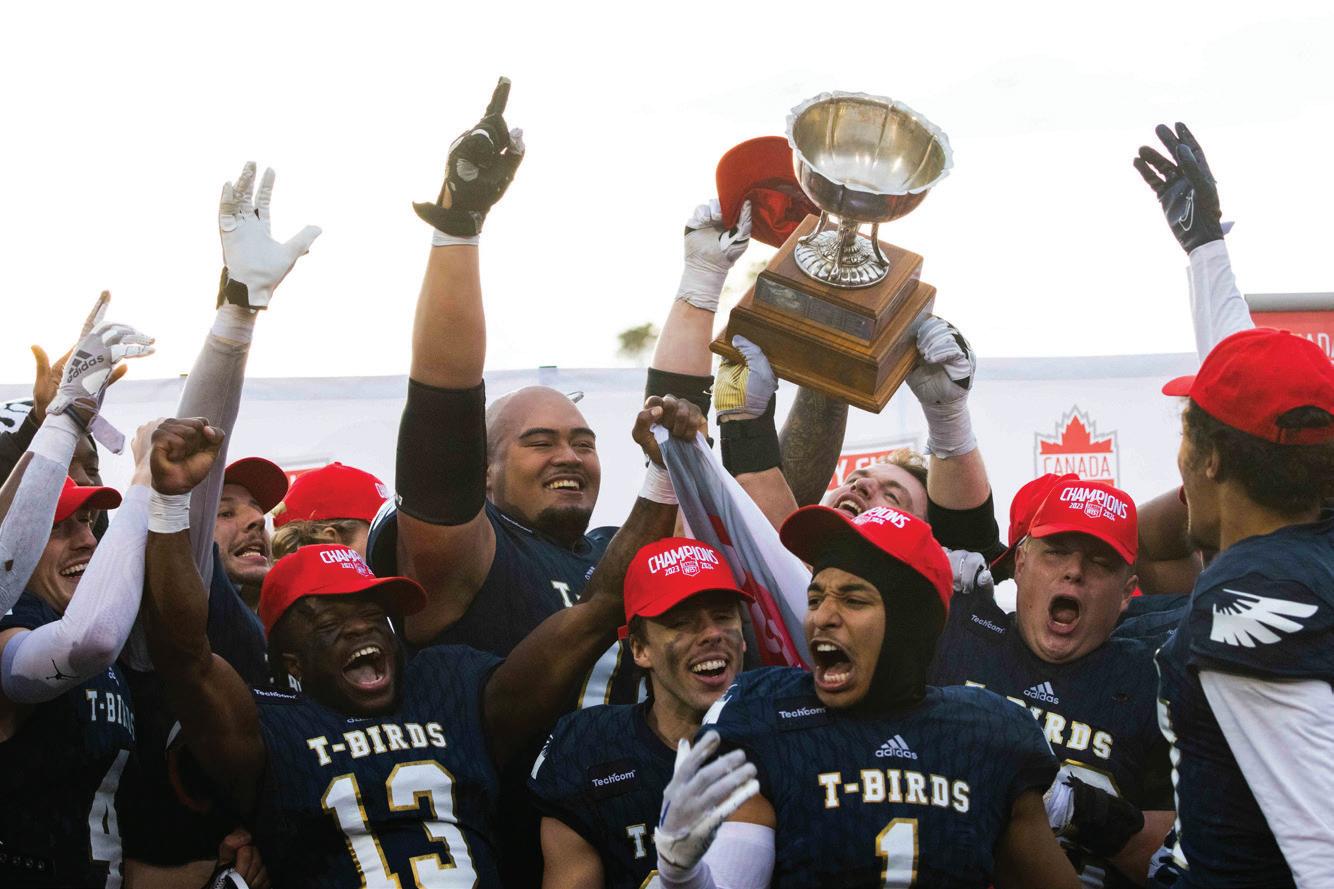


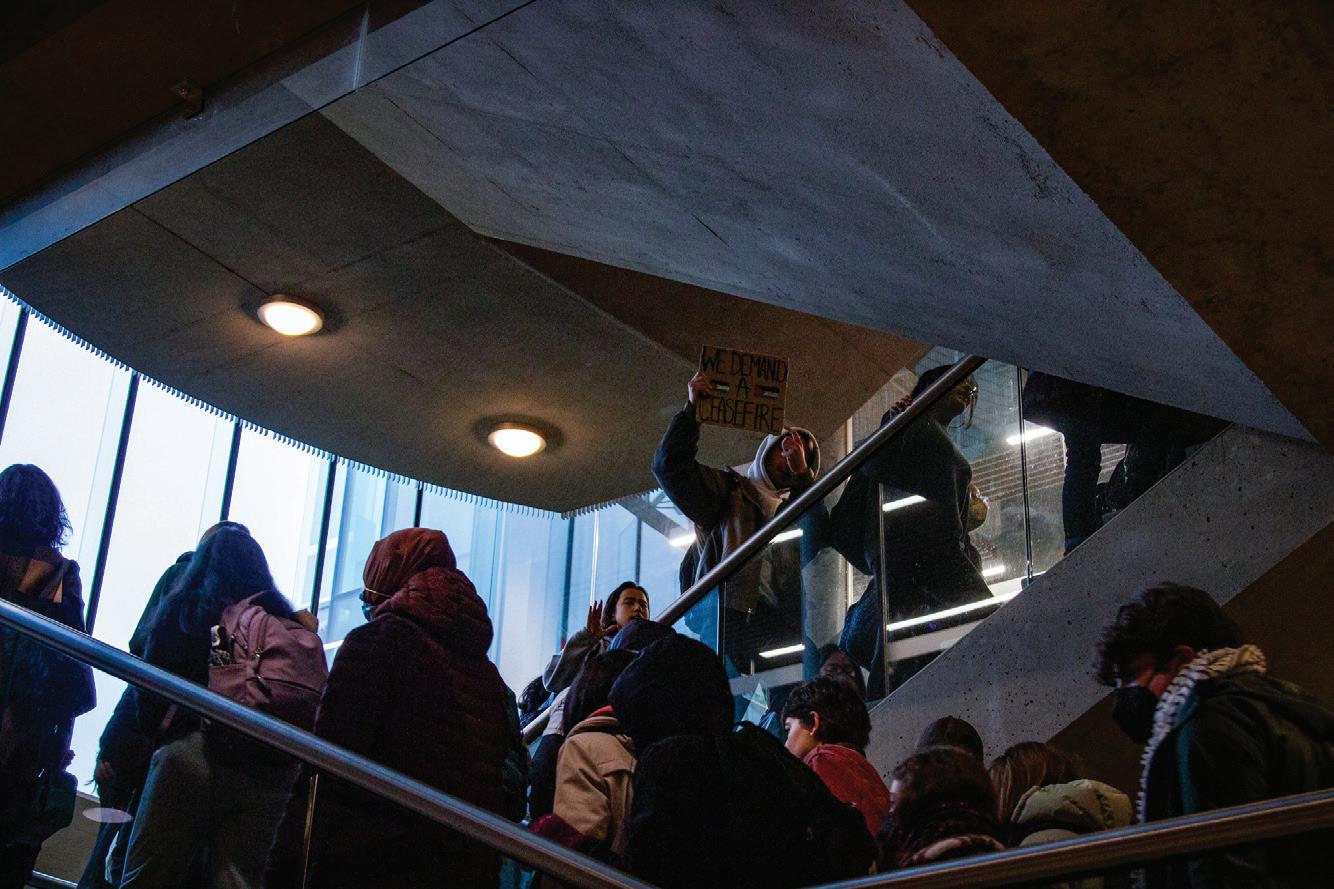
Nov. 9,
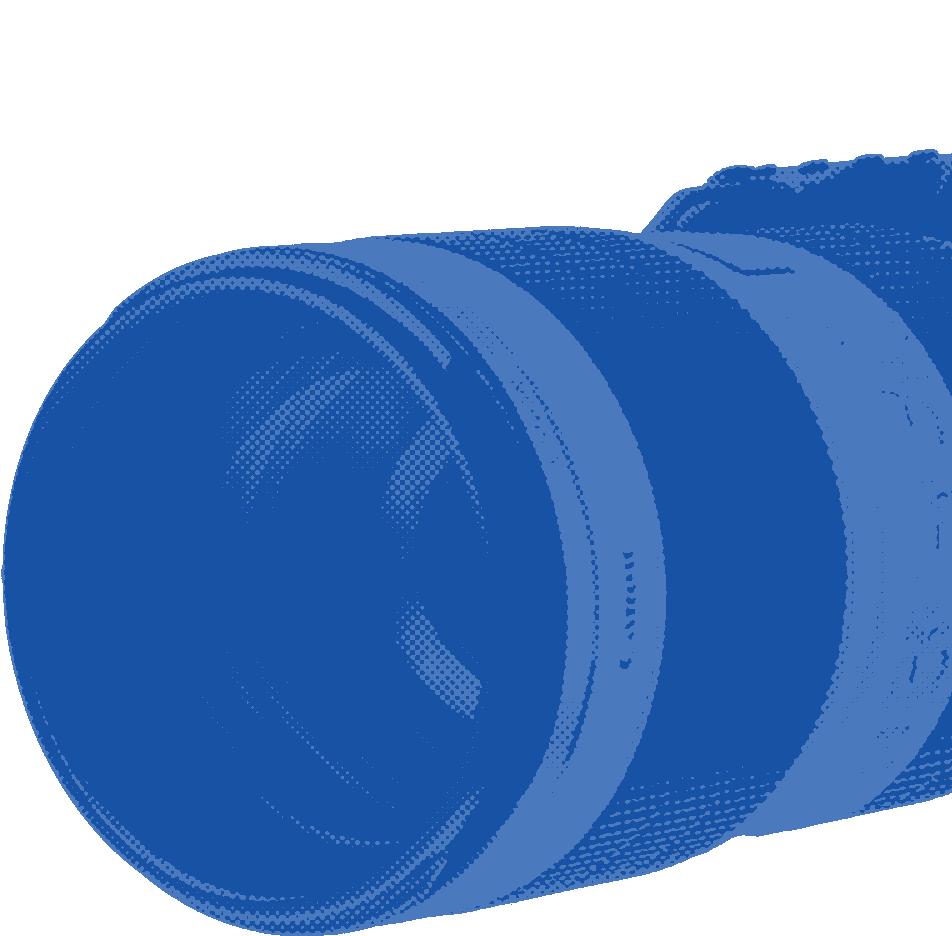
Jan. 23, 2024
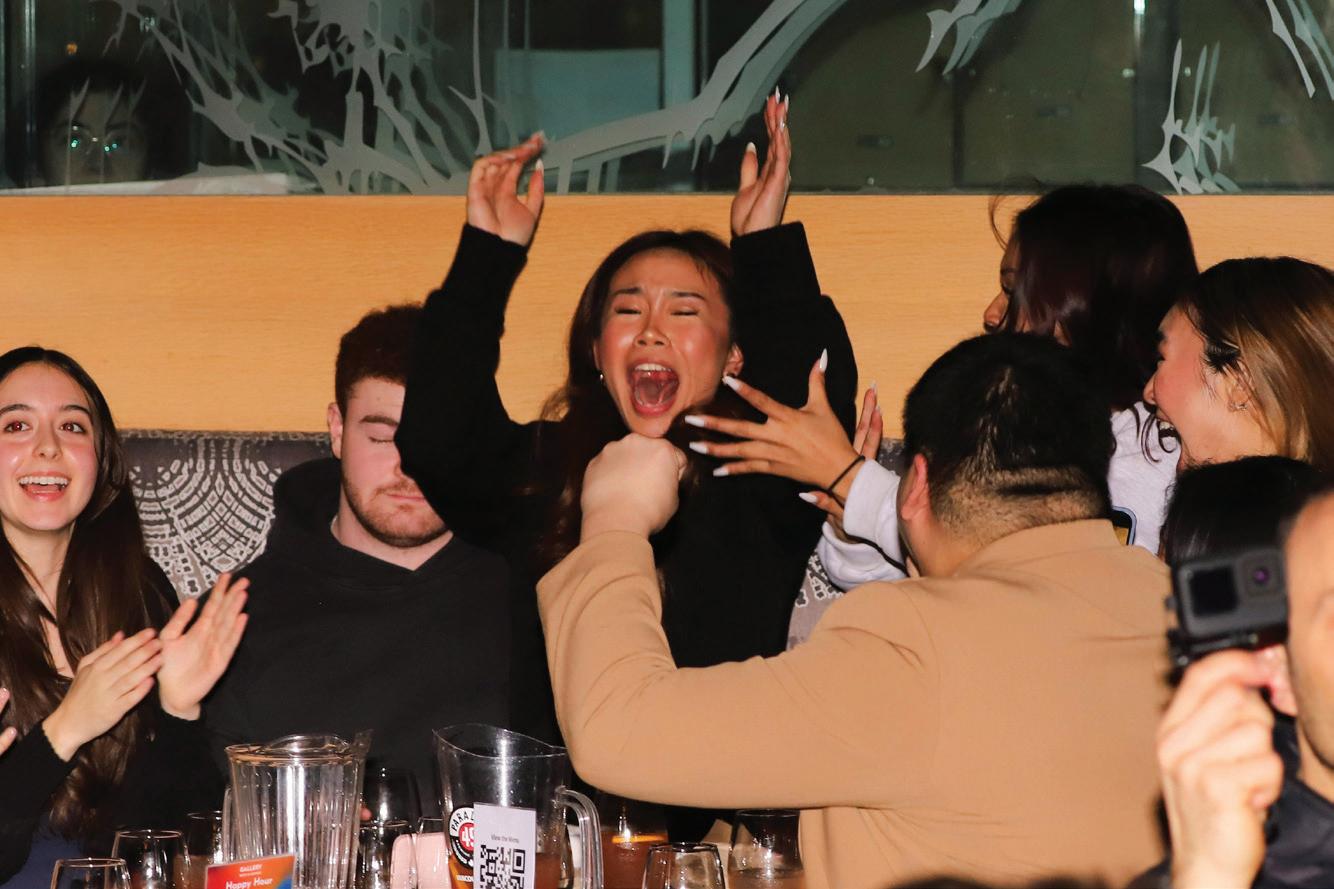
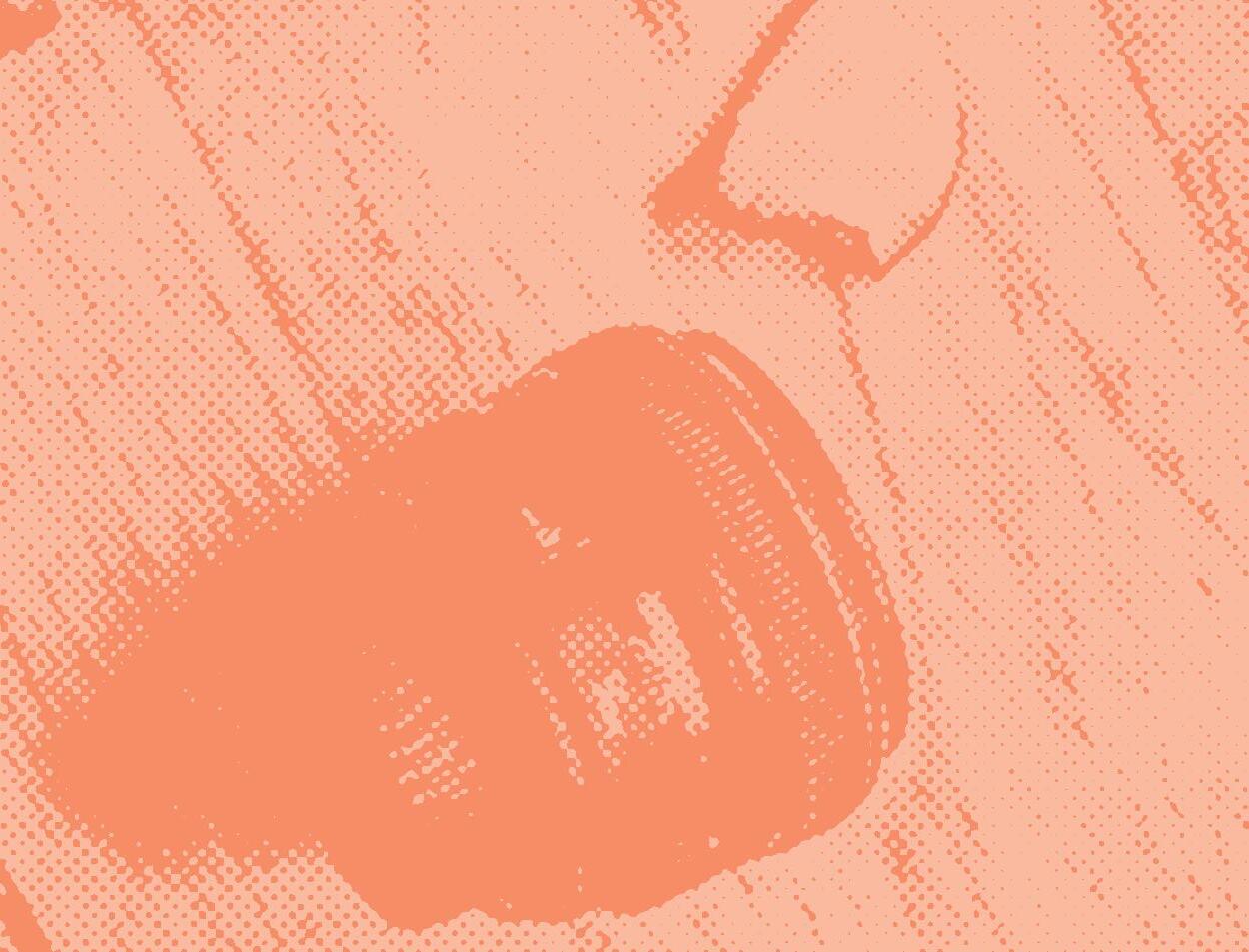
Mar.
16 | YEAR IN REVIEW | TUESDAY APRIL 9, 2024
Zoe Wagner Migrant Students United at UBC rallies alongside other migrant rights advocates in front of the Canada Border Services Agency building.
17, 2023
Mahin E Alam Walkout crowd in support of Palestine moves to the President’s Office in Koerner Library.
2023
Isa S. You Thunderbirds celebrate Hardy Cup win thanks to unbelievable last-second play. Nov. 11, 2023
Lauren Kasowski With heavy snowfall and cancelled classes, students gather for The Calendar’s Main Mall snowball fight.
Jerry Wong Amy Liao wins VP administration race in the 2024 AMS Elections. This year’s AMS Elections saw the third highest voter turnout in AMS history at 21.1 per cent.
8, 2024

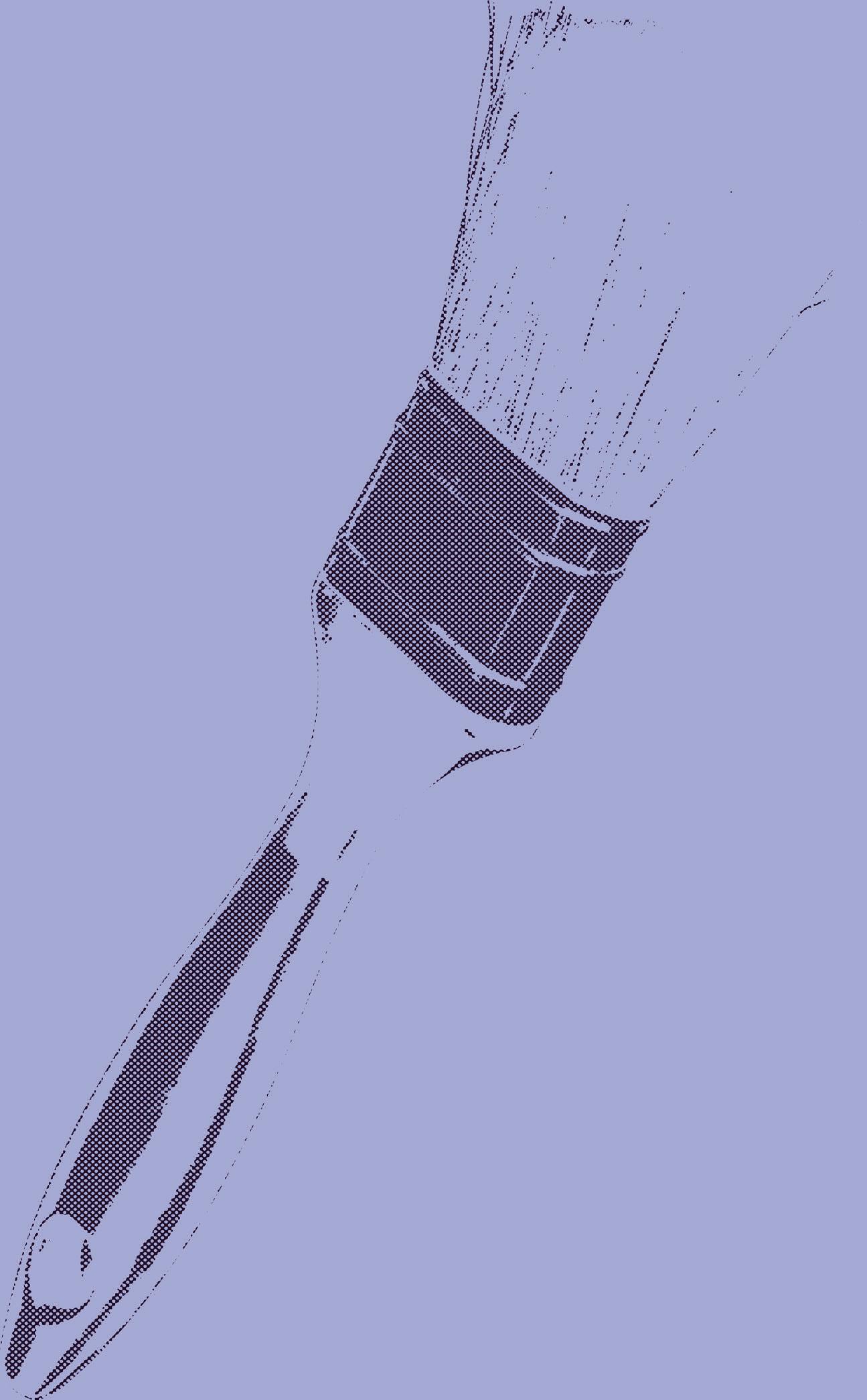
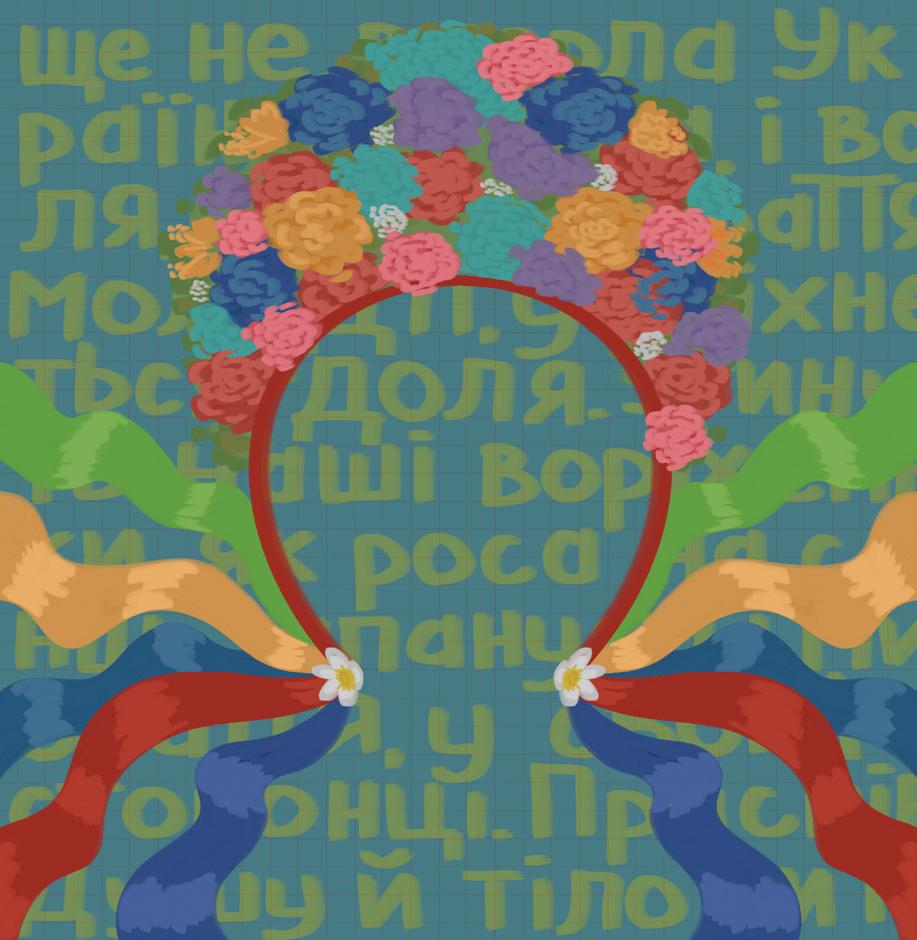

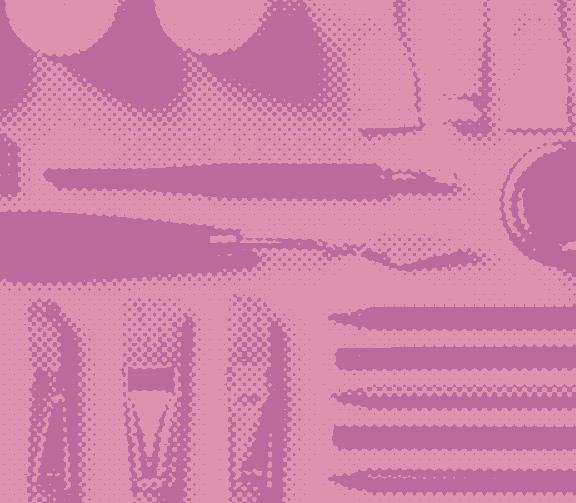
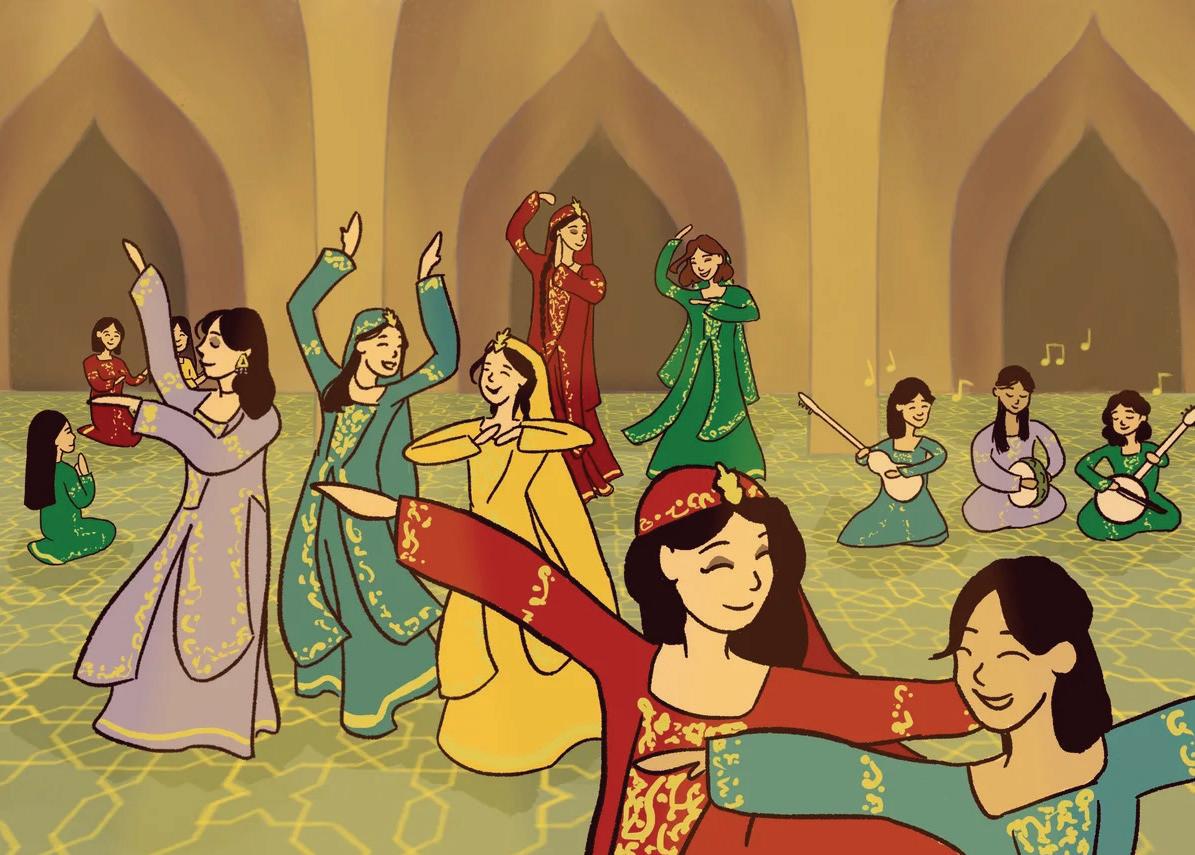

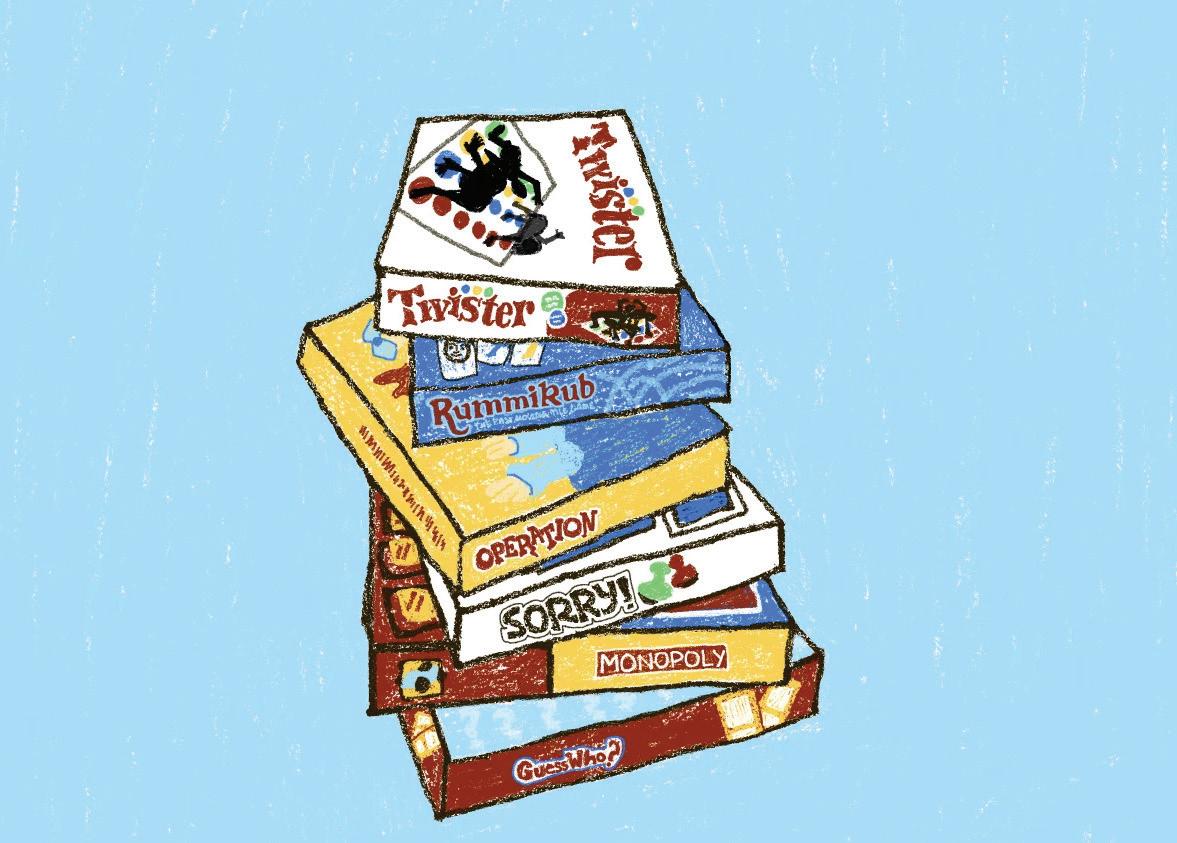

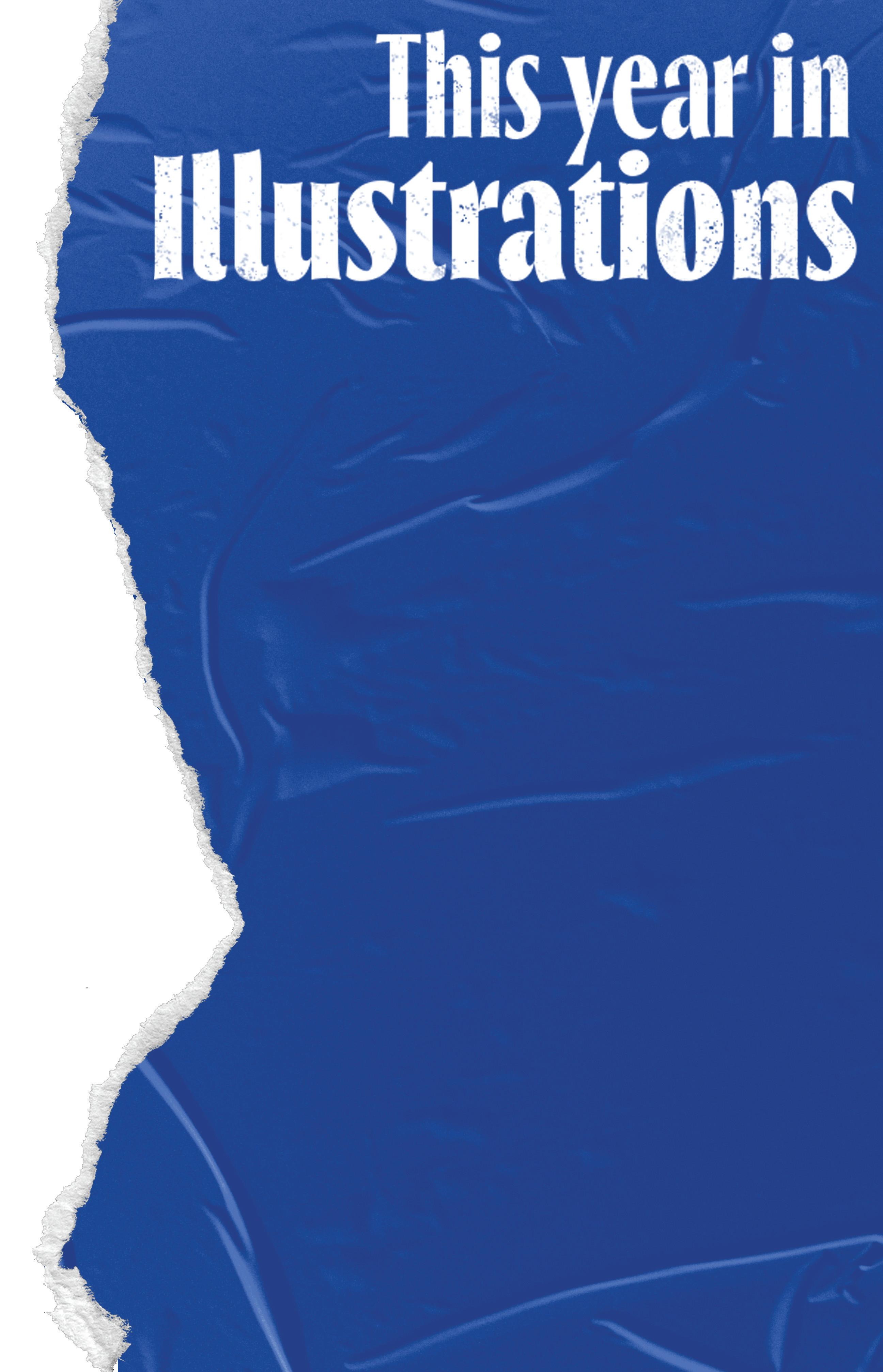
APRIL 9, 2024 TUESDAY | YEAR IN REVIEW | 17
Ayla Cilliers More than a game Mar. 15, 2024
Fiona Sjaus (Photos courtesy UBC Jazz Club) UBC Jazz Club breaks down a daunting genre Jan. 23, 2024
Bessie Guo Midwifery research bridges equity gaps in birthing care Oct. 31, 2023
Erika Zahorszky UBC Persian Club publishes first edition of peer-reviewed journal Dec. 1, 2023
Emilija Vītols Harrison New Ukrainian language course caters to a “multilevel, multicultural, multinational” audience Aug. 8, 2023
Teck’s ‘Copper and Health’ project isn’t as clean as it looks
Tova Gaster Science Editor
Tova Gaster is a fourth-year history and environmental geography student and the science editor for The Ubyssey.
In March 2022, UBC and mining company Teck Resources Ltd. announced a research partnership to install copper coatings on hightouch surfaces in applied science buildings. The project’s stated purpose is to reduce the spread of germs using copper’s antibacterial properties.
While antibacterial copper has useful applications in high-health risk areas like hospitals, the project also gives Teck an opportunity to distract from recent headlines and clean up its public image, which has been tarnished by several high-profile human rights and environmental violations.
After years of pollution from Teck coal mines, the trout population in BC’s Elk Valley watershed — which is deeply important to the Ktunaxa First Nation — is nearing total collapse. An investigation by The Narwhal also revealed that Teck and the B.C. government lobbied the federal government against investigating Teck’s water pollution, which impacts water safety and public health on both sides of the Canada/United States border. In 2024, Teck sold most of its shares in the mines to another transnational mining company, leaving it unclear who will clean up the mess.
Teck also invests heavily in research, education and development at UBC. While the Copper and Health project is relatively innocuous on its own, it’s part of a disturbing trend: fossil fuel corporations like Teck donate hundreds of thousands of dollars to UBC research and operations each year.
UBC declared a climate emergency in 2020 but has so far failed to decisively interrogate its own relationships with the companies that drive it.
To address the climate crisis, we must transition away from fossil fuels and towards equitable and democratic renewable energy systems. To do so requires eroding the social and economic power of the fossil fuel industry, which by nature will continue business as usual to maximize profit margins even as ecosystems collapse around us.
When companies like Teck donate to institutions like UBC, they get a boost to their public images — and Teck has been upfront that the UBC Copper and Health project is a PR move. Its website states the project goals include “highlighting Teck’s involvement in creating safer public spaces.”
According to researchers, the Copper and Health project aims to decrease bacterial transmission in high-risk areas such as hospitals, where sterility can be the difference between life and death. This is an important mission.
The fact that Teck is leveraging
its connections to UBC to explicitly brand itself as a public health hero should raise questions, especially when companies like Teck consistently act as the biggest obstacles to climate action.
Teck profits from mining fossil fuels and metals, including coal and bitumen. Its sector pollutes waterways, destroys ecosystems and raises global temperatures to increase the frequency and costs of devastating disasters each year.
According to a 2022 Health Canada report, the climate crisis represents a direct threat to health and wellness — risks which hurt BIPOC, disabled people and other marginalized communities more than others.
While Teck is increasingly transitioning its dirty coal portfolio into copper mining— a key component of batteries for renewable energy storage — that transition remains slow.
In recent years, Teck has begun to invest heavily in metals mining. It owns four major copper mines — a demonstrable incentive to position Teck Copper as a symbol for health and cleanliness, a more marketable narrative than its ongoing history of pollution and human rights violations.
Teck’s copper mines have also been plagued by ecological and human rights issues. The Quebrada Blanca Phase 2 project in Northern Chile was fined $1.2 million in 2019 for environmental violations, and in 2021 regulators served the company with 8 different environment-related legal charges. This followed years of condemnation for poor labour practices and legal opposition to the mine expansion from the Indigenous Ollagüe people, who assert they were not consulted in its approval process.
This is the same copper which coats UBC door handles in the name of public health.
The Copper and Health project is only the latest development in a long partnership between Teck and UBC. Beyond funding research, Teck was one of the major corporate donors to UBC’s 2008–2015 “Start an Evolution” fundraising campaign. It also funds scholarships, including the recently-announced $2 million Don Lindsay Teck Award in Mining Engineering, designed to attract engineering students to the company.
Mining research and policy impacts labour rights, Indigenous sovereignty and global environmental health. Research and policymaking around mining should not be left to those who stand directly to profit from it. U
This is an opinion article. It reflects only the author’s views and does not reflect the views of The Ubyssey as a whole. Contribute to the conversation by sending a letter to ubyssey.ca/pages/submit-an-opinion

Universities need to move beyond ‘diversity crisis’ approaches to equity planning. Here’s how
Arig al Shaibah Contributor
This article was originally published in The Conversation on March 31.
Dr. Arig al Shaibah is the associate vice-president, equity & inclusion and an honorary associate professor of Educational Studies at UBC. Her areas of academic and professional interest and experience relate to student success, EDI, intergroup relations, race and racism, leadership and organizational theory for equity in higher education.
The higher education system plays an essential role in advancing sustainable development goals. These range from providing knowledge and innovative solutions to educating and equipping generations to navigate the future.
Universities that meaningfully integrate equity, diversity and inclusion (EDI) into their teaching, research, service and leadership stand to improve their impact on increasingly complex social, economic and environmental challenges. This matters enormously in today’s diverse and globally connected society.
I have worked as a senior equity leader in four Canadian public universities in the last two decades. I am concerned about two key aspects surrounding taking action on EDI: ensuring senior equity leaders have sufficient authority to implement changes, and shifting away from a “diversity crisis mode” of planning.
Despite decades of efforts to advance EDI in universities, some scholars have questioned the pace and impact of progress to date.
Some recent advances in equitably hiring faculty have been due to leveraging human rights legislation. For example, there was a 2016 Canadian Human Rights Settlement Agreement and subsequent 2019 addendum requiring equitable representation in the Canada Research Chair program. This has had a significant impact on hiring a broader gendered and racialized diversity of research chairs between 2016 and 2022.
Provincial human rights code provisions have enabled universities to accelerate recruiting scholars who have been underrepresented due to systemic inequities.
These interventions reflect compliance with legislation. But they don’t affect culture and system changes. These are needed to eliminate biases and barriers that reproduce inequities.
Short-sighted solutions focused on compliance are due, in part, to a cyclical diversity crisis model of
planning. Universities seem perpetually trapped in this.
A reactive mode of planning starts with an incident of hate-motivated violence or another watershed event. Such an event typically reveals anew historical or contemporary systemic inequities.
These moments can come in the aftermath of events with a global reach — like the movement to meaningfully address anti-Black racism after the killing of George Floyd in 2020. But most of these moments arise from local contexts and campus events, like a string of departures of racialized faculty members sparking calls for improving support for minoritized scholars.
What follows such moments are often reactionary and hastily developed institutional statements of commitments — and largely symbolic responses.
These include some spontaneous institutional efforts that soon fall by the wayside due to their isolated and ill-conceived nature. These efforts, even if well-intentioned, have a demoralizing effect on campus communities. They also contribute to disillusionment among a diversity of students, faculty and staff about the university’s commitment and capacity to meaningfully advance EDI.
That said, with courageous leadership and institutional readiness, these peak events can also catalyze important and lasting responses.
In 2022, I authored a report on report on building race-conscious institutions for Universities Canada. The guide offers a framework focused on:
(1) Educational access and employment equity;
(2) governance and accountability;
(3) academic and educational content and learning context; and
(4) interpersonal and intergroup relations and climate.
It emphasizes the importance of having a senior equity leader with specialized knowledge and expertise to lead EDI strategic priorities. It also discusses the importance of leaders’ authority and span of control to foster a university-wide culture of accountability and ownership.
In 2019, Universities Canada surveyed its 96 members about their EDI administrative structures. It revealed how universities rely on three typical organizational forms to implement equity, diversity and inclusion initiatives:
The collaborative model: an equity lead represents a “one-person” shop with no office, staff or budget; the unit-based model: an equity leader oversees a core EDI office team with some administrative support
staff as well as program specialists and budget; and the portfolio divisional model: a senior equity leader oversees an EDI office team and a range of other related or adjacent units and staff teams directly within their authority and budget. This model is associated with a larger budget. It also offers the greatest opportunities for direct collaboration with other senior administrators and for a direct relationship with other units to better enable the pursuit of institution-wide goals.
In the last five years, there has been a proliferation of senior equity roles in universities.
An internet search I conducted of the organizational structures of the U15 Group of Canadian Research Universities revealed that 13 had senior administrative officers with titles or mandates explicitly referencing EDI. They report to a president, provost, deputy provost and/or vice-president. Only five of these roles existed in 2019, at the time of the Universities Canada survey.
Among the 13 current senior equity roles, three have a portfolio divisional model and report to the president (and as such are cabinet-level roles). The other 10 senior equity roles reflect a unit-based model. These staff are vice-provosts, associate-provosts and/or associate vice-presidents.
Nearly 70 per cent of these roles came into existence after 2019. Two of the three cabinet-level roles were inaugurated in the last two years.
A further scan reveals that, since 2019, at least five other non-U15 schools have also recruited cabinet-level roles overseeing a portfolio of units. This suggests a possible promising trend towards greater authority and span of control for senior equity leads.
However organizational structures evolve, it will be essential to ensure senior equity leaders are sufficiently influential across academic and administrative portfolios — meaning it’s important they report both to provosts and presidents.
A shift is needed away from reactive diversity crisis-driven planning to proactive mission-driven EDI planning.
Universities must not only invest in dedicated senior equity leader roles with specialized knowledge and expertise. They must also ensure equity roles are resourced and empowered for optimal success. U
This is an opinion article. It reflects only the author’s views and does not reflect the views of The Ubyssey as a whole.
EDITOR SPENCER IZEN OPINION JANUARY 23, 2023 TUESDAY 18 OPINION //
OPINION // PATRICK GILLIN / THE UBYSSEY
Fareed Shittu was late to the game, but he isn’t leaving basketball anytime soon
Zoe Wagner Senior Staff Writer
If you met Fareed Shittu, a forward and wing for the UBC men’s basketball team, at the beginning of grade 10, you may be surprised to meet a serious soccer player. He started playing club soccer in grade 8, then later tried out for his high school team and was one of the only grade 10s to make it.
But during his first game, Shittu broke his collarbone, forcing him to sit out and re-evaluate things.
“By the time that was done, basketball season was coming around for the next year. So then, I was going to the open gyms,” he said. “I wasn’t even really interested because there was many people.”
Shittu stopped going for a while because it got so busy, but his friend changed his mind.
“One of my friends told me the coach said ‘you have a chance of making the team, but you have to come to the open gyms.’”
In grade 11, he made the junior team and held his own, going on to win the city championship that year.
After his high school season, Shittu had offers from the University of Northern BC and MacEwan University, but ultimately chose UNBC. Two years later, he decided to come to UBC, joining the Sauder School of Business and the T-Birds.
Shittu came out to visit UBC in early 2023, and head coach Kevin
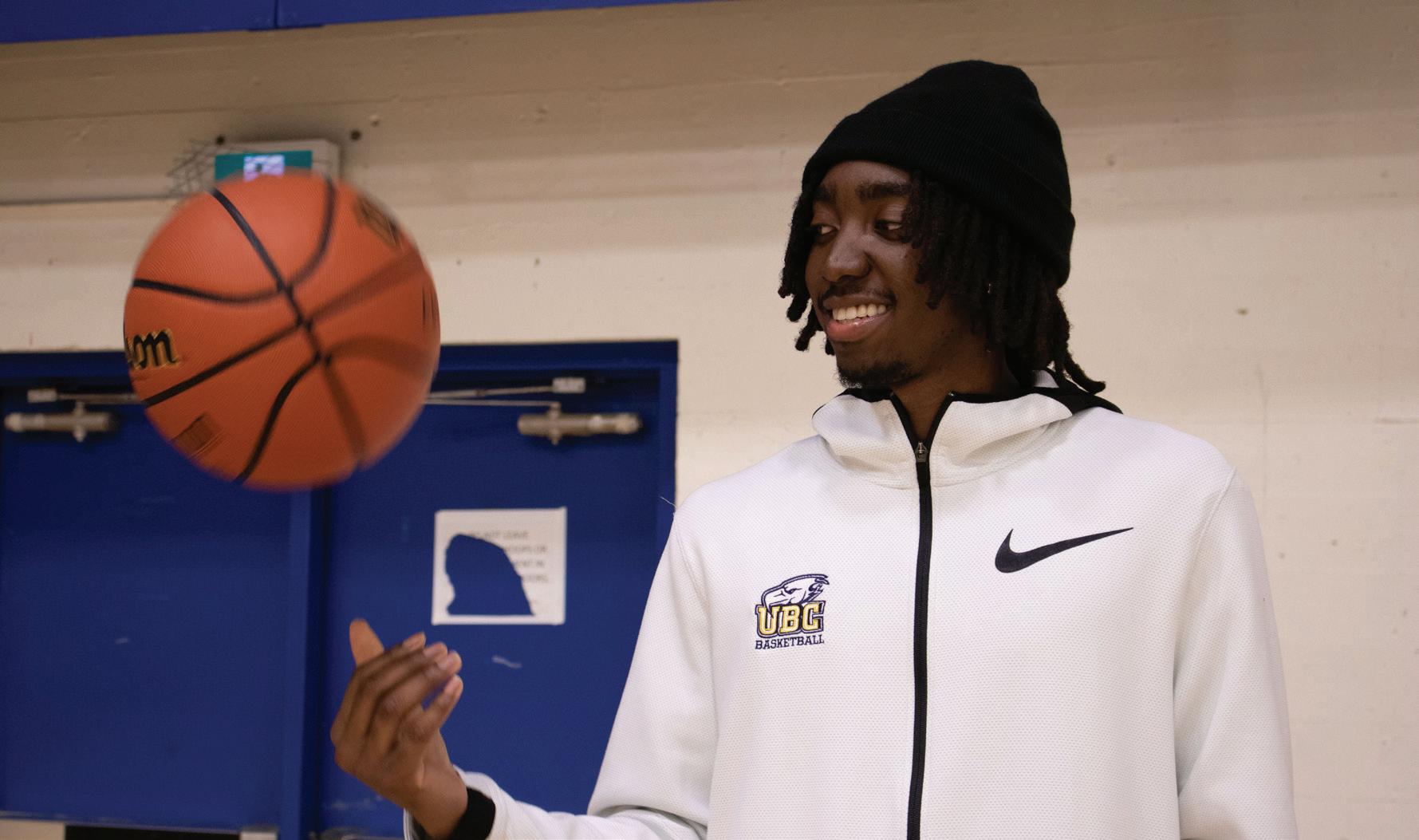
Compared to a year ago, Shittu feels he has come a long way.
Hanson took him on a tour and out for dinner during the visit. The next day was his first time playing with the team.
“It was really competitive,” Shittu said. “But it was good. It set a tone for where I want to be.”
He knew the team respected him and his talents from the get-go, making it the beginning of a smooth transition to the T-Birds.
Compared to a year ago, Shittu feels he has come a long way. This
was his first season really expanding his role in the wing; he grew up being a power forward.
After only getting serious in grade 11, with “no skill, really, just athleticism and height,” he said, he was put in the posts.
“I found myself wanting to shoot threes and dribble the ball,” he said. He has been working on these skills ever since he got serious about basketball and the wing position has allowed him to showcase them.
“I did surprise myself a little by how quickly I got comfortable here.” His performance this year shows it. He led the team in defensive rebounds and finished as the third highest scorer on the team. Shittu has one more year of eligibility, making him eager to finish his classes during this final season. What comes next is a little up in the air.
“I think I am going to try to play professionally, if I can.”
He said that with so many options on the table, like going overseas or joining the Canadian Elite Basketball League, basketball will be part of his life for a while. He can also see himself specializing in business technology management, being a bridge between successful companies and technology.
Outside of practice and school, Shittu is a sucker for extreme sports and an avid cook. He reminisced about a summer spent on his friend’s trampoline learning tricks. He said, if he wanted to, he could do a standing backflip right now.
Shittu really values nutrition, so he spends a lot of time meal prepping and experimenting in the kitchen. Recently, he has been learning more culinary techniques.
He is the chef of his six-bedroom Walter Gage apartment. “Whenever it smells good they are like ‘oh, must be Fareed again.’”
“I cook a lot of African dishes,” he said. Jollof rice, originally from West Africa, was a dish that came to his mind, as he described the ginger, grilled peppers and thyme that go into the vibrant orange dish.
Looking back at his journey, Shittu reflected on what his 10-year-old self would think of him now.
“I think he’d be really shocked to see how far I have come and where I am at,” he said. “I think something else would be ‘how did you get so tall?’” U
5-ON-5: THE UBYSSEY ’S YEAR-END THUNDERBIRD PERFORMANCE REVIEW
ANNALIESE GUMBOC SPORTS SENIOR STAFF
WHO WAS THE T-BIRD GOAT THIS YEAR?
Katalin Tolnai. The fourth-year forward broke so many records this season, including becoming the third Thunderbird ever to earn the U Sports women’s soccer Player of the Year award and propelling the T-Birds to their eighth national championship.
WHICH ATHLETE SHOULD START A TIKTOK ACCOUNT?
The entire UBC Quadball team. Give quadball more credit.
CALEB PETERSON SPORTS SENIOR STAFF
Football quarterback Garrett Rooker. After an injury last season, it was doubtful if he’d even see the field this year. Not only did Rooker play, but he led the Thunderbirds on a historic year, from the regular season to their national championship appearance. For all that, he is the clear pick for me.
I’m going to cheat on this question and nominate a whole team — either the men’s or women’s golf team. Golf doesn’t get nearly enough pop as a varsity sport.
IMAN JANMOHAMED VOLLEYBALL COLUMNIST
Women’s volleyball head coach Doug Reimer. His leadership brought the T-Birds to the Canada West final for the first time since 2018 and won back-to-back U Sports championships. He brings both kindness and fire to the coaching staff and won the CW women’s volleyball Coach of the Year award.
CW Libero of the Year Kacey Jost!
Whether it’s videos about drills or even a dance TikTok, Jost brings heart to the team (and would do the same as a TikToker).
LAUREN KASOWSKI SPORTS + REC EDITOR
Katie Newlove. The cross-country runner topped the indiviudal U Sports race and led the women’s team to their first U Sports banner. She’s also had success outside the ‘Birds, competing at Canadian and World Cross-Country Championships.
Adam Olsen. Stop mooching off BWALL and start your own.
SIYAH BASI HOCKEY COLUMNIST
Mackenzie Kordic from women’s hockey. Not only did she lead her team in points with 15 goals and 21 assists, but she was also the top points leader in the Canada West standings.
Women’s volleyball’s Kylee Glanville. She’s always interviewing her teammates on the team’s TikTok and her interview skills are top notch. So basically she needs to either join The Ubyssey or make her own TikTok.
WHAT TEAM DO YOU HAVE HIGH HOPES FOR NEXT YEAR?
Men’s tennis. In March, the Thunderbird Sports Club won the Western Canadian Championships for the second time in program history, clinching a spot in the national championships in August.
Men’s hockey. After winning Canada West for the first time in 53 years, the T-Birds had a quick exit from the national tournament. But with the team’s improvement this year, I think they’ll go even further at the national level next season.
Women’s rugby. After winning their fourth consecutive CW championship title, they are a dominant team that students should watch out for.
After U Sports bronze in 2023 and silver in 2022, I think next season will be the year that men’s soccer finally brings home the gold.
The women’s basketball team. After a 22–8 overall season, they unfortunately lost by 3 points in the Canada West quarter finals against the University of Victoria Vikes. I believe they have the ability to win the Canada West Championship.
WHAT SONG IS A MUST-HAVE ON THE PREGAME PLAYLIST?
MOST SURPRISING THUNDERBIRD MOMENT?
“Real Gone” from the Cars soundtrack. No explanation needed.
Football’s last-second touchdown in the CW title game. Down 27–21 with no time left on the clock, quarterback Garrett Rooker made a stunning 13-yard touchdown pass to Sam Davenport. A successful extra point bumped UBC’s score to 28–27 for their first Hardy Cup since 2015.
“Dreams and Nightmares” by Meek Mill. I can’t deny that beat switch — makes me want to run through a wall.
I’m going to show my football bias here, but the team making it all the way to the Vanier Cup was super special, even if they couldn’t take it all the way in the final game.
The T-Birds had a playoff run to remember.
“Get’cha Head in the Game” from the High School Musical soundtrack.
Women’s volleyball’s loss to the University of Manitoba Bisons for the CW final. It was a tough game, and it was disheartening to see it not go the T-Birds’ way. But the team redeemed themselves with a sweet back-to-back national championship.
“What’s Up Danger” by Blackway & Black Caviar has never failed to get me hyped.
Men’s swimming dropping from winning six-consecutive U Sports championships to placing fourth this year. I know that rosters change each year, but man (pun intended), I was not expecting that much of a drop from the fairly strong team.
“Party In the U.S.A.” by the icon herself Miley Cyrus. I don’t think I need to explain it any further.
When the men’s hockey team was eliminated from the University Cup National Championship in the first game. They had a historic season and won the CW Championship for the first time in 53 years, but came up short at nationals. However, I am excited for their redemption era next year.
EDITOR LAUREN KASOWSKI SPORTS+REC APRIL 9, 2024 TUESDAY 19 DO A BACKFLIP I DARE YOU //
ZOE WAGNER / THE UBYSSEY
Mapping birdsong in Vancouver
Alonso Daboub Contributor
As cherry blossoms begin to bloom, Vancouverites can watch the seasons change, but they can hear them change too. Each morning, waking goldfinches greet the day with a gabble of bright notes and wheezes. Chickadees call to each other in soft, two-parted whistles. Usually perched on bushes, song sparrows serenade the world with soft trills and tender tweets. All around the city, people are greeted by the natural sound of Vancouver’s 250 bird species. But these beautiful soundscapes are in danger.
As cities develop, sounds from traffic and construction threaten to drown out nature. Metro Vancouver, whose population is expected to surpass 2.5 million inhabitants later this year, is no exception. The chickadee next to my window will be a lot harder to hear with more cars roaring down the street. This change is not just aesthetic; loss of natural sounds poses real health risks to people living in the city.
A rise in human-generated noise has been shown to play a role in increasing heart disease, hearing loss, poor sleep and stress. The European Environmental Bureau recently identified noise pollution as “second only to air pollution as the environmental exposure most harmful to public health.”
At UBC’s CHANS lab, master’s student Clare Price is exploring how human-generated noise is impacting our ability to connect to nature. The work is rooted in acoustic ecology, the study of the ecological components of the soundscapes that constantly surround us.
Natural sounds are those like wind, animals and rustling trees. Competing for the same decibels are anthropogenic, or human generated, noises. These are things like traffic, construction and “anything that doesn’t spring up from the earth naturally,” Price said.
Her research surveys Vancouver residents by showing them recordings representing Vancouver soundscapes in the 1970s, early 2000s and modern day, asking them questions about how the recordings make them feel. Modern recordings have higher levels of anthropogenic noise which make bird songs harder to hear.
“I’m curious about how our awareness of bird songs transform our perceptions of space as being good or bad, natural or unnatural,” Price said.
The research hopes to map the accessibility of birdsong in Vancouver, finding places where city sounds may make it hard to connect to nature. By identifying what factors contribute to a loss of natural sounds, the research can support public policies aimed at conserving important links to
the natural world.
It also helps ensure that access to birdsong is open to everyone, not just those who can afford a home near the park.
“The story goes, as we might expect, that the wealthiest people in the wealthiest part of the town have the best parks with the most canopy cover with the least construction and disruption,” Price said. Mapping these recordings will let researchers see where unequal access to nature may exist.
Price’s research on natural soundscapes was inspired by the work of her advisor, UBC geography professor Karen Bakker. Bakker published a book titled The Sounds of Life in 2023, which explores how researchers study animal sounds outside of the human hearing range to give a voice to the natural conversations hidden around us.
Bakker, who was a leading researcher, teacher and mentor in water policy research, passed away in August 2023.
“[Bakker] made it her job to go out there,” said Price. “Do the interviews, find the stories, write about it in as compelling and accessible a way as possible so that people can read about it and then start to connect.”
Her research aims to continue Bakker’s work: connecting to the natural world by highlighting the stories around us that are often drowned out by the noise. U
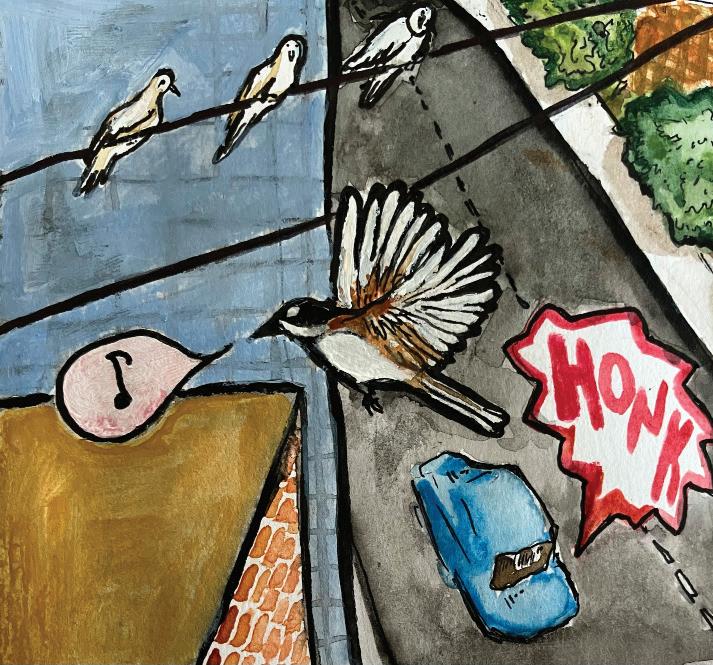
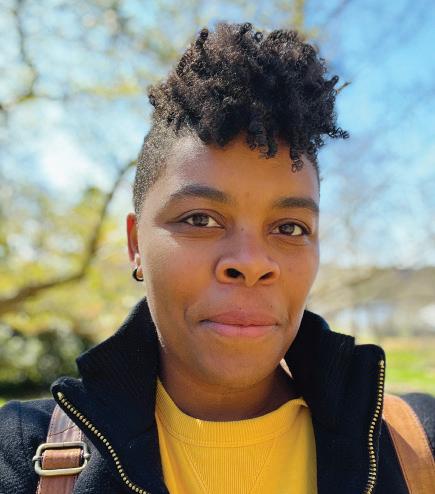
Moore Inclusive Conservation
diverges from traditional wetland science, and could inform management practices going forward.
Ecologist Dr. Alex Moore has researched habitats from salt marshes in New England to mangroves in American Samoa. Wherever they go though, they always get their feet wet — or at least, their research collaborators do.
Moore is an assistant professor in botany and forestry and leader of the Moore Inclusive Conservation Lab. While they don’t do much field work themselves anymore, their work looks to disrupt old assumptions about how wetlands function — and about whose knowledge matters in ecological research.
Wetlands worldwide are shrinking dramatically — but we need them more than ever.
Wetlands sequester tons of carbon in their soggy soils. According to the US National Ocean Service, a healthy wetland can store three to five times more carbon than an equal area of tropical forests.
After years of humans draining these habitats for agriculture and development projects, Moore’s lab is asking how they can be restored.
FROM BOTTOM-UP...
In their work on New England salt marshes, Moore examined how food web interactions between species could impact coastal wetlands.
“Early coastal wetland research … indicated that the physical features [were] far more important in terms of regulating the health of the coastal system,” they said.
This is called “bottom-up” control, where plant-soil interactions and physical factors regulate the ecosystem. For a long time, nobody questioned it.
Moore studied the opposite — “top-down” effects where predators have strong impacts on the ecosystem.
“[A] combination of the two is pretty common,” Moore said. “So it does really depend on the context and that will vary from place to place.” This combination approach
...TO TOP-DOWN.
Just as wetlands vary from place to place, so do the people that live with them. For Moore, those communities are a crucial piece in how they conduct research.
This is also a break from tradition.
“Local communities and folks who have been on the land for much longer than we have been researching on the land have a lot of important knowledge but also have a right to be engaged in the [research] process,” Moore said.
Many environmental movements were established to protect natural environments from human interference, such as national parks. These don’t acknowledge and often displace the people that live with and manage their environments.
Some scholars have described conventional conservation methods as another kind of “top-down” approach — governing bodies make the decisions regarding a habitat’s management and local communities must adapt accordingly.
Moore questions common conservation practices just as they do bottom-up and top-down ecology.
“I don’t think that folks engaged in the research are volunteers, I think that they are collaborators in the work, which means that they take equal part in the direction that things go,” they said.
One of the ways Moore does this is by asking communities what research would be valuable to them and asking community members how they would like to be compensated for their contributions.
“Doing good conservation work requires that you build solid relationships with community organizations, and community partners, and those kinds of things can take some time,” Moore said.
“Invest in building those connections, and those relationships will go a long way.” U
EDITOR TOVA GASTER SCIENCE APRIL 9, 2024 TUESDAY 20 MELODIES IN METROPOLIS//
Clare Price’s research maps the accessibility of birdsong in Vancouver.
TOVA GASTER / THE UBYSSEY
Sidney Shaw Senior Staff Writer
RESEARCHER PROFILE //
COURTESY ALEX MOORE
Dr. Alex Moore is an assistant professor in botany and forestry.
Things to worry about instead of finals
Elita Menezes Senior Staff Writer
Astrologically speaking, the end of the school year is almost here. You just have to hand in those last papers, complete that endof-term midterm and pretend to be conscious in your last class so you can get that sweet, sweet participation mark.
A well-deserved break is just around the corner if you can push through, but alas — there is another hurdle to jump, a big one.
Finals.
There’s a lot riding on those horrid little exams — whether you have a future depends on how well you can do on one test at 8 a.m. on a Saturday. It’s a stressful time. That’s why I’ve come up with a way to help students like you remedy this specific stress.
Here’s a list of things you can do to take your mind off finals — by putting it on something worse instead.
1. REMEMBER YOU HAVE NO MONEY
Put it this way: regardless of whether you totally flunk or get the highest grade in the class, you’re still going to go back to your room and eat microwavable mac ‘n cheese or something instant, just like you’ve been doing for the past semester. University costs way too much for any other outcome — unless you’re eating Barilla with jarred sauce, in which case why even go to school, nepo baby?
No miraculous final exam grade is going to pull you out of

financial woe, so spend your time worrying about what percentage of your body is neon orange “pasta.”
2. GIVE A RANDOM STRANGER AN INSULT ON THE STREET
They’ll stop walking for a second, confused and disheartened. Maybe they were having a horrible day and your comment made them feel even worse. Or maybe they were having a phenomenal day and you just soggied their metaphorical pizza. You’re going to feel so bad about
it for so long, you’re not even going to think about the fact that 4 of your exams are within 48 hours of each other. I’m a genius.
3. I BET YOU DID SOMETHING IN MIDDLE SCHOOL
What did you post on Tumblr?
What’s in your Wattpad library?
Did you openly ship founding fathers with each other after listening to Hamilton ? Pick-me era? There’s gotta be something from that period to keep you up at night instead of MATH 420 or whatever you’re taking.
4. THINK ABOUT YOUR FUTURE
Imagine a future where you have a good job, a nice place to live and a circle of people that care about you. Now, take that timeline and punch it in the face. Imagine you’re a telemarketer, the fifth-worst job according to Indeed. Or imagine you spent thousands of dollars on a degree just to stand behind a 7-Eleven cash register and get made fun of by a ten-year-old who says your “glizzy isn’t skibidi,” whatever that means. Just remember that these futures are always possible, whether you pass or fail.
5. LOOK AT THE NEWS
Those fuckers on page three are always up to something. Finals are difficult to deal with, but so is pretty much everything else. It’s all about finding that balance between worry, and a different kind of worry.
So take those exams in stride, and remember that life is constantly trying to kill you. But through all of it, you still persevere. Now go stress yourself out about things that don’t matter because I said so. U

EDITOR JOCELYN BAKER HUMOUR APRIL 9, 2024 TUESDAY 21
ONLY WORRY
LORD,
HOARD AND OBTAINING
GOURD //
I
ABOUT THREE THINGS: THE
MY
A LARGE
Whether you have a future depends on how well you can do on one test at 8 a.m. on a Saturday. JASMINE FOONG / THE UBYSSEY
ACROSS 1 “Welcome” site 4 Queen Bey sister 8 UBC student org. 11 Star Trek but not Star Wars 13 “Idiot sandwich” chef 15 More recent 16 Label for Elvis, Justin Timberlake and SZA 19 Nabisco wafer brand 20 Something to serve 21 Intend to 23 Man I Love Fishing! 24 Some printers 25 Start of a Willy Wonka song 26 Campus known for soaking 27 “A mouse!” 29 ___ humbug 32 Under the weather 33 Alternative to PST and GST 36 This one goes from Jan. 8–Apr. 12 38 Bible Discussion Study Meeting! 39 “Well, well, well” 40 How the British do it 42 Former Panic! at the Disco frontman 43 Letter before upsilon 44 One in Berlin 45 More aloof 46 Brain area responsible for exec. function 47 Some X-rated materials 49 DVD precursor 50 Light-headed sorts? 52 Layer 53 Remote Batts 54 Don’t just sit there 55 CRISPR target 57 They love a summit, sometimes in NYC, sometimes in Geneva 58 Month-long challenge of sexual abstinence (abbr.) 60 Cup holder? 61 Crew tool 62 Tip amt. 63 Textual affirmation 64 Go criss-cross applesauce, say 65 Tongue-in-cheek 66 Alias letters 67 Insect that can carry 20 times its own weight 68 Playful euphemism for copulation 69 Goddess of night DOWN 1 A big eat? 2 Thoroughly enjoyed 3 Comox, Gibson and Osoyoos, e.g. 4 ___ Mix-A-Lot 5 Netflix Sci-Fi series cancelled after two seasons 6 Congrats to a gamer 7 Forever and a day 8 “It’s lit”, “Straight up” or “”D-R-R-R-R-RRAH!”, e.g. 9 She’s at the rave 10 Chaotic mess 12 Teacher’s favourite 14 Word before shot or job 16 Pooh’s friend 17 Result of 34-Down 18 Mountain pictured on a chocolate bar 21 Stir-fry vessel 22 Dance move famously “hit” by Squidward 27 Eighth Grade actress Fisher 28 Wabbit hunter 30 They can be dumb, smart or bad 31 Pronoun pairing 32 Actor Elba 33 Vegetable that kids pass on? 34 Stroke it! 35 Sport action worth six points 37 “Put your big boy pants on!” 38 Campus building with four blocks 41 “We’re up all night to ___” 45 Donald’s daughter 48 Linguistic level between semantics and morphology 50 Seasonal fast food pork sandwich 51 Sarcastic comments 54 Muscles below pecs 56 Suffix with mission 59 Newspaper that publishes way more crosswords than The Ubyssey 62 Go for gold?
NAOMI NG / THE UBYSSEY
CROSSWORD
In Photos: Cherry blossom season

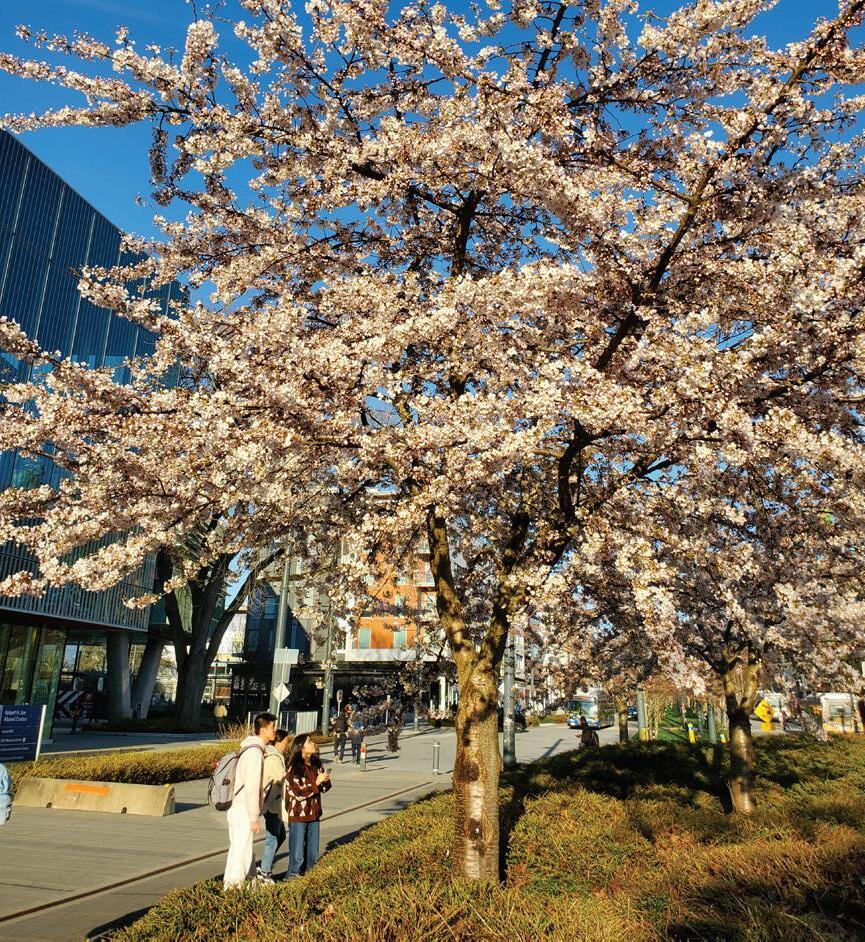
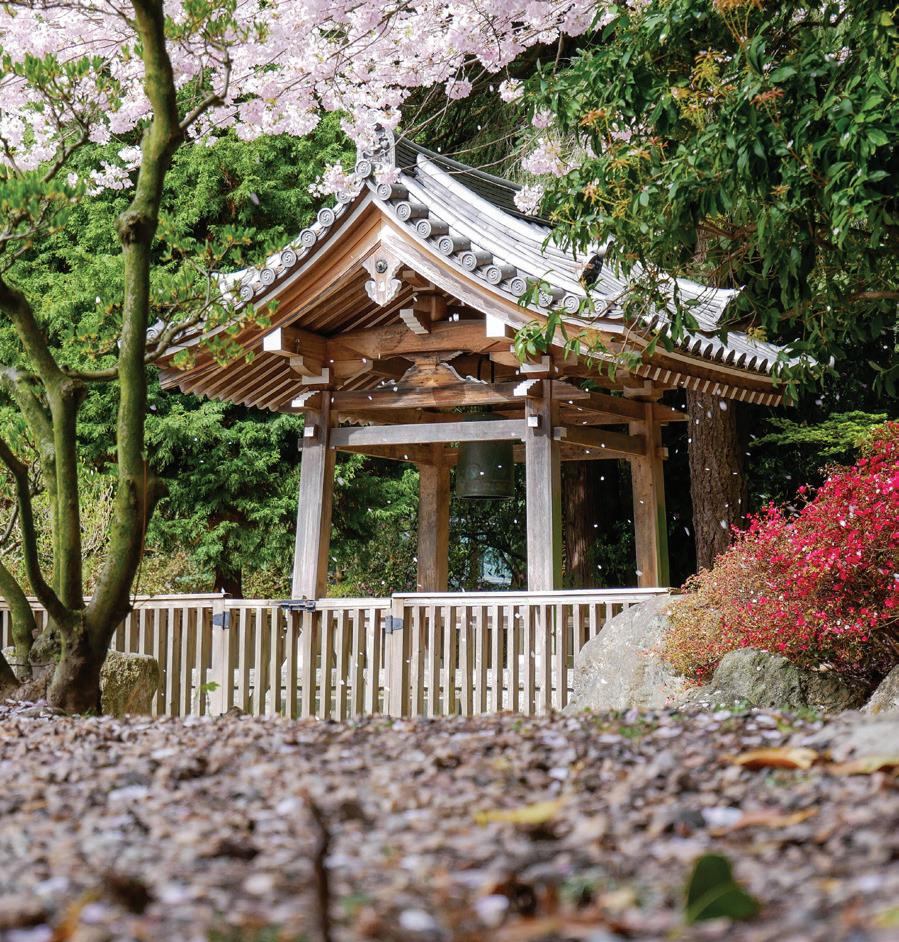
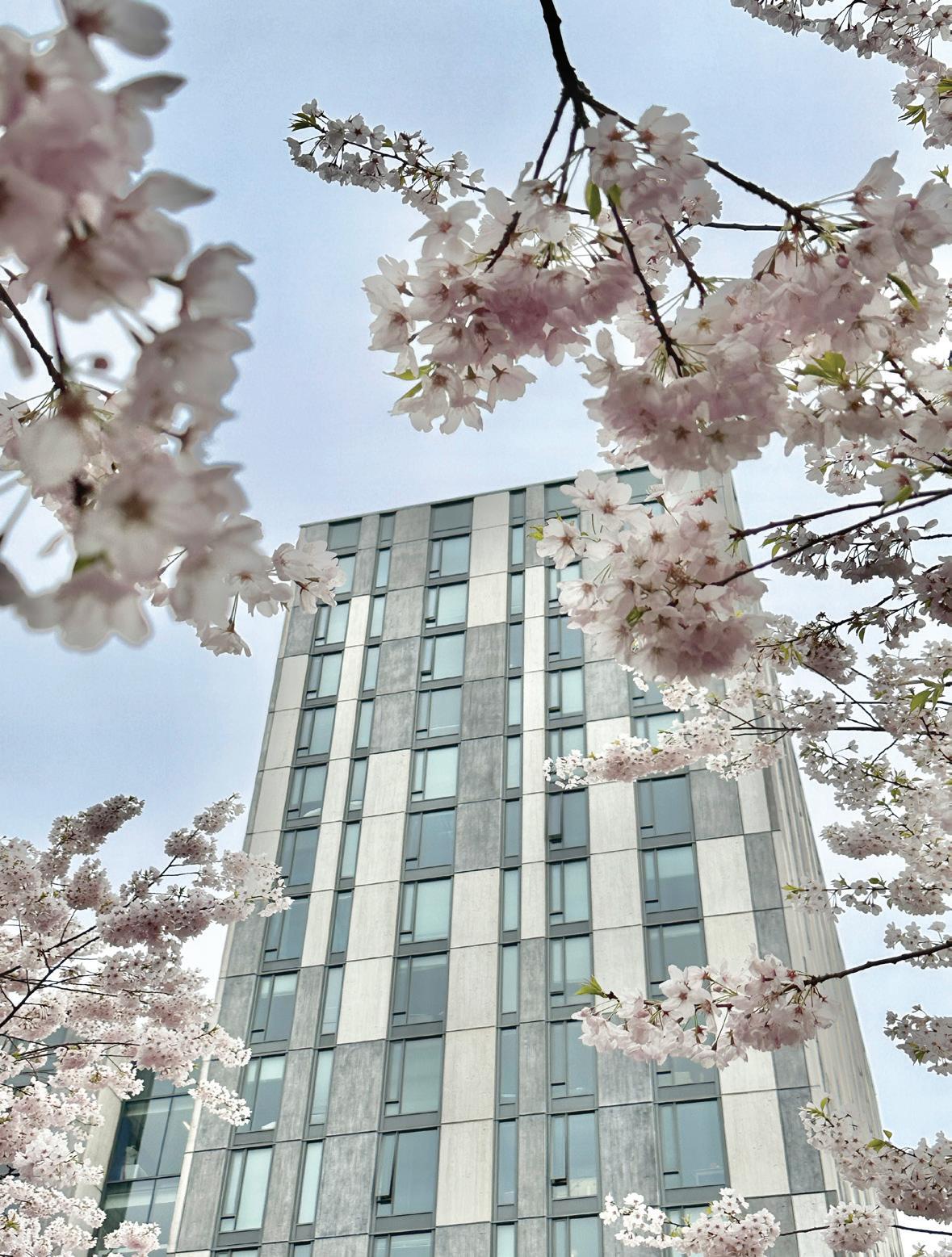
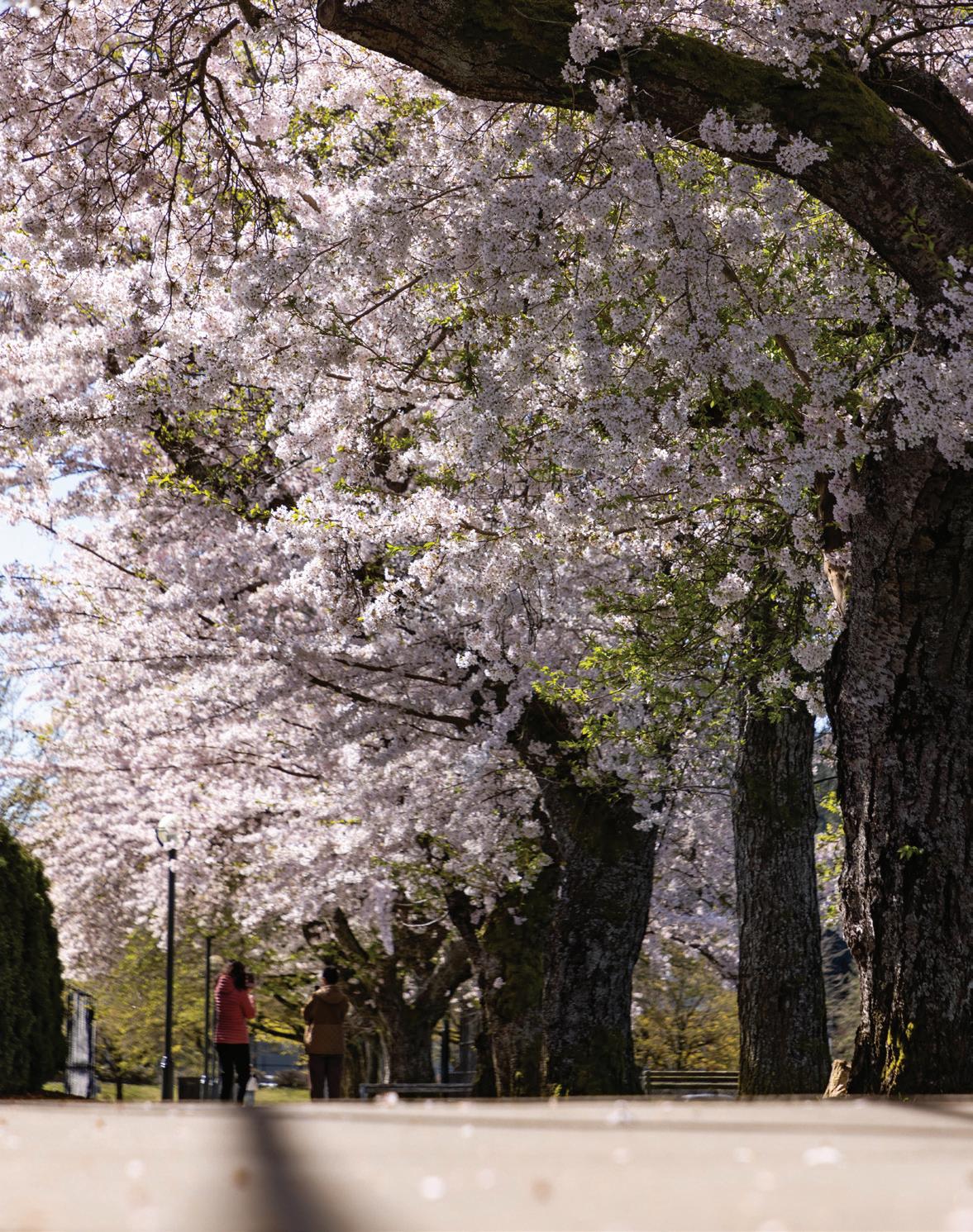
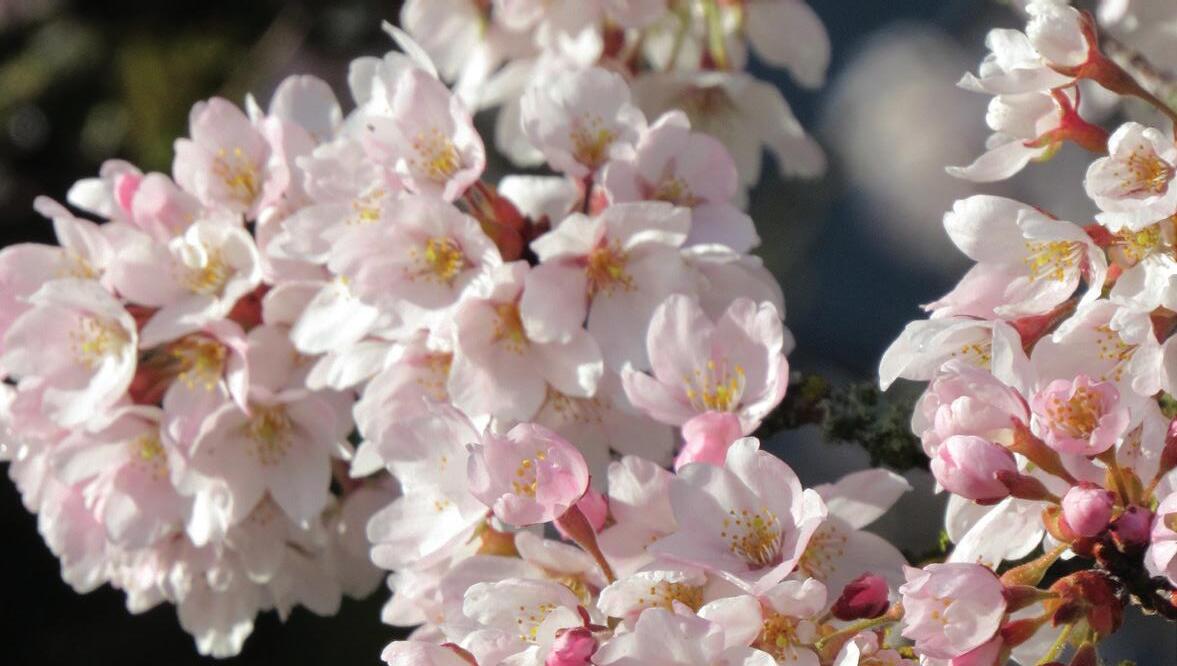
EDITOR ISA S. YOU PHOTOS APRIL 9. 2024 TUESDAY 22 SO PRETTY IT’S HURTING MY FEELINGS //
ZOE WAGNER / THE UBYSSEY ISA S. YOU / THE UBYSSEY JERRY WONG / THE UBYSSEY MAYA ROCHON / THE UBYSSEY NATALIE CHOO / THE UBYSSEY JERRY WU / THE UBYSSEY 19+ EVENT APRIL 12, 2024 AMS NEST PLAZA ISA S. YOU / THE UBYSSEY ADVERTISEMENT

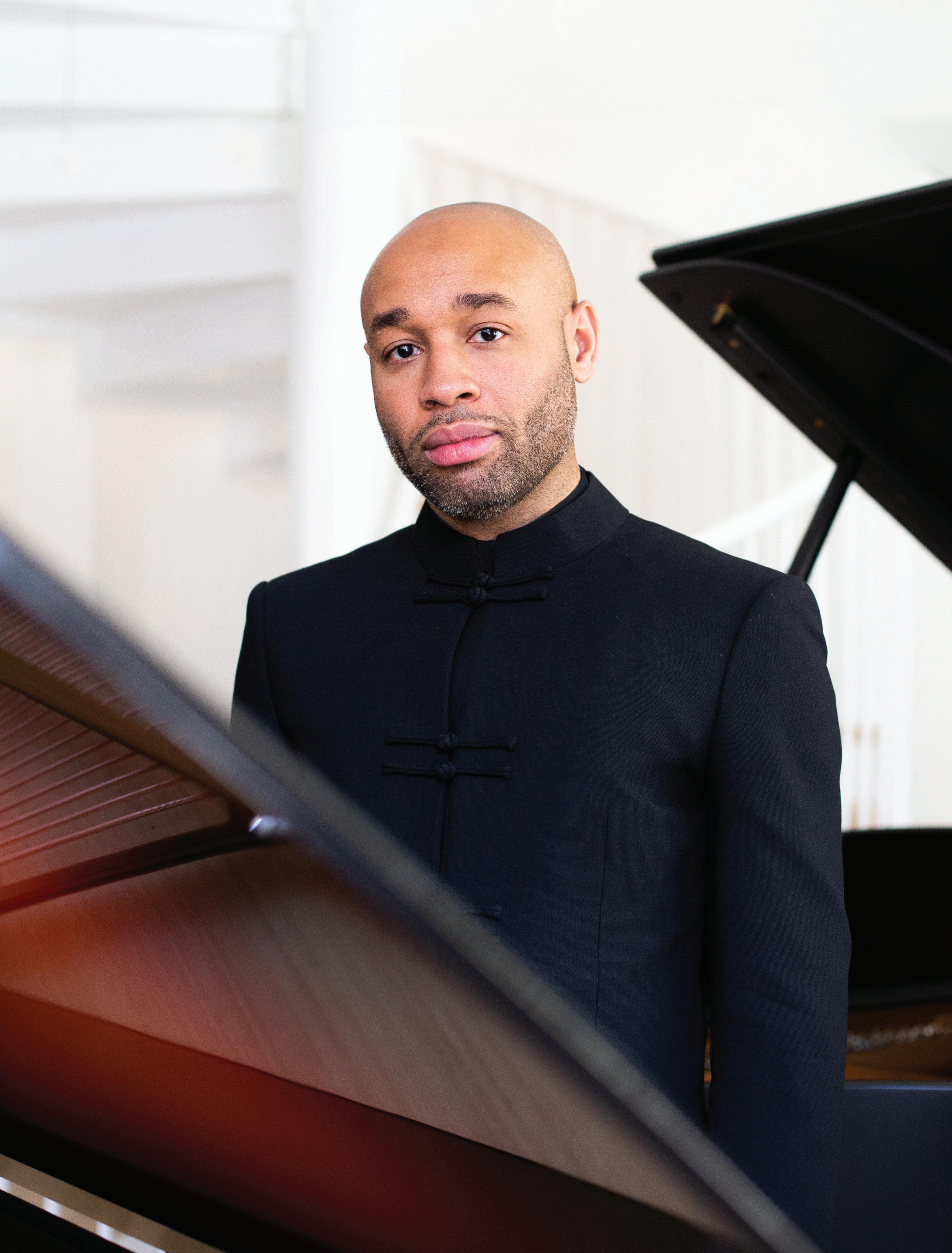
Student tickets just $16
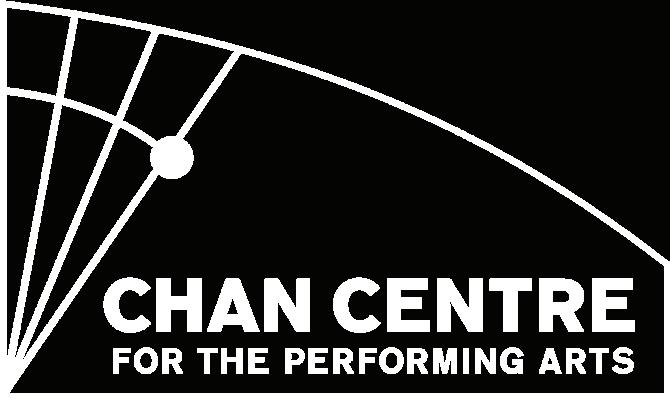



ADVERTISEMENT

ADVERTISEMENT
















 Renée Rochefort News Editor
Renée Rochefort News Editor



































































































